






Friday March 8th 2024








Friday March 8th 2024
IN A RECENT court appearance at Swansea Crown Court, Gary Hicks, a 63-year-old resident of Oregon Way, Luton, has firmly denied allegations of historical sexual offences dating back to the 1980s.
The charges levelled against Hicks involve serious accusations of sexual misconduct against two children in the Milford Haven area during the period between 1985 and 1989.
Hicks faces a total of five charges, with two counts of unlawful sexual intercourse alleged to have occurred between 1987 and 1989.
These particular charges concern a girl who was between nine and 11 years old at the time of the offences.
Additionally, Hicks is accused of inciting the same girl to commit acts of gross indecency on no fewer than 20 occasions over a span of two and a half years.
The charges do not end there; Hicks is also confronted with two counts of indecent assault.
The first of these alleges that he assaulted
 Tom Sinclair Editor@herald.email
Tom Sinclair Editor@herald.email
the aforementioned girl on at least five separate occasions. The second charge involves a boy under the age of 16,
with Hicks accused of assaulting him on at least ten occasions between 1985 and 1989.
In his defence, Hicks has entered a plea of not guilty to all the charges presented against him.
In light of his plea, Judge Huw Rees has scheduled a trial for July 29. Until then, Hicks has been readmitted to unconditional bail, awaiting the opportunity to contest the accusations in court.
Dyfed-Powys Police is investigating the circumstances surrounding the sudden death of a 15-year-old boy at a location near Lampeter on Friday afternoon (March 1), the force has confirmed.
The family is being supported by specialist officers.
The death is not being
treated as suspicious and a report will be prepared for H.M. Coroner.
The police issued a statement saying: “We are aware of concern in the community, however as an investigation is ongoing we would ask that support is given to the family by not speculating on the circumstances surrounding the death.”

A 67-YEAR-OLD man has pleaded guilty to attempting to engage with a child for his personal sexual gratification in Pembroke town centre.
Richard Read appeared before Haverfordwest magistrates on Tuesday morning where he pleaded guilty to attempting to engage in sexual communication with the child between February 8 and February 11, 2022.
Read admitted three additional sexual offences of possessing extreme pornographic images which portrayed an act of sexual intercourse with a dead or an alive animal; making two indecent Category A photographs of a child and making
four indecent category B images of a child. Each offence took place in Pembroke between January 31 and March 1, 2022.
“These are extremely serious charges which are being brought before the court,” Crown Prosecutor Abigail Jackson told Haverfordwest magistrates.
“As a result I ask you to commit all four charges to the Crown Court for sentence.”
Magistrates declined jurisdiction in the case and the matter will now proceed at Swansea Crown Court on March 26.
Read, who resides in New Walls, Bristol, was released on unconditional bail to await his sentence.
A HOMELESS man has been jailed after attacking two police officers in Tenby.
Mark Ion, 52, appeared at Haverfordwest Magistrates’ Court charged with two offences of common assault of an emergency
worker.
Ion was accused of assaulting the two officers in Tenby on February 20..
He pleaded guilty to both charges and was jailed for 14 weeks.
Ion must also pay £85 in costs.



MARY KEIR, recorded as Wales’s oldest person has celebrated her 112th birthday at Awel Tywi Residential Home in Llandeilo, Carmarthenshire where she has lived for the last 12 years.
Surrounded by friends and family, Mary celebrated with a lunch of roast dinner followed by sherry trifle and then a buffet in the evening.
Pupils from Ysgol Ffairfach also visited to celebrate with Mary as well as Dinefwr Male Voice Choir who entertained Mary and all the residents at Awel Tywi with an array of songs.
Mary is still actively involved in life at Awel Tywi, taking part in activities, entertainment and meetings as well as helping other residents. She also remains a keen lover of music, in particular the piano which has been a lifelong passion.
A former ward sister and district nurse who lived in Llansteffan independently just before her 100th birthday, Mary then became a resident at Carmarthenshire County Council’s Awel Tywi Residential Home.
 Tom Sinclair Editor@herald.email
Tom Sinclair Editor@herald.email
Cllr Jane Tremlett, Cabinet Member for Health and Social Services said: “Happy 112th Birthday wishes to Mary. My thanks also
to our fantastic team of carers at Awel Tywi for delivering excellent care to Mary as well as all of the home’s residents”.
Her son Robert Keir and daughter-in law Sian Keir celebrated her birthday with her and
said: “Mary, our mother and mother-in-law still has a great will and determination. She has received fantastic care at Awel Tywi and we really appreciate everything that the amazing staff do for her every day”.
A THAI woman accused of murdering her seven-year-old son has appeared in court again this week.
Papaipit Linse, 42, has been charged with the murder of Louis Linse who was found dead at a house in Haverfordwest.
Linse appeared at Swansea Crown Court on Tuesday via videolink and spoke only to confirm her name.
She was not asked
to enter a plea and Judge Paul Thomas KC adjourned the case until the next hearing on June 17.
The police said they were called to an address in Upper Market Street, Haverfordwest shortly before 10.45am on January 10.
It was confirmed, sadly, that a seven-yearold child was confirmed to have died a short time later.


SWANSEA CROWN
COURT heard this week that a Pembrokeshire couple were dealing large amounts of cannabis and cocaine. It was said in court that they were out in their car doing their illegal activities, even as their ten-year-old child slept home alone.
Rhian Warlow and Daniel Davies were exposed by their extravagant purchases, paid for with proceeds from the sale of the drugs.
Among the luxury items acquired were Rolex and Royal Oak timepieces, diamondstudded jewellery, and a BMW key ring embellished with a diamond.
The couple were intercepted by police while driving on the A477 towards Milford Haven on the afternoon of December 29, last year. This followed intelligence suggesting their vehicle’s association with drug dealing.
Upon being stopped,
Tom Sinclair Editor@herald.emailWarlow and Davies claimed to have been patronising B&Q in Carmarthen. However, a thorough search of their vehicle unveiled a concealed 493 gram block of cocaine in the boot’s panel, valued at approximately £61,000.
Subsequent to their arrest at the site, Warlow disclosed that her daughter was left unattended at home.
Police, attending her residence, discovered her 10-year-old daughter asleep amidst a noticeable odour of cannabis.
Further investigation revealed four bags of cannabis weighing a total of 921 grams, worth in excess of £10,000, alongside scattered cash amounting to £1,255 in a cardboard box, £679 in loose notes and change, and £260 in notes within the bedroom.
The prosecution detailed Warlow’s indulgence in various luxury goods funded


by their illicit activities. Analysis of Davies’ mobile phone messages exposed his frequent drug dealings, often in ounces and sometimes in kilograms, with Warlow implicated as both his driver and financial beneficiary. Notably, she too was involved in orchestrating transactions independently.
Davies, previously convicted twice for six offences, the latest in 2007, and Warlow, with a single conviction in 2009, expressed remorse through their legal representatives.
Davies, 35, from Hawthorn Path, Milford Haven, lamented involving Warlow, acknowledging the detrimental effect on her familial relationships.
Warlow, 31, from Gelliswick Road, Hakin, exhibited regret, particularly for the repercussions on her bond with her children, attributing her actions to naivety.
Both pleaded guilty to charges of possessing with intent to supply and concerning themselves in the supply of both cocaine and cannabis.
Recorder Barry
Clarke sentenced Davies to three years of imprisonment, while Warlow received a two-year suspended
sentence, mandating 200 hours of unpaid work and 30 days of rehabilitation activities. The prosecution
A oes gan eich busnes weledigaeth werdd?
Does
announced plans
pursue the confiscation of their criminal profits under the Proceeds of Crime Act.

Hoffech chi gael cymorthgydag arbedion effeithlonrwydd a lleihau eich allyriadau carbon busnes?
Gyda phecynnau adnoddau ac astudiaethau achos ar gael, dysgwch sut allwch gymryd camau cadarnhaol i ysgogi newid o fewn eich busnes.
03000 6 03000 busnescymru.llyw.cymru businesswales.gov.wales
Would you like support with efficiency savings and reducing your carbon emissions?
With resource packs and case studies available, explore how you can take positive steps to implement change within your own business.
NEW community gardens are springing up across the county. One organisation behind this change tells the tale
Grwp resilience is the group i started after the first lockdown, to keep the spirit of community that re-awoke at this moment. We were going to need it to deal with other crises coming down the line.
We held some giant meetings in those late lock down days, online, in three counties. They came to similar conclusions: the general thrust was for a change of direction, to eat local, love nature, care for each other and value what matters, not the superficial rubbish. How to get there? Suggestions poured in from the 100’s at these meetings. They

were varied, creative and being based on personal knowledge, practical. One was for more community gardens.
Oh good, something easy for our new organisation to cut its teeth on, we naively thought. I won’t disclose the battles of that first year. We came through, the political landscape altered with a bit of spade work, and now there are community gardens springing up in many places. Each has a unique story. This week it’s havergardd’s.
‘Havergardd was the polluted ground of a gas storage site covered in gravel. Now it’s a garden of activity, a little island of peace’
Haverfordwest, the capital of pembrokeshire
has struggled to find its crown. This year there is major spending on the castle to give it a royal role in the town’s vitality, instead of a ruinous one. Havergardd community garden follows the trend haverhub started in grass roots revitalisation. Topdown and bottom-up revitalisation together.
Havergardd was a quarter acre of gravel covering the polluted ground of a gas storage site on the way to fortune’s frolic. It belongs to wales and west utilities. Its great quality? It’s a few minutes’ walk from the skate park, bus station, county hall and the river. So near freemans way but all you can hear is birds and the odd train, as it has wooded banks on either side. A little island
of peace. Two years ago some town councillors had a vision and a talent for funding. They equipped the site with £60,000 from the lottery and the town council got the lease. But no growers came and only weeds grew until they handed the site to grwp resilience last december and growers descended like hungry seagulls. (Not the jonathan variety).
They are discovering talents they didn’t know they had, the beds are all clear of weeds and buds are shooting already. Every friday people garden together. Tir coed led an activity day for families in half term, and a beginners gardening course is starting this month with one day taster courses. Vc gallery has attracted
a great variety of people who did not know they loved gardening til now. For some it’s the only day they get out of the house. Polina, a young canadian, new to the town, works with grwp resilience and coordinates havergardd. She arranges meetings where the growers discuss and make the decisions
such as the allocation of the beds. It looks like demand will exceed supply so the hunt for more land will resume.
We hope to continue the joyous feel of a garden of activity in the heart of the heart of pembrokeshire, helping it beat healthily again.
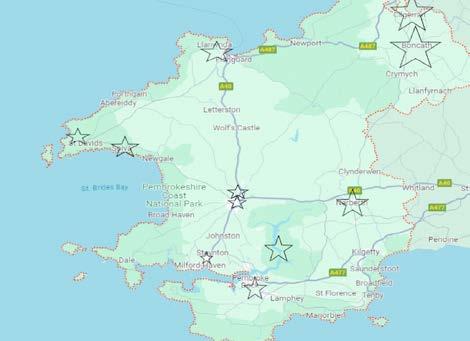
Protestors were at County Hall this morning protesting against the smells coming from the Withyhedge Landfill site outside Haverfordwest.
Pembrokeshire County Council has confirmed receiving public complaints about the landfill odours. During a joint visit with NRW officers, they reiterated their role in monitoring odour escape under the Environmental Protection Act 1990, despite NRW being the primary regulator.
The site operator has reportedly initiated a management plan to mitigate the issue. However, for many residents, these measures are too little, too late. They continue to urge affected individuals to sign a petition and report issues to NRW.
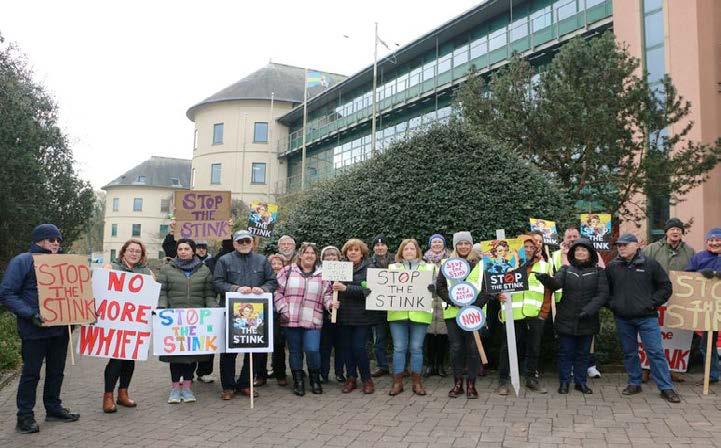
Pembrokeshire County Council said in a statement recently:
“We can confirm that we have recently received complaints from members of the public relating to odours originating from the Withyhedge Landfill site.
Officers from the
Council’s Planning and Public Protection Services have visited the facility this week alongside officers from Natural Resources Wales (NRW).
The site holds a permit issued by NRW and members of the public are encouraged
to report any issues with odour to them; but we can confirm that officers from our Public Protection Service will be actively supporting staff in NRW by continuing to monitor odour escape from the site in nearby residential areas.
A CALL for Pembrokeshire County Council to change its banking arrangement with Barclays, after the bank announced it was closing its branch in the county town, is to be heard later this week.
Barclays Bank in Haverfordwest, located on the town’s High Street, is to close on May 10 this year.
Councillor Huw Murphy, in his notice of motion to the full council meeting of March 7, says: “Barclays Bank recently announced that they are closing their last remaining branch in Pembrokeshire in 2024 (Haverfordwest) in what they claim is an effort at ‘rightsizing’ their headcount.
“Therefore, this Notice of Motion is a request that Pembrokeshire County Council review its banking arrangements with Barclays and look towards a new banking arrangement with a bank that still retains a physical footprint and therefore a commitment

to the county of Pembrokeshire.
“The loss of many banking facilities within Pembrokeshire over recent years has had a detrimental impact on many town centres such as Tenby, St Davids, Fishguard, Milford Haven, Narberth, Newport and Pembroke and Pembroke Dock and will soon impact Haverfordwest with the loss of Barclays bank to the town.
“The loss of these
banks not only impacts upon town centres and businesses but also disproportionately impacts the elderly who are less likely to embrace online banking options and also results in the loss of well-paid and secure employment in a county that can ill afford to lose such jobs and career opportunities for our young who may wish to enter a career in the banking/finance industry without having to re-locate out of Pembrokeshire.”
After the closure was announced, a
Child maintenance wasn’t paid A ST CLEARS father has appeared before magistrates after ‘wilfully refusing’ to pay over £4,500 in child maintenance payments.
The 29-year-old, who cannot be named for legal reasons, was ordered to pay a total of £5,957.32 by a child maintenance order imposed by Cardiff Magistrates court, with payment scheduled to be completed by February 20, 2021.
But this week Haverfordwest magistrates heard that payments amounting to just £1,379.76 were made by the defendant.
“£4,577.56 is still outstanding and the defendant has demonstrated a willful neglect in his refusal in paying,” commented a spokesperson for the Child Support Agency.
“He was told that the matter would go to court if his repayments weren’t addressed, but he failed to respond to the caution, and no information for this was provided.”
The Child Support Agency went on to state
that analysis of the defendant’s personal accounts confirmed that between May and November 2022, a total of £11,917.15 was held in one account while an additional £8,178.33 was in another.
“A final warning was sent to him about our intention to go to court, but again he did not respond,” added the CSA spokesperson.
As a result of his non-payment, the defendant was this week sentenced to six weeks in prison. The custodial sentence was postponed on condition he pays £20 a week towards the child maintenance order repayments.
“There has been wilful refusal and culpable neglect, with the result that only committal to prison is appropriate,” commented the presiding magistrates, Mary Smith.
But Ms Smith postponed his custodial sentence on condition that he makes weekly payments of £20 together with £41 costs to the CSA.
spokesperson for the bank said that the Haverfordwest branch only had 32 regular customers who used the branch exclusively for their banking and do not interact with Barclays in any other way.
They added that less than 10 per cent of transactions now take place inside a branch. More than 90 percent of transactions are completed digitally, there are nearly four billion app logins a year and Barclays digital customers now stand at 10.9 million.

A GROUP of parents from North Pembrokeshire, have taken it upon themselves to provide aid to families in Gaza, offering a beacon of hope amidst the ongoing crisis.
The community initiative, known as “Cwtch Pals,” aims to secure safe havens for families, particularly those with young children who have been caught in the relentless conflict that has stripped them of their homes, food security, and safety.
The grassroots effort is driven by a deep empathy towards the children in Gaza, with one parent reflecting, “We see our children’s faces in theirs.” The group’s motivation is rooted in a historical consciousness, drawing parallels to the Kindertransport efforts during the Holocaust, where Jewish children were saved by individuals in a similar act of humanitarianism. “It’s the least we can do,”

temporary refuge in Egypt, with some members still unable to leave Gaza due to their indispensable roles in the community, such as a doctor who remains to attend to the urgent medical needs despite his family’s worries for his safety.
said a mother, whose father was a Holocaust survivor, emphasising the significance of passing on the legacy of kindness and rescue.
The connection between the Welsh group
and the families in Gaza is deeply personal, with relationships built over years through platforms like Amnesty International and direct educational engagement. Lara, a member of the initiative, shared her touching story of teaching one of the now-adult children
in Gaza, who has since become a wounded reporter. The group is currently focusing on raising £7,000 to complete the evacuation of this family, among others, to safety.
Families that have already received assistance are finding
Cwtch Pals has its origins in Croeso Teifi, a charity response to the Syrian crisis, and benefits from the Community Sponsorship scheme in the UK, a testament to the effective integration of refugees through community-managed schemes. This initiative not only supports the immediate needs of the displaced but also ensures their long-term integration by providing access to education and employment opportunities in Wales.
Despite the dire situation and the UK government’s hesitance to open its arms to Palestinians, the group remains steadfast in its commitment to fill this
gap through local action. The initiative is a poignant reminder of the universal values of democracy and humanity, as echoed by a grateful mother in Gaza, who, despite her circumstances, recognises and appreciates the efforts of the Welsh parents. Her words underscore the impact of the initiative, promising to share their stories of kindness and determination with future generations.
The group’s actions are a powerful example of how community solidarity can transcend borders, offering a glimmer of hope and a path to recovery for those in dire need.
For those looking to support or join the effort, Cwtch Pals can be contacted through Facebook or their dedicated email, emphasising the collective power of small communities to make a significant difference in the lives of others across the globe.

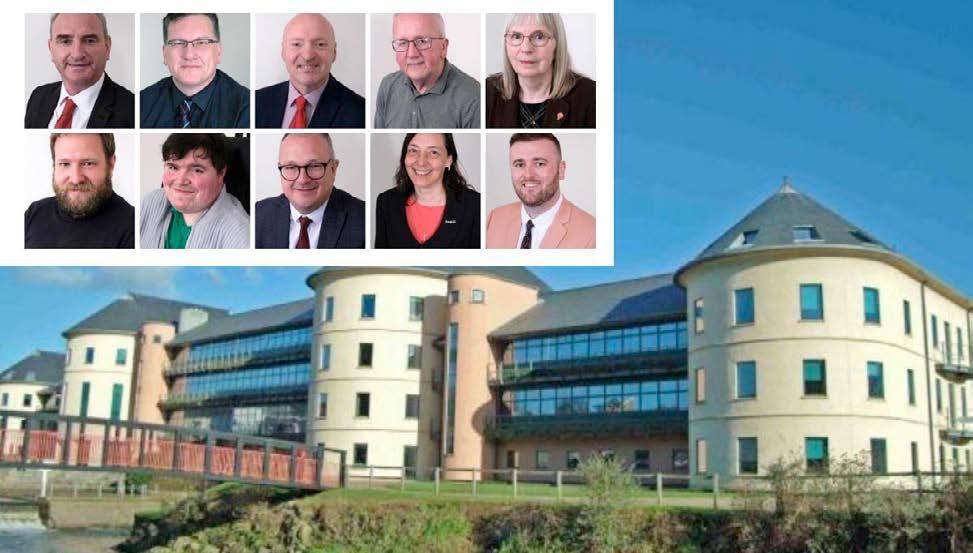
A CALL for an antiracism commitment at Pembrokeshire County Council will be heard later this week.
A notice of motion signed by all 10 members of the county council’s Labour group, says:
“The publication of the Anti-Racist Wales Action Plan, aims to make Wales an Anti-Racist Nation with the purpose to collectively make a significant change to the lives of Black, Asian and Minority Ethnic people.”
It asks that: “Pembrokeshire County Council recognises the importance of fostering an inclusive and antiracist community that values diversity and promotes equality.
“Recent events have highlighted the need for proactive measures to address racism and ensure that our community remains a welcoming and safe
space for all residents.
“As such the Labour Group on Pembrokeshire County Council wishes to put forward the following: Notice of Motion: AntiRacist Pembrokeshire County Council Action Plan.
“Pembrokeshire County Council reaffirms its commitment to promoting anti-racism and fostering an inclusive environment within Pembrokeshire and Wales.
“The council will actively work to eliminate racial discrimination and prejudice, both within its own operations and in the wider community.
“Pembrokeshire County Council will collaborate with local organisations, community leaders, and residents to develop and implement anti-racist initiatives and
programmes.
“Pembrokeshire County Council will review and strengthen existing policies to ensure they are inclusive and address any systemic issues that may contribute to racial disparities.
“The council will provide anti-racism training for staff, elected officials, and community leaders to raise awareness and promote cultural competence.
We will establish a working group dedicated to monitoring and addressing issues related to racism, with regular updates provided to the council.
“The council commits to engaging with the community to listen to the experiences and concerns of residents affected by racism and to take appropriate actions to address these concerns.
“The council will

celebrate diversity and promote cultural awareness through events, education, and community engagement initiatives.”
The notice, signed by Cllr Thomas Tudor, Cllr Guy Woodham, Cllr Simon Hancock, Cllr Tony Wilcox, Cllr Maureen Bowen, Cllr Paul Miller, Cllr Jordan Ryan, Cllr Marc Tierney, Cllr Nicola Gwynn and Cllr Joshua Beynon, concludes: “This motion reflects Pembrokeshire County Councils commitment to building a more inclusive and anti-racist community.
“By taking these steps, we aim to foster understanding, unity, and equality for all residents in Pembrokeshire.”
The notice will be considered at the March 7 meeting of Pembrokeshire County Council.
A DYFED-POWYS
POLICE officer is appearing in Swansea Magistrates’ Court today (Mar 6) having been charged with the offence of sexual assault by penetration.
DC Sam Garside, based in the Ceredigion division, has been suspended from duties since July 2023 when it was reported that he had allegedly committed an offence while off duty in December 2021.
Senior investigating officer Huw Davies told this newspaper: “This is a serious allegation, and I recognise it will cause concern among our communities.
“I would like to give an assurance that swift action was taken when the allegation was made, and we now await the result of the criminal justice process.
“Legal proceedings are now underway, and it is important to avoid further commentary while this process takes place.”
In UK law, “sexual assault by penetration” is a criminal offense that falls under the Sexual Offences Act 2003. This offense involves intentionally penetrating the vagina, anus, or mouth of another person with a part of the body (such as a penis or finger) or with an object, without their consent.
Consent is a crucial element in such cases, and any sexual activity without clear and voluntary consent is considered a criminal act. The law recognises that individuals have the right to control their own bodies and engage in consensual sexual activities.
The Sexual Offences Act 2003 categorizes various sexual offenses and establishes the legal
framework for addressing such crimes.
The severity of penalties for sexual assault by penetration can vary depending on factors such as the degree of harm caused, the age of the victim, and any aggravating circumstances.
Legal consequences may include imprisonment, fines, and registration as a sex offender.
Reflecting on the news, Nathan Adams, criminal lawyer at Reeds Solicitors in Cardiff, comments: “Another day, another police officer in the dock and this time in Wales. The public could be forgiven for drawing on the conclusion that forces across the UK are more corrupt than ever.
“However, I disagree. Police forces in Wales, or across the UK more generally, are not more inherently dangerous than in times hone by. We are actually witnessing Professional Standards Departments within the various forces, come under increasing scrutiny in recent years, particularly after the recent wellpublicised shortcomings and failures in the Sarah Everard case.
“Dyfed Powys Police Force will no doubt want to re-assure the public that they hold their officers to a higher standard of responsibility and ethics due to their position in Welsh society and by drawing attention to their efforts to remove any ‘bad apples’ risk alarming instead. There is a balance to be struck between this higher burden and the need to avoid a trial by media. All the facts and evidence must come to light, guaranteeing the absolute right to a fair trial by jury.”

Man found in possession of Class B drug during ‘unrelated search’
A HAKIN man, described by his solicitor as being ‘very ill, with all sorts of issues’ has appeared before magistrates charged with possessing a controlled Class B drug.
Police officers who carried out a search at Mark Hancock’s flat in Observatory House, Picton Road, Hakin, on January 22 discovered six grams of cannabis which Hancock had placed inside a medicine cabinet in his bedroom.
“The officers visited his address on an unrelated matter and carried out a search,” Crown Prosecutor Abigail Jackson tol Haverfordwest magistrates this week.
”The defendant was intoxicated and when
the officers searched his bedroom, they saw a small medicine cabinet containing cannabis.”
Hancock, 49, pleaded guilty to a charge of possessing the Class B drug. He was legally represented by Mr Tom Lloyd.
“This man is very ill and has all sorts of issues,” he said. “He admitted the offence at the scene, he admitted the offence at interview and he’s now taking steps to address his issues with the Dyfed Drugs and Alcohol Service.”
Magistrates fined Hancock £80 and ordered him to pay £85 court costs and a £32 surcharge. A forfeiture and destruction order was imposed for the cannabis.
A TENBY rugby player who drank alcohol following a match found himself on the wrong side of the law after turning his car over in the early hours of February 18.
Police received a phone call from a member of the public informing them that a car had been abandoned on Ridgeway Road, Penally after it turned over just before 1am.
Subsequent police checks confirmed that the registered keeper of the vehicle was 23-year-old Alexander Osborn of Albany Hotel, Tenby.
“Officers went to the defendant’s home address and spoke to him,” Crown Prosecutor Abigail Jackson told Haverfordwest magistrates this week.
“They smelt alcohol


on him and he was also unsteady on his feet.”
During his police interview, Osborn admitted crashing his car about an hour earlier and also informed officers that he had been drinking alcohol following a rugby match he’d played earlier that day.
He was subsequently arrested and taken to a police custody suite where he gave further breath tests with a lowest reading of 50mcg. The legal limit is 35.
Osborn pleaded guilty to the charge of drink-driving when he appeared before magistrates this week.
“An aggravating feature to this offence is the fact that an accident took place,” his solicitor, Mr Tom Lloyd, told the court.
“But following the accident he panicked and didn’t know what to do. He reacted in a way that was very, very silly.”
Osborn was fined £120 and ordered to pay £85 costs and a £48 surcharge. He was disqualified from driving for 16 months.
COUNCIL TAX in Pembrokeshire is to rise by less than a mooted 16.3%, to 12.5%, after an 11thhour alternative budget proposal was narrowlybacked.
It was recommended the council tax rate in Pembrokeshire increased by 16.3% at its March 7 meeting of full council.
The 16.3% rate would have seen the basic council tax level –before town/community precepts and the police precept are included –rise by £219.02 for the average Band D property, taking it to £1,561.98.
Pembrokeshire is currently facing a projected funding gap of £31.9m, partly due to a lower-than-expected Provisional Local Government Settlement.
That figure has increased from £27.1m in December, and £28.4m in January, when it was described as “by far the highest funding gap in our history,” by Cabinet Member for Corporate Finance Cllr Alec Cormack.
At the March 7 meeting there was a call by deputy leader Cllr Paul Miller for an eleventh-hour change to
the budget.
He proposed a 12.5% increase, partly using additional reserves of £1.5m, as well as £1m target for council efficiency savings.
Cllr Miller said that would see a weekly council tax increase for the average property of £3.22, or £167.86 a year.
Members backed Cllr Miller’s amendment, by 30 votes to 26, with one abstention.
The final council tax bill for residents would be higher than this as town and community council precepts and the police precept would be added; with second home-owners and empty property owners facing even higher bills as both have a premium rate.
The premium rate on second homes for the next financial year is 200%, effectively a treble rate, with a more complicated approach on empty properties of 100% after 24 months, 200% after 36 months,
and 300% after five years.
The 12.5% rise comes on top of previous increases of 12.5%, 9.92%, five%, 3.75%, five% and 7.5%.
The county had faced the possibility of even higher increases, of 18.94%, and an eye-watering 20.98%, before Cabinet members backed the 16.3% rate proposal last month.
Neighbouring Ceredigion backed a council tax increase of 11.1% on February 29.
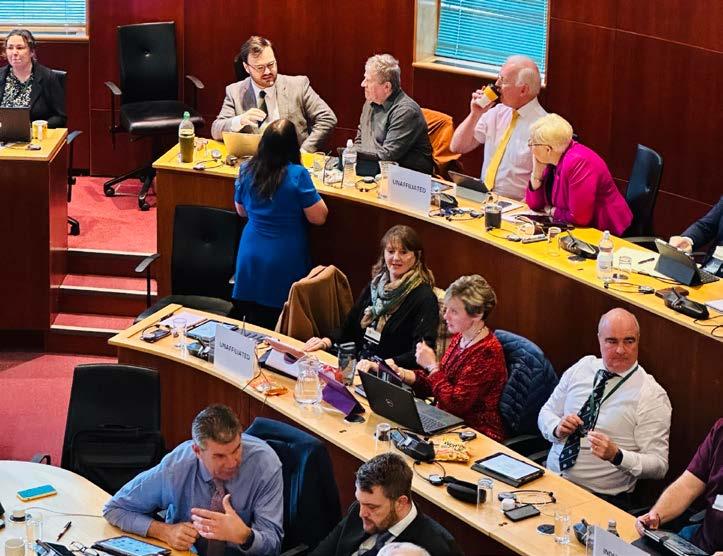
THE QUESTION was who would blink first.
Would councillors vote down the Budget and Council Tax proposals, plunging the Council into turmoil, or would there be a lastminute deal?
A deal, there wasn’t.
But, faced with the possibility of Independent Group councillors and Conservatives banding together to block the Budget, the Cabinet did offer a compromise.
That compromise - a 12.5% Council Tax rise this year - finally passed after a debate that involved more officer input than any previous budget.
The Monitoring Officer and Head of Legal, Rhian Young, faced with allegations that officers had engaged in “strongarm” tactics intended to intimidate well-known nervous nellies David Bryan, Michael Williams, and Mike Stoddart, carefully explained—three times— that she and the Council’s Director of Resources had been asked by several councillors what would happen if the Council did not set a Budget. To inform all councillors and avoid confusion, they emailed their response to all of Pembrokeshire’s county councillors.
The CEO, Will Bramble, clearly exasperated by being asked the same question three different ways by three different councillors, deferred to Ms Young to reply on matters of procedure.
The Director of Resources, Jon Haswell, carefully explained his reservations about a 12.5% Council Tax rise.
Too many councillors were stuck on transmit and too few on receive.
So Mr Haswell had to repeat them. Twice.
During a break in proceedings caused by an equipment malfunction, the disembodied voice of a couple of councillors could be heard.
One, easily identifiable as Cllr Mike Williams, lamented that the connection indicator was “just going round and round”. He paused and
Jon Coles jon.coles@herald.emailadded: “Like this morning, really.”
And that’s what it was like.
In truth, Cllr Williams’s observation about the proceedings was not his best contribution to the meeting.
After Cllr Alec Cormack moved the main Budget motion, the Council’s Deputy Leader, Paul Miller, moved to suspend standing orders to place an amended budget before the Council.
After lunatic procedural shenanigans, Councillors eventually voted to let Cllr Miller lay his amendments and speak to them.
12.5% - more out of reserves, a different approach to the leisure budget, a restructure of back-office functions - and the proposed Council Tax rise fell from 16.31% to 12.5%.
Cllr Jamie Adams did his best to respond, but the killer blow came from Mike Williams.
The Tenby North councillor wondered if Cllr Adams opposed a 12.5% increase and the amended Budget fell, would he then support a 16.31% rise as that was the only other proposal on the table?
There was no snappy comeback to that one.
Cllr Williams had shot Cllr Adams’s fox.
Cllr Adams wriggled and tried to get Jon Haswell to come to his aid. Unimpressed as the Director of Resources was by a 12.5% Council Tax rise, he wouldn’t do Cllr Adams’s job for him.
Through gritted teeth, Jon Haswell said he was satisfied the 12.5% rise met the Council’s obligation to set a balanced budget for the coming financial year.
He added, however, that next year’s Budget would be trickier than forecast.
Conservative Group Leader Di Clements expressed her reservations about the last-minute changes to the Budget.
Her principal concern was that the figures used

to justify a 12.5% rise had to be taken on trust, as they had not been scrutinised.
She also observed, with frustration, that waiting until the last minute to pull a budgetary rabbit out of a hat was not good for building consensus.
It all looked to be drifting to a vote when, with a speech written and not wanting to waste his opportunity to get his deathless oratory into the record, Cllr Jamie Adams moved to give more time for speakers to address the amendment.
Cllr Adams’s speech wasn’t about the amendment.
First, taking the good points he made, local government funding is a mess. Wales has far too many councillors. The local government system is deficient. How councils get grants and what they are allowed to spend them on is wrong.
So far, so good. Nothing to disagree with there.
However, Cllr Adams then decided that with a speech written for a debate that wouldn’t happen, he had to score some political points.
Cllr Adams complained that the administration
hadn’t been bolder with Council Tax increases in the past to avoid the present crisis.
Cllr Adams did not acknowledge that he and the IPG had opposed and engaged in guerilla warfare against the Council Tax rises that would have avoided the present crisis.
The Cabinet, Jamie Adams declared, was too focused on the jam and not the bread and butter issues.
Councillor Adams failed to mention the number of white elephants he’d left littering the capital budget.
Cllr Adams said the current administration had been in place for seven years, so banging on about the previous one’s addiction to the “Lowest Council Tax in Wales” was jolly unfair. Put a pin in that thought.
Cllr Adams then mentioned he’d examined the figures behind the Children’s Social Care Budget and accused Cllr Paul Miller of sleeping on the job for not paying attention to it. Put a pin in that thought.
Finally, Cllr Adams said the Cabinet had only cobbled together a compromise because it
knew it would otherwise lose the vote and its remaining time in office was short.
Step forward, Cllr Tessa Hodgson.
She began gently. Cllr Adams, she reminded him, had been the only person in the room to mention the previous administration and the lowest council tax in Wales. Nobody had mentioned his administration.
She said the Cabinet, of which she is a member, is focused on the here and now.
She then reminded Cllr Adams of how the Cabinet works. Cllr Miller does not have the Social Care portfolio; Cllr Hodgson does.
Highlighting the IPG’s old boys’ nature, she suggested that instead of addressing his remarks at Paul Miller, he should address them to her. The implicit criticism of Cllr Adams for directing flak at the Deputy Leader because he is a member of the Labour Party was clear.
Cllr Hodgson not only defended the Council’s handling of the Social Care budget but also pointed out that unplanned
and unanticipated cost increases in service delivery were, by their very nature, not something anyone could anticipate. The cost of delivering services had shot up, the demand increased, and the Council had to provide them.
There was no alternative Budget on the table.
It was the sort of firm smackdown needed to draw a line under a fractious debate that spent more time speaking about what members said they felt about setting the Budget than any real engagement with the Budget itself.
When Cllr Miller’s amendment to the Budget passed by 32-26, the Council had managed to dodge a bullet.
Having been marched up to the top of the hill by the IPG twice in the last year, the Conservatives will feel deflated.
They’ll be invited to hitch their wagon to the IPG again in May as the Independent Group tries to form another administration.
Who and what they’ll be able to rally behind is anyone’s guess.
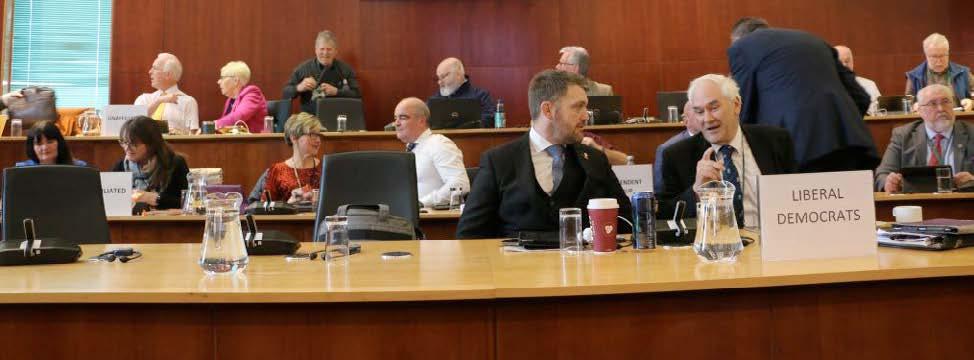

NATURAL RESOURCES WALES (NRW), Public Health Wales and Pembrokeshire County Council will ensure capping of a waste cell causing significant odour issues at Withyhedge Landfill happens as swiftly and safely as possible.
The three public bodies have been in regular contact since the start of the year. Following a public meeting held on Monday, 26 February, they are continuing to work together to achieve progress in resolving the issues affecting the communities surrounding the landfill.
Erin Smyth-Evans, Industry Regulation Team Leader for South West, NRW, said: “NRW is continuing its on-site inspections to ensure
the site operator is moving forward effectively in its work to cap the cell where we have identified the most probable source of the odour. Work onsite is progressing daily and we anticipate noticeable reductions in landfill gas emissions and odours in the coming weeks.
“NRW is also continuing its investigations into permit non-compliances which in part have led us to serve an enforcement notice on RML in recent weeks. This outlined the steps the company needs to take to come back into compliance, and complete the landfill engineering work to contain and collect landfill gas. Our investigatory enquiries will take time and at
present, ensuring the capping works are complete is our top priority.”
The public bodies are working with the site operator to monitor air quality in response to increasing health concerns from the local community. Results are expected to start being received midMarch. Public Health Wales will then be able to provide further advice dependent on those results.
Dr Giri Shankar, Director of Health Protection for Public Health Wales, told The Pembrokeshire Herald: “We recognise that local people are under strain and are very concerned about the impacts of odours around the Withyhedge landfill site.
“While Public Health Wales is not the lead agency for matters like
this, we are working very closely with NRW to make sure the situation is improved quickly to reduce the impact on local people. We have met with NRW and the local authority and are eager to see an urgent solution to this issue. We have also recommended that the site is capped as soon as possible so that the odours are stopped.
“We have also called for monitoring at the site, as this will provide us with the important information that we need to help us conduct a full assessment of any potential health impacts on the local community.
“Our current advice to local residents is that odours and emissions from this site may be harmful to health, and that they should keep doors
and windows closed when the smells are present and seek medical advice if necessary. We hope this situation can be quickly improved.”
Cllr Rhys Sinnett, Pembrokeshire County Council Cabinet Member for Residents’ Services, said: “We recognise the impact of odours on the local community coming from the Withyhedge site and we understand the level of concern this has caused.
“Since before Christmas our officers have been working closely with colleagues from lead organisation NRW to assess the incidence of odours from Withyhedge. Officers from our Planning and Public Protection teams have visited the site alongside NRW colleagues and engaged
with the operators.
“I assure you a lot of work is continuing in the background and all public bodies have reconfirmed their commitment to ensuring a long term solution to the problems as soon as possible.
“As partners we have also committed to continue engaging with the local community and updating on the situation going forward.”
Members of the public are urged to continue reporting odour incidents to NRW.
NRW requests that instances of odour from the landfill continue to be reported via this dedicated form: https://bit.ly/reportasmellwithyhedge
Here you will also find detailed information on NRW’s investigation and action to date.

coroner, Mark Layton has stated that ambulance response times are relevant at an initial hearing into the death of a Pembrokeshire mum.
The Welsh Ambulance has already confirmed that it had initiated a formal investigation after the untimely death of Charlotte Burston, a 40-year-old mother from Llanteg, who succumbed to a hypoxic brain injury on New Year’s Eve following a delayed emergency response.
This inquiry comes in the wake of a harrowing ordeal that began on Christmas Day, spotlighting the vital need for prompt ambulance services.
Charlotte’s desperate situation unfolded when she experienced severe chest pains, prompting her teenage daughter to urgently seek medical help.
Despite their pleas for assistance, the family faced heartbreaking delays, leaving Charlotte’s 83-year-old father to transport her to Withybush General Hospital.
The journey took a turn for the worse as Charlotte suffered a major heart attack and was later declared deceased at Morriston Hospital.
Expressing profound regret over the incident,
 Tom Sinclair Editor@herald.email
Tom Sinclair Editor@herald.email
Liam Williams, the Executive Director of Quality and Nursing at the Welsh Ambulance Service, extended his heartfelt condolences to Ms. Burston’s bereaved family.
Williams affirmed the commencement of an indepth review to scrutinise the sequence of events and to engage directly with the family to address their concerns.
At a recent coroner’s pre-inquest hearing, Charlotte’s father recounted the distressing events, revealing the advice given by emergency operators about transporting Charlotte to the hospital themselves.
He lamented the possibility that a different response could
have led to a different outcome. Pembrokeshire coroner, Mark Layton, acknowledged the relevance of these concerns, underscoring the unique capabilities and equipment provided by ambulance services that could be life-saving.
The hearing further delved into the procedural aspects, with Mr. Layton indicating that the Welsh Ambulance Service Trust would supply transcripts of the 999 calls to ascertain the urgency level attributed to Charlotte’s case and its accuracy.
The necessity for additional medical evidence to determine whether immediate medical intervention could have prevented Charlotte’s death was also highlighted.
Coroner Layton’s remarks pointed towards a broader reflection on the efficacy of ambulance
A COURT has heard how a Puma Energy supervisor drove through Milford Haven town centre despite being over three times the legal drink-drive limit.
CCTV footage played to Haverfordwest magistrates court on Tuesday morning showed Mark Moon, 45, drive through Hamilton Terrace soon after 12.30am on February 9.
services, echoing Mr. Laye’s nostalgic remembrance of a time when emergency services were readily accessible. With the adjournment of the hearing, another review is scheduled in six weeks, leaving the community in anticipation of answers and action.
This tragic incident has not only cast a spotlight on the grieving Burston family but also raised critical questions about the readiness and responsiveness of emergency medical services.
As the investigation proceeds, there is a collective hope for not just closure for the family but also significant improvements in ambulance response protocols to safeguard public health and safety.
We will report on the next hearing, when it takes place.
A BY-ELECTION will be held in St Ishmaels following the sad death of incumbent County Councillor Reg Owens last month.
A Notice of Election will be published on 8th March. Anyone wishing to stand for election must submit their nomination papers to the Returning Officer between the 8th and 18th March.
The Statement of Persons Nominated will be published following the close of nominations.
The St Ishmaels County Council ward includes the surrounding areas of Dale, Herbrandston, Marloes, St Brides, Tiers Cross and Walwyn’s Castle.
If you are interested
in becoming a Councillor there is more information available on the Democratic Services page of the Council website.
Any residents not yet registered to vote have until March 27th to do so and until March 28th to apply for a Postal or 8th April for a Proxy vote. Full details are available on the Pembrokeshire County Council website (opens in new window).
Returning Officer Will Bramble said: “We were all deeply saddened to hear of Councillor Reg Owen’s passing. He was an incredible example of an outstanding public servant and we will miss him. His passing has resulted in the vacancy for St Ishmaels.
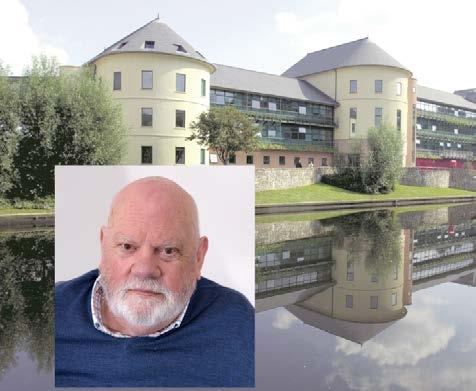
I would encourage St Ishmaels ward residents to vote, and to register to vote, even if they are not yet sure they want to vote.”
Residents should note that this by-election takes place on a Tuesday, not a
Thursday as is typical for most other elections.
Poll cards will be sent to electors before the election that will indicate which polling station to vote at.
Puma Energy plant, near Milford Haven.
At the time of the offence, Moon was the subject of a twoyear community order following a conviction for battery.
“On June 7, 2023, the defendant assaulted his previous partner after arriving home from work,” continued Ms Jackson.
He was then seen turning right into Charles Street, driving his BMW 220D the wrong way through a one-way street before hitting a concrete bollard.
“Police received a call at 12.35am from a person who had heard a loud bang,” Crown Prosecutor Abigail Jackson told Haverfordwest magistrates this week.
“A concrete bollard had been smashed.
“CCTV footage showed a white vehicle being driven by the defendant, swerving across the road with substantial damage to its front. It was driving on the wrong side of the road and at one point was seen driving with its lights off.”
When officers approached the vehicle, they discovered it was being driven by Mark Moon. An unidentified passenger was seated in the front seat.
“There was a strong smell of alcohol and both occupants were under the influence, both being very confused and unsteady, ” continued Ms Jackson.
“The defendant got out and stumbled into a police officer.”
Moon was conveyed to a police custody suite where he gave breath tests, the lowest reading being 112mcg. The legal limit is 35.
“This is a very high alcohol reading which clearly crosses the custody threshold,” said probation officer Julie Norman.
“The CCTV footage shows the defendant driving a considerable distance, and driving the wrong way up a one-way street on two occasions.”
Ms Norman went on to say that the defendant was employed at the
“He punched her four or five times to the back of her head and caused bruising to her knee. The incident caused severe pain [to the victim] whilst it was happening.”
Moon, who gave the court his home address as Furnace Road, Pontygwaith, Mid Glamorgan, pleaded guilty to drinkdriving. He was legally represented by Mr Tom Lloyd.
“My client understands how serious this is,” he said.
“He was brought up in care and has been in and out of trouble since he was 16. It’s been an extremely rocky road for him, but he hasn’t been in custody for the past 15 years.
“And this has been significant progress for him, and five years ago he was promoted to his current role of supervisor with the company.”
Moon was sentenced to 20 weeks in custody suspended for two years. He was disqualified from driving for 30 months.
He was also ordered to pay a £154 court surcharge and £85 costs.
“I’m sure you realise how close you’ve come today to losing your freedom,” commented presiding magistrates Mary Smith when imposing sentence.
“You’re going to have to work extremely hard to earn our trust again.”
Following the publication of this article on 05.03.2024, a representative from Puma Energy called the Pembrokeshire Herald to say that Moon does not work for them, and that they were concerned about what was said in court.
waste recycling centre, at fear of closure as part of potential budget cost savings, has gained an eleventhhour breathing space. Pembrokeshire is currently facing a projected funding gap of £31.9m in setting this year’s budget, with a council tax increase of 16.3 per cent, along with cuts in services to balance the books, proposed by senior councillors ahead of the March 7 meeting of full council.
The actual decision on the 2024-’25 budget – and associated council tax rate and budget savings – will be decided by full council at that meeting.
The 16.3 per cent rate was backed by members of the county council’s Cabinet earlier this month, with members receiving a raft of potential costs savings to the council, including a ‘red’ less-
favoured option to close St Davids waste recycling centre, netting some £25,000, and later £60,000 due to associated fixed costs.
The fear of a potential closure has led to a change.org petition calling for it to remain open, started by Richard Davies, which has attracted more than 1,600 signatures to date.
The potential closure was expected to be part of the council’s 2024’25 budget at the March 7 meeting, with a presubmitted question on the subject by Councillor Alan Dennison included in that meeting’s agenda.
Since the agenda was published, local councillors have been informed the centre will now have a 12-month breathing space.
In a letter sent to
local county councillors, confirmed by the local authority, Cllr Rhys Sinnett, Cabinet Member for Residents Services said: “As you will know, all service areas in the authority were required to come forward with a list of possible proposals to save money in order to meet the unprecedented financial challenge facing the council and for the Infrastructure and Environment Directorate, this was one of those identified.
“It is my proposal that this item is given further consideration before being brought back to Cabinet later this year.
“In practical terms, this means that we will continue to operate the WRC at St David’s for the year 2024/5 whilst examination of future options takes place, but I do need to stress that we need to work pro-actively with the community and city council to find a sustainable model going
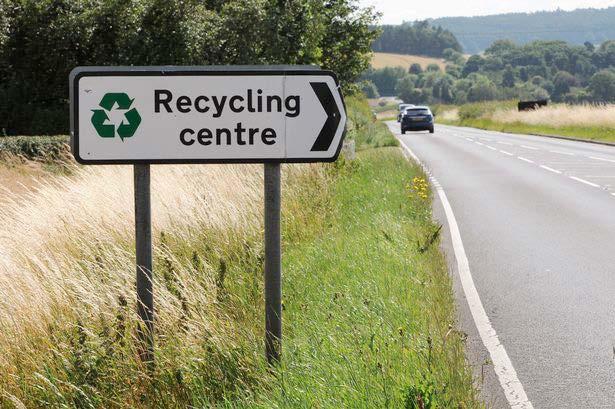
forward or the facility will remain at risk.”
Cllr Sinnett thanked councillors Bethan Price, Mark Carter and Neil Prior for their “strong advocacy” in calling for the centre to remain open.
Announcing the reprieve, Cllr Price said: “I would like to announce to you all that it has ‘just’ been saved for another
year 24/25.
“I have to emphasise the word ‘just’ as there is a lot of work to be done to secure the future of this site. But for now, I am over the moon and delighted with this outcome, our voices have been heard and we have a long way to go.
“Moving forward Cllr Sinnett stressed strongly that we need
to work pro-actively with the community and city council to find a sustainable model going forward or the facility will remain at risk.” Neighbouring Ceredigion County Council, which set its budget on February 29, is facing the potential closure of one of its four waste recycling centres.

PEMBROKESHIRE
COUNTY COUNCIL is finalising plans to bid for Welsh Government funding to repair and reopen the recently closed Wiseman’s Bridge to Saundersfoot path.
The popular route, which is also a section of the National Cycle Route 4, had to be closed on safety grounds following landslips in November, December and most recently February.
Pembrokeshire County Council understands the concern among residents about local access and that a plan is needed to address the issue with landslides attributed to heavy rainfall over recent months.
Shared use path cliff stabilisation works will be discussed at Cabinet on March 11th, which will include a focus on possible funding.
The route also forms part of the National Cycle
Tom Sinclair Editor@herald.emailNetwork Route 4, and is one of the longest in the UK. Annual visitors along the route totalled 481, 684 in 2023 and was vital in supporting the local economy within Saundersfoot.
The Council has been working closely with Welsh Government, and the Welsh Active Travel Board to submit a bid application for funding works to restore the link.
There was a recent visit to Saundersfoot to view walking and cycling routes within the village, along with the landslide area.
It is anticipated that a bid for Welsh Government funding within the Active Travel scheme to help cover the cost of the remedial work required can be submitted.
This will include not only clearing the area,

but to also undertake engineering safety works to re-stabilise the cliff in the affected areas.
In conjunction with
Pembrokeshire Coast National Park Authority (PCNPA), a second funding application could be submitted
via the National Parks Partnership Cycling Projects Fund.
In the meantime, there is continued risk
of further rock falls and the public are asked to respect the closure of the path and avoid the area.
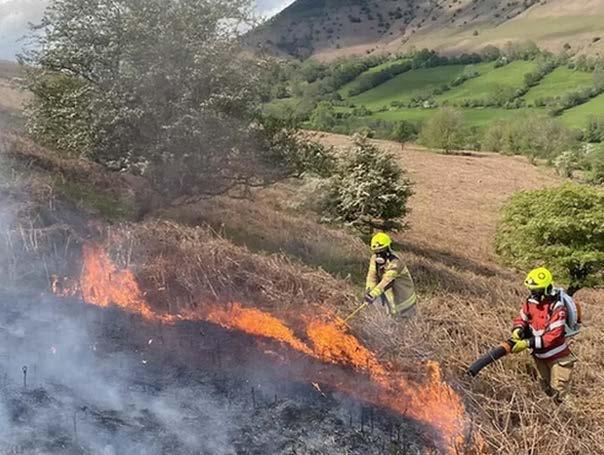
OPERATION Dawns
Glaw, a multi-agency taskforce of specialist from key agencies across Wales has reformed to reduce, and where possible eliminate the impact of grass fires across Wales.
The task force, which was initially established in 2016 to tackle incidents of deliberately set grass fires
across Wales, will also be turning its attention to the increase in accidental fires, often caused as a result of our own careless behaviour when out enjoying the countryside.
In 2023 fire services across Wales attended
1,880 grassfire incidents – this was a decrease of 45% on the previous year with deliberate grass fires decreasing by 1,059 (45%) to 1,301. We want to continue in this direction.
Every year fire is responsible for the destruction of thousands of hectares of countryside, open space, and wildlife habitats. We want to work
with our communities to build a healthier and resilient countryside and to develop a more biodiverse countryside for the future. Working with our communities and sharing our knowledge provides us a better understanding on what we can do limit the damage that accidental fires cause to our environment.
Peter Greenslade, Corporate Head of Prevention and Protection for Mid and West Wales Fire and Rescue Service, and Chair of Operation Dawns Glaw, said: “We launch our campaign again this year on St David’s Day, with a patriotic plea that we all continue to work together to build a healthier and more resilient Welsh landscape, by developing a more biodiverse countryside for our future. We want to continue to protect our landscapes, green grassland, and countryside that we are all so fortunate to have on our doorstep.
“We want to work with our communities,
farmers, and landowners to share our knowledge and understanding of the effect that both deliberate and accidental fires have on our communities. We understand that controlled burns can have a positive effect on the environment, creating biodiversity and a sustainable eco system and we are available for free advice on how do to this safely.
“I would also like to take the opportunity to reinforce our messages that while accidents can happen, there are some within our communities who are deliberately setting fire to our countryside – not only is this a crime, for which they will be prosecuted, but it also places unnecessary pressure on front line services and puts our communities in harm’s way. I would encourage anyone with information relating to such crimes to call 101, or to report anonymously to CrimeStoppers on 0800 555 111”.
The Operation is also continuing its work with farmers and landowners
across Wales, reminding them that while they may burn heather, grass, bracken and gorse up until the 15 March (up to 31 March in Upland areas), they must have a Burn Plan in place to ensure they are burning safely. It is against the law to burn outside of the burning season and can result in penalties of up to £1000.
Find out more about #DawnsGlaw 2024 via Mid and West Wales Fire and Rescue Service’s website www.mawwfire.gov.uk/ DawnsGlaw, where you can also access some simple safety tips and download the campaign’s safety messages for use on your own social media channels. Together we held stop grass fires and protect our countryside and our country.
Remember – If are out enjoying the countryside and you do come across any suspicious activity, please call CrimeStoppers anonymously on 0800 555 111, or ring 101. In an emergency, always call 999.

Friday
STREET FOOD
CIRCUS says it has launched its 2024 programme with two new events joining its regular line up across south Wales.
The first new venture, Fantastic Fête, will take over the grounds of St Donat’s Castle on the Vale of Glamorgan coast for the first weekend in August [Friday 2nd –Sunday 4th]. Street Food Circus is reimagining the classic summer fête –remixing folk traditions with the unexpected – from magical morris dancing to the world’s biggest bouncy castle.
Food and feasting will take centre stage at the event, with a street food line-up bringing cuisines from around the world alongside a farmers’ market, pop-up pub and a lido swimming pool for people to swim and relax around.
Street Food Circus founder and ringmaster, Matt the Hat, explained: “We’ll have the best street food Wales has to offer – but this is about more than just the food. This will be our biggest event to date. We’ve been cooking it up for years with family activities, entertainment and a fantastical walk through the castle gardens to the main event. And after dark, as the sun sets on this epic castle by the sea you can expect a very special evening finale,” he said.
Moving west, the second new event, Saundersfoot Harbour Festival will run over the first weekend in September (Friday 6th – Sunday 8th). Street Food Circus will be bringing the pirate spirit to the National Events Deck at Saundersfoot Harbour with street food and entertainment based around the harbour’s lifesize Coastal Schooner.
As well as bringing the travelling street food lineup to the town, visitors can expect a gravity-defying pirate circus show, sea shanties and lots of walkabout entertainment for families.
The 2024 SFC


programme also sees the return of its two spring and summer residencies. For five weekends in April and May [19 April –19 May], Forest Feastival returns to the Merthyr Mawr Estate, bringing a family friendly global feast to these unique woodlands by the sea. As well as a rotating line-up of street food favourites
– and some new faces –Forest Feastival includes circus performers, live music, cabaret and DJs in the evening sessions and for the kids, a circus school and marshmallow fire pits.
The Big Banquet rolls into Caldicot Castle for the spring half term weekends, including the late May bank holiday [24 May – 2 June]. Centred around long-table communal banquet dining under a big top, Street
Food Circus transforms the castle grounds with a free circus school, fire shows and one of the UK’s best-known highwire acts, Chris Bullzini, performing eight metres above the crowds.
Street Food Circus has curated a line up of more than 40 traders to appear across the four events. These include returning favourites like Keralan Karavan and Bao Selecta, well-known names appearing for
the first time, like Hill’s Burgers and traders who launched last year making a welcome return such as Straight Outta Canton, Two Lads Kitchen and Pot Heads.
Matt added: “We’re always looking for that perfect balance of SFC stalwarts and to find and support the new talent emerging on the street food scene. We know we’ve got some people who come year in, year out to visit
their favourites, and those who want to try something new every time they visit.
“Central to our mission as Street Food Circus is to give a platform to new traders – many of those who started with us have gone on to open their own bricks and mortar restaurants over the years. So we’re thrilled to be adding lots of new flavours from all over the world to the line up this year. From Africa and Afghanistan to Indonesia and Nepal –you’re guaranteed to find something you’ve never tried before,” he said.
New traders for 2024 include award-winning birria tacos from Bristol’s Gourmet Warriors, traditional Himalayaninspired recipes from Mandela Street Food and authentic Indonesian dishes from Waroeng Nona.
Desserts come from Rebel Crumble, Bake Off The Professionals champion Minto’s Patisserie and SFC favourite Pwdin.
Full trader listings and event details for 2024 Street Food Circus events can be found at streetfoodcircus.com. Tickets go on sale on Friday 8 March 2024.


SEREN THORNE, a young talent from Letterston, has been making waves in the world of 10m air rifle precision shooting. A former student of Ysgol Casblaidd, Ysgol Bro Gwaun, and the sixth form at Haverfordwest’s VC High School, Seren is currently furthering her education in music at Cardiff University. However, it is her achievements in shooting sports that are capturing the nation’s attention.
Seren’s journey in shooting began at the tender age of 8, initially with the pistol as part of her participation in the Pony Club tetrathlon. Her transition to the air rifle in 2020 marked the beginning of an illustrious path in this discipline.
Since then, Seren has not only embraced the sport but has excelled at it, demonstrating an exceptional level of
precision and composure. Her hard work and dedication bore fruit in November when she clinched two gold medals at the Welsh Championships. At this event, Seren not only topped the podium but also broke the Welsh and British junior women’s qualification record, setting a new benchmark for aspiring shooters.
However, Seren’s achievements did not stop at the national level. In February, she represented Great
Britain at the Junior World Cup in Granada, Spain. There, she added to her medal tally by securing an individual silver medal and breaking the British junior women’s final record. Seren’s success continued as she contributed to a mixed team bronze medal, once again breaking the previous British junior record.
More recently, Seren participated in the British Open Championships, where she was crowned the British junior women’s champion and won the British confined open women’s championship. These victories are a testament to her skill, determination, and the promising future she has in the sport of shooting.
Seren Thorne’s achievements are not just personal victories but also a source of pride for her community in Letterston, her schools, and indeed for the whole of Britain. As she continues to study and train, the nation watches eagerly to see how far this talented young shooter will go.
Seren’s journey in shooting sports is a vivid reminder of the dedication and hard work required to excel at the highest levels, and she is undoubtedly a rising star to keep an eye on in the years to come.

AS ONE of life’s optimists, I am often baffled by the gloominess and fatalism of some people’s approach to life.
Call me an idiotmy beloved does - but I believe the Welsh XV have a chance of winning every rugby union game the team plays.
Call me an old fool - yes, my darlingest one does - but I believe there is nothing better in life than a nice cup of tea and a chocolate digestive in a comfy chair.
Call me a romantic - strangely, the missus doesn’t - but we should live each day as though it were the springiest of Springs.
Taking a positive view of life comes easily to me.
Yes, there are days when things go wrong. Things don’t always turn out the way you want.
I’m willing to bet that, bar the two hours after the final whistle, Warren Gatland is the life and soul of any party and the first to lead a conga down St Mary Street in Cardiff.
Honestly, he looks the type. One minute, he resembles a suicidal bank manager; the next, he’s in a golf buggy heading down the M4 in the early hours of the morning, singing God Defend New Zealand.
It comforts me that the national rugby team’s coach would have a sense of humour.
Goodness knows he needs one.
And I bet Ben Stokes is a barrel of laughs, too. Picture him, standing there in front of a telly camera, trying to explain to an old fart who last played first-class cricket several decades ago why
playing the forward defensive to everything isn’t an option, and doing so with bland good humour.
If he couldn’t laugh at the ridiculousness of the situation, he’d find a machete and carve his way through the press box and into criminal history.
Watching sports reminds me of how much bigger, fitter, and physically gifted modern professional sportsmen are.
Funnily enough, that is something my wife comments upon.
I don’t ever remember her stripping off her tee shirt and waving it around her head when I was cornerflagging from lineout to ruck to scrum in the hope of avoiding handling the ball. However, when Cameron Winnett made ten yards down the pitch at the Aviva Stadium, she was out of her seat and - thankfully, metaphorically - waving her knickers in the air.
This weekend, Wales play France.
My wife enjoys watching the French play thugby.
She especially enjoys large French forwards.
That’s not large French forwards playing rugby, but large French forwards to ogle.
As an optimist, I believe that David can beat Goliath. I believe that a powder puff front row won’t get rolled over and spat out in broken lumps by merciless fiends wearing blue shirts. I believe wit, guile, and speed of thought are not solely to be found in French players wearing shirts nine through fifteen.
I believe Wales can win.
I’m an optimist.
I promise.
I am.


PLANS to let a Pembrokeshire barn, used for axethrowing and archery instruction without planning permission, stay running have been conditionally approved.
Jonathon Keens, of Aim Country Sports, had applied to Pembrokeshire planners for a retrospective change of use of an agricultural barn to a part-time archery and axe throwing instruction venue at Ffynnon Hafod, Crosslands Road, near Tavernspite.
The application said the change of use was undertaken in 2019, with Mr Keens producing copies of first aid and public liability insurance certificates with the application.
Mr Keens says a preapplication discussion with officers was started in late 2019, but he “heard nothing for almost four years,” before being advised to submit the change of use call.
No objections to the scheme were received.
A report for planners stated: “The application is submitted in retrospect
for the retention of an outbuilding used in association with an archery and axe throwing business.
“The application site comprises a small outbuilding used as a bespoke archery and axe throwing instruction venue in association with a small business known as Aim Country Sports which operates from the site.
“The small business use has positive social impacts through the provision of an outdoor sport available within the locality. Positive economic benefits are achieved through the generation of income from the business.”
The application was approved, with conditions including the provision of a disabled parking bay and the scheme complies with approved plans.
Aim Country Sports, on its website, says: “At Aim you will have the chance to try out activities that are

different and completely new to Pembrokeshire and Wales! We are the only venue offering aerial archery, archery and axe throwing.”
It says aerial archery involves “aiming to large
foam discs that are on the move,” adding: “Using special bows and arrows you can try your hand at being the next Arrow, Katniss or Legolas.”
Axe-throwing
is described as “a crazily fun activity that almost anyone from approximately 10yrs+ can enjoy (our oldest client was 90)”.
It adds: “It is particularly suited to
clients who like the challenge of something new. Great fun for anything from first dates to team building.”
The attraction is rated as five stars on the Tripadvisor website.

NATASHA Osinga has enjoyed a sweet start to life in business with the support of Antur Cymru Enterprise.
When Yum Yum traditional sweet shop in Cardigan shut down in September, there was sadness among loyal customers.
The family business was founded by the Osinga family in 2001 and became a popular part of the high street for more than two decades.
And now it’s back, with the original owners’ granddaughter Natasha at the helm.
She called on Antur Cymru, based in Newcastle Emlyn, for help to reopen the beloved store and was given guidance and advice by business advisor Barry Morgan as part of the Cymorth Busnes Lleol / Local Business
Support programme, which is funded by UK Government and driven by Levelling-Up via Ceredigion County Council.
As well as successfully applying for a start-up loan to install new fixtures and fittings, purchase stock and secure new suppliers, Natasha has now taken on five permanent and seasonal staff.
Just a few weeks into life at Yum Yum, she is thrilled with the response:
“It’s busier than I ever expected, since the opening day it’s been absolutely non-stop!” said Natasha.
“As the store has been in the family so long, I really didn’t want to see it empty or run by someone else, so it was brilliant to be able to bring it back to life.
“Thanks so much to everyone who has shown
myself and Yum Yum so much support, I am so grateful and look forward to many more years here in Cardigan.”
With the backing of her family, the mum-ofthree said she would not have been able to realise her vision without the help of Antur Cymru.
“They were amazing, especially Barry who guided me through the whole process, which was vital as it’s not something I had any experience of before,” said Natasha.
“I’m already diversifying, and we’ve had bookings to supply for parties and weddings, so that’s an area I hope to grow in the months ahead, as well as introducing exciting new sweets and treats for our customers.
“I feel more confident, and we are in a good place, so I’m excited for the future.”

Barry added: “It was a pleasure to be able to guide Natasha from her initial interest in taking on the business through to the opening day, which was a real celebration.
“We are pleased to have been able to support her on this amazing journey, and other traders on the bustling Cardigan high street, which has really come to life since
the new year.
“As an organisation we are committed to helping business owners, entrepreneurs and anyone with a germ of an idea, and have the tools and resources to help make their dreams a reality – that was certainly the case here, congratulations Natasha!”
For more on Yum
Yum Sweets, visit the Facebook page: www.facebook.com/ yumyumsweetscardigan.
For more on Antur Cymru, visit the website www.anturcymru.org. uk and follow them on social media at @ AnturCymruWales. Alternatively, call 01239 710238 or email info@ anturcymru.org.uk.
MS said he fears the 182-day threshold for holiday lets will force many self-catering businesses to close.
Mr Rowlands, Shadow Minister for Local Government and Chair of the Senedd’s Cross-Party Group on Tourism said he was extremely concerned for the future of this type of accommodation across Wales.
In Welsh Parliament he recently called for an update on Non-Domestic Rating (Amendment of Definition of Domestic Property) (Wales) Order 2022, and particularly the impact of that Order, which defines a selfcatering business as one that must be let for 182 nights a year, instead of the previous 70 days.
He said: “I raised significant concerns with this order, when it made its way through the Welsh Parliament and I am troubled now to hear of specific issues, which show restrictions on self-catering businesses during the COVID lockdown periods are
Tom Sinclair Editor@herald.emailnow effectively classed as ‘cancellations’, even though those businesses had no choice at the time.
“This is pushing a number of genuine businesses to be classified as second homes and liable to significant additional costs, even though they had no choice over those restrictions that were placed upon them during that COVID lockdown period.”
He called for a muchneeded update on the impact of this order since it came into force nearly two years ago.
He added: “I have had many emails from concerned business owners in North Wales who are extremely worried for their futures as the 182 day rule is just not sustainable. Several have already considered taking their cases to a tribunal as they have been wrongly charged significant Council Tax premiums due to their closures during the

pandemic.
“One of my constituents, who lets out two holiday cottages, has told me that he recently attended a tribunal hearing as a witness and was amazed
to hear that the tribunal panel regarded “booking cancellations” and “mandated closure due to lockdown legislation” as exactly the same thing.
“The UK Government
provided compensation in the form of business grants for mandated closure due to lockdown legislation, the Welsh Government clearly did not.
“You really couldn’t
make it up. I understand that The Professional Association of Self Caterers UK (PASC UK) are also starting to investigate the issue and may raise a legal challenge.”

THE LARGEST ever cross-party Senedd investigation into the needs of the rural economy has published a landmark new report, setting out a robust and ambitious blueprint for the Welsh countryside.
The Senedd Cross Party Group (CPG) for Rural Growth’s report, Generating Growth in the Rural Economy: an inquiry into rural productivity in Wales, is making a series of lowcost recommendations across infrastructure and connectivity; housing and planning; tourism; and food and farming which, if implemented, could unleash the potential of Wales’ rural economy.
It follows the most comprehensive inquiry ever to be conducted by a cross party Senedd group into the needs of the rural economy. The CPG took evidence from
major business groups, employers, unions and others to produce the report, with the Country Land and Business Association (CLA) acting as the secretariat. It will be officially launched at an event at the Senedd at noon today (5 March).
Productivity in Wales as a whole is 16% lower than the UK average, while workers in rural Wales are up to 35% less productive than in urban areas (output £18,000 per capita versus £28,000).
The report sets out a total of 19 low-cost, nonpartisan and tangible recommendations which would help the Welsh government address this divide, and match the ambition of its rural communities.
Key asks and solutions developed by the group include:
1. The reestablishment of a
Rural Development Board (RDB) in conjunction with key stakeholders, to act as a focal point for facilitating rural growth, sensitive to sub-regional zones.
2. The RDB to set out a definitive rural development strategy, setting objectives for infrastructure development, connectivity and rural skills and have the powers and resources to deliver it.
3. A raft of measures to enable the planning consent system to become an enabler for responsible growth: reviewed local authority local development plans (LDPs), more planning officers to accelerate and improve the planning process, and the introduction of the

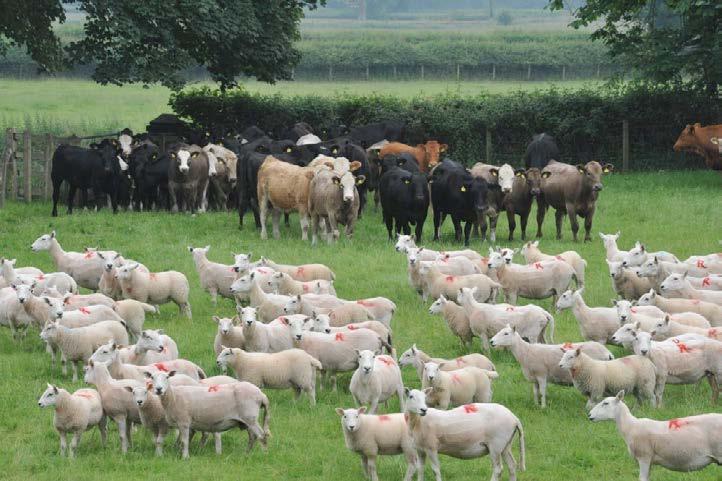
positive approach of Planning in Principle to enable investment to be made and development to take place.
4. Urgency in adopting the actions stemming from the Relieving pressures on SACs river catchments to support delivery of affordable housing programme led by the First Minister.
5. Measures to revitalise the rural tourism industry: Visit Wales to become an arms-length body with resources comparable to equivalents in other parts of the UK, the body should include representatives from the sector. Impact assessments must be undertaken of recent fiscal initiatives and appropriate exemptions should be made to the 182-day threshold for business tax on tourist accommodation.
6. A review of the terms – and clarity of the funding rates –within the proposed Sustainable Farming Scheme (SFS) to ensure it can continue to support this fundamental pillar of the rural economy is truly sustainable. The recommendation includes a demand for greater flexibility on the proposals to
commit farms to 10% cover of trees and habitats.
Iain Hill-Trevor, Chair of CLA Cymru which represents thousands of farmers, landowners and rural businesses across Wales said: “For too long, the Welsh Government has treated rural Wales as a museum, to be preserved for the enjoyment of visitors.
“Instead, Ministers should view the countryside as a source of future growth and prosperity, creating jobs and opportunity while still preserving its inherent beauty.
“Wales needs to generate economic growth and good, skilled new jobs. Both can be delivered by delivering on the recommendations within this report.”
Samuel Kurtz MS, Chair of the CPG, said: “Rural Wales plays a key role in the future prosperity of our nation, but its potential will only be realised if policy makers and government understand its unique nature and needs.
“This cross-party report has taken evidence from a range of sectors throughout Wales, drawing on experiences of those living and working in rural Wales. The recommendations put forward are non-partisan but can act as a catalyst to simulate sustainable growth in our rural economy.
“I’m excited that this is the first report of its kind in the Senedd and I hope whomever is Wales’s new First Minister takes these recommendations seriously, to deliver for rural Wales.”
Margaret Bardsley has been running a small holiday lettings business near Welshpool, Mid Wales, since 2009. She said: “I welcome this report into rural productivity and growth in Wales.
“Furnished holiday accommodation providers have been hit with repeated body blows which have had a major impact both on demand and supply.
“To consider introducing a tourism levy and a licensing scheme right now is truly rubbing salt into the wounds, while the 182-night rule will increase the number of owners selling up, often way beyond the price range of those seeking affordable housing.
“My guests spend a lot of money in the local shops, pubs and restaurants, supporting jobs in the rural economy. If the Welsh government backed rural businesses and helped address the urban-rural productivity divide it would really make a difference.
“Rural businesses are dynamic and forward-thinking, and we’re ready to work with the government to help unleash the potential of the rural economy.”

Climate Change, has detailed progress in the ongoing Welsh Building Safety Programme. The programme, a collaboration with Plaid Cymru, aims to overhaul the current building safety regime and tackle fire safety in buildings over 11 metres.
The forthcoming Building Safety (Wales) Bill, set to be introduced within this Senedd term, promises a new era of building safety covering multi-occupied residential buildings, surpassing the scope of the Building Safety Act 2022 implemented in England. This bill will ensure all multi-occupied residential buildings in Wales with two or more units are included, setting a new standard for building safety and management.
In the wake of the Grenfell tragedy, the need for clear accountability has been underscored. The Welsh Government’s bill will establish a robust regulatory system, defining clear responsibilities

for building owners and managers, and introducing statutory duties for “duty-holders” of residential buildings.
Efforts are underway to closely involve leaseholders and tenants in the formation of this new regime, ensuring their voices are central to the programme’s development. The Welsh Government plans to entrust local authorities with the regulation of the occupation phase, leveraging their extensive
experience in regulatory oversight and resident engagement.
The initiative includes an economic analysis by Adroit Economics Ltd to assess the cost and resource implications for local authorities. This comprehensive approach aims to support a smooth transition to the new regime, with an emphasis on bolstering local authority capabilities through recruitment and training initiatives for building control
inspectors.
The first phase of the Design and Construction transition plan is nearing completion, marking a pivotal moment with the opening of registration for Building Inspectors and Building Control Approvers in Wales. This step is part of a broader effort to tighten controls in the building control profession and improve transparency and accountability.
In addition to regulatory reforms, the
Welsh Government is actively addressing fire safety in existing buildings, with an ambitious programme to rectify fire safety concerns beyond external cladding, embracing internal issues as well. Progress is being made, with several major developers already signing up to the government’s contract, although some delays have been encountered.
The programme extends support to smaller developers and
is proactive in ensuring that buildings without a clear developer or those with developers that have ceased operations receive the necessary assistance for fire safety improvements.
To date, significant strides have been made with 37 buildings completed and 86 more in progress. The Welsh Government is also taking steps to assist leaseholders facing challenges with selling or remortgaging their homes due to building safety concerns.
Looking ahead, the establishment of a Joint Inspection Team for Building Safety in Wales is on the horizon, aiming to enhance the safety of multi-occupied residential buildings through additional inspections and advice.
Minister Julie James encourages stakeholders and affected parties to engage with the Welsh Government’s Building Safety Programme, highlighting the government’s commitment to ensuring the safety and security of residents in Wales.
PEMBROKESHIRE
based Ascona Group, the 7th largest UK independent forecourt operator and one of the fastest growing companies in Wales for the last three years, is delighted to announce that it has made another £50,000 donation to its charity partner, the Wales Air Ambulance, as it hits its ambitious fundraising target of £100,000 in the 2023/24 financial year.
After Ascona made initial donations of £10,000 in March 2023 and £40,000 in November 2023, the Group has made this additional donation following the success of its fundraising activities across its portfolio of first-class roadside retail destinations over the last few months.
Following this donation, Ascona has now hit its target of raising over
Tom Sinclair Editor@herald.email£100,000 for the Wales Air Ambulance over the course of the year-long partnership.
Ascona is also delighted to announce that it has renewed its charity partnership with the Wales Air Ambulance, and has committed to raising over £100,000 in the next financial year once again.
The partnership with the Wales Air Ambulance helps to support their vital mission to deliver lifesaving medical care to people across Wales, whenever and wherever they need it. The service relies entirely on charitable donations as the organisation seeks to raise £11.2 million in funds every year to keep the helicopters in the air and rapid response vehicles
on the roads across Wales.
Darren Briggs, Founder and CEO of Ascona Group, commented: “I am thrilled that we were able to make another significant donation to this vital charity. Over the last 12 months, we have been able to hit our ambitious fundraising target and we’re delighted to renew our partnership with the Wales Air Ambulance for the 2024/25 financial year.
“This time, we expect to raise a further £100,000 for the Wales Air Ambulance, which will help to ensure this brilliant charity can continue to deliver lifesaving medical care to people across Wales.”
“Since we launched Ascona in 2011, supporting our local communities has been at the heart of everything we do so I am very proud that we continue to play

such an active role in supporting charities like Wales Air Ambulance who make such a difference to communities across Wales.
Dr Sue Barnes, Chief Executive, Wales Air Ambulance Charity commented: “We are all deeply grateful for the
level of support we’ve received from Ascona this year. Working with Ascona on our partnership over the last year has been a positive and rewarding experience, and we are delighted to be able to continue this relationship for the next 12 months.
“On behalf of all crew,
staff and patients, I’d like to thank the entire Ascona team for their hard work over the last 12 months, as well as everyone who made donations. Without the help of organisations like Ascona, it would not be possible to do what we do at the Wales Air Ambulance.”
A CALL to raise the flag of the Falklands Islands at Pembrokeshire’s County Hall will be heard later this week.
In a submitted question, which will be answered at the March 7 meeting of Pembrokeshire County Council, Councillor Huw Murphy will ask:
“Would the Leader of Pembrokeshire County Council [Cllr David Simpson] agree to the raising of the Falkland Islands flag on June 14, 2024, outside County Hall?
“June 14 is Liberation Day within the Falkland Islands to celebrate the return of democratic rule following an illegal military occupation by Argentina. The restoration of democracy to the Falkland Islands on June 14, 1982, ultimately returned democratic rule to Argentina.
“The purpose of
Bruce Sinclair Local Democracy Reporterraising the Falklands flag at County Hall on June 14 is to remind us of the ultimate sacrifice made by 255 service personnel serving our country during the Falklands war.
“Poignantly 22 of those lost in the conflict were serving on HMS Ardent, a Royal Navy destroyer sunk on May 22, 1982. HMS Ardent has a close association with the county of Pembrokeshire through its affiliation with Milford Haven.
“The raising of the Falklands flag at County Hall will have great resonance for the town of Milford Haven and for members of the HMS Ardent association, in that their service many years ago is still remembered.”
The flag of the Falkland Islands features the Union flag

in the top left along with a coat of arms featuring a ram and a ship, The Desire,
which discovered the islands.
Cllr Murphy’s call to raise the flag at County
Hall, Haverfordwest will be answered at the March 7 meeting, one of 35 items on the
agenda, including the controversial potential council tax rise of 16.3 per cent.

PEMBROKESHIRE
residents returned to the Blue Lagoon at Bluestone National Park Resort, not only to bask in the attractions but also to support a commendable local initiative.
Previously, the Blue Lagoon welcomed both locals and tourists to enjoy its pool, wave machine, jacuzzis, and water slides. However, this opportunity was halted during the Covid-19 lockdown, leading to widespread disappointment among the local community.
Bluestone declared last year its plans to reopen the Blue Lagoon for locals through charity events. The inaugural event was a success, raising substantial funds for the mental health charity, Get the Boys a Lift. Nearly 600 community members participated in this event, which is the first among

many planned to support the water park.
The proceeds from the ticket sales benefited Get The Boys A Lift significantly, with the charity receiving 75% of the approximately £6,000 raised, while the remaining 25% was allocated to the Bluestone Foundation.
These community gatherings aim to provide exclusive access to the Blue Lagoon for locals, while also raising funds for Pembrokeshire’s charitable and non-profit organisations.
The relaunch of the Bluestone Foundation and its community fund was highlighted during

empower individuals through economic, social, and environmental efforts. The success of the GTBAL event has revitalised the foundation’s commitment to these causes.
The forthcoming community event at the Blue Lagoon, scheduled for May 28th, will benefit the VC Gallery in Haverfordwest, continuing the foundation’s support for local initiatives, particularly those that engage veterans and the community through art.
the first event. Local charities and non-profits are now encouraged to apply for funding, and to organise events at the Blue Lagoon.
Since its establishment, the Bluestone Foundation has contributed approximately £333,000 towards initiatives that
Collaborating with the Pembrokeshire Association of Voluntary Services (PAVS), the foundation ensures a transparent and fair distribution of funds. PAVS offers guidance to applicants before their proposals are reviewed by the Bluestone Foundation Committee.
Marten Lewis, chair of the Bluestone
Foundation, expressed his delight at the overwhelming turnout and support for the first community event.
Lorna Livock, funding development officer at PAVS, echoed this sentiment, emphasising the significance of the partnership in supporting local projects amid challenging financial times.
This partnership with PAVS allows Bluestone to leverage their expertise in project initiation, compliance with regulations, and volunteer management, ensuring impactful support for community initiatives.
Organisations interested in applying for funding can do so through PAVS yearround, with details available for the upcoming Blue Lagoon event and ticket purchases online.

THIS WEEK (Mar 5) in the Senedd, the Welsh Liberal Democrats have called for a major culture change in the care system in Wales.
Two weeks ago, the leader of the Welsh Liberal Democrats met with representatives from Voice from Care Cymru in the Oriel.
During the event a scarf made up of nearly 8,000 squares, each one representing a child or young person currently in the care system in Wales, was unveiled.
The Welsh Lib Dems are now calling on the Welsh Government to commit to delivering a care system that supports
young people in care.
Commenting, the Leader of the Welsh Liberal Democrats Jane Dodds MS said: “Two weeks ago, I had the honour of sponsoring an event at the Senedd in collaboration with Voice from Care Cymru.
During the event I had the opportunity to speak to several care experienced young people who shared with me their views on how we can build a care system that works for them.
They also showed me an incredible creation- a knitted scarf made up of nearly 8,000 squares each representing a child or young person currently
in the care system. A child or young person that we all have a responsibility for.
Each and everyone of us in this Siambr has a commitment to these young people, a commitment to ensure that their voices are being heard.
From speaking to those care experienced young people, it was clear that we desperately need a major culture change in the current care system.
We need a care system that is not only effective, but also empowering and most importantly compassionate.
We need a care system that cares.”
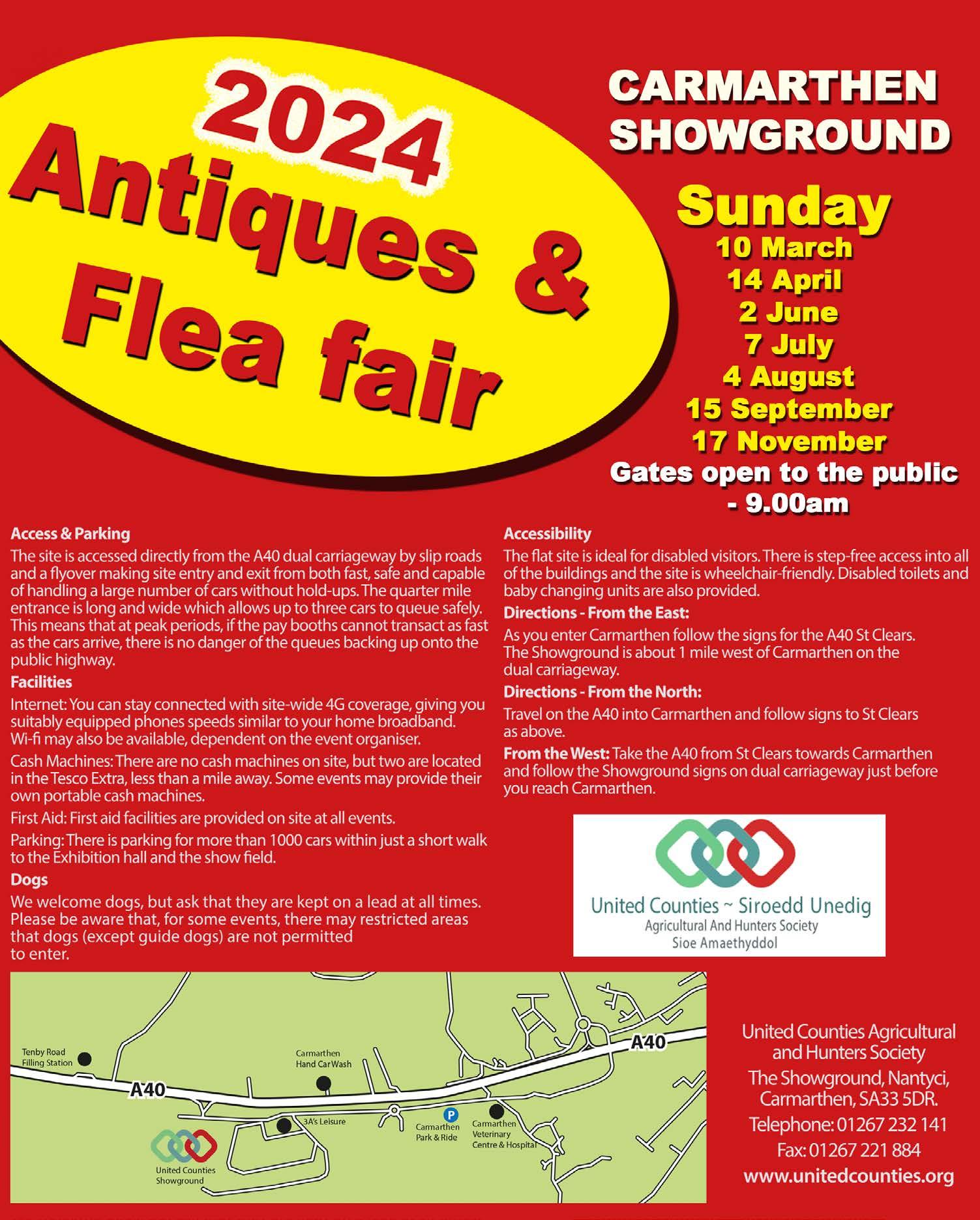
PLANS to let a Pembrokeshire barn, used for axethrowing and archery instruction without planning permission, stay running have been conditionally approved.
Jonathon Keens, of Aim Country Sports, had applied to Pembrokeshire planners for a retrospective change of use of an agricultural barn to a part-time archery and axe throwing instruction venue at Ffynnon Hafod, Crosslands Road, near Tavernspite.
The application said the change of use was undertaken in 2019, with Mr Keens producing copies of first aid and public liability insurance certificates with the application.
Mr Keens says a preapplication discussion with officers was started in late 2019, but he “heard nothing for almost four years,” before being advised to submit the change of
Bruce Sinclair Local Democracy Reporteruse call.
No objections to the scheme were received.
A report for planners stated: “The application is submitted in retrospect for the retention of an outbuilding used in association with an archery and axe throwing business.
“The application site comprises a small outbuilding used as a bespoke archery and axe throwing instruction venue in association with a small business known as Aim Country Sports which operates from the site.
“The small business use has positive social impacts through the provision of an outdoor sport available within the locality. Positive economic benefits are achieved through the generation of income from the business.”
The application was approved, with conditions

including the provision of a disabled parking bay and the scheme complies with approved plans.
Aim Country Sports, on its website, says:
“At Aim you will have the chance to try out activities that are different and completely new
to Pembrokeshire and Wales! We are the only venue offering aerial archery, archery and axe throwing.”
It says aerial archery involves “aiming to large foam discs that are on the move,” adding: “Using special bows and arrows
you can try your hand at being the next Arrow, Katniss or Legolas.”
Axe-throwing is described as “a crazily fun activity that almost anyone from approximately 10yrs+ can enjoy (our oldest client was 90)”.
It adds: “It is particularly suited to clients who like the challenge of something new. Great fun for anything from first dates to team building.”
The attraction is rated as five stars on the Tripadvisor website.


Squawk! Oh, my fine feathered friends and human comrades, gather round, for Stephen Seagull here has spotted something rather fishy from my lofty perch. What’s that, you ask? Well, it’s Britain’s latest swoop into authoritarianism, a pattern as old as the cliffs I nest upon, yet ever so troubling.
Here’s the breadcrumb trail: Our political top birds have pecked out a so-called subversive group, flapping about as a national threat. They squawk of dangers, painting these groups with the feathers of foreign foes. And, oh, how they’ve conjured an air of emergency, with evidence as real as my love for inland chipsthat is, mostly imagined.
Take, for instance, the recent squawks from Rishi Sunak about “mob rule” and domestic forces of division. It’s a shadow dance, my friends, not about real threats, but about silencing those squawking against injustices, like the dire situation in Gaza or our planet heating up faster than a seaside chip shop in August.
And then, there’s this notion of “McCarthyism,” a term tossed around like stale bread, yet none dare praise its true, dark feathers. The real squawk? It was never about the reds under the beds, but about clipping the wings of progress and keeping the worker birds in their place.
Look back, my flock,


to the ghost of Taff Vale, or the strikes smashed by the iron talon of Thatcher. The miners,
once branded enemies within, now enjoy the warmth of public sympathy, showing
how time can molt the feathers of perception.
But let’s not forget, in our own nests,
the shadows linger. Undercover peckers infiltrating groups, spying under false
plumage. It’s a tactic not out of place in a spy thriller, yet here it happened, under our very beaks.
And oh, the hypocrisy! While farright gulls squawked unchallenged, peaceful protests face storms of condemnation. The difference, you see, is not in the message, but in the feathers of those delivering it.
So, what’s the squawk, really? It’s about fear. Fear of being questioned, fear of movements that fly against the wind. Yet, as history shows, it’s not those who oppose injustice that face judgment, but those who try to silence them.
In these squally times, remember, my feathered and featherless friends, to keep your eyes on the skies, your wings ready, and your voices loud. For in the squawk for justice, we must not be silenced. Squawk on, squawk loud, and let not the shadows of authoritarianism clip our wings.
Stay sharp, stay soaring,
Stephen Seagull

We who are about to die, salute you!
Badger comes to praise Drakeford, not to bury him.
Ho hum!
Well, that’s done and dusted.
Whatever Mark Drakeford is, he isn’t Caesar. He’s like the leader of one of those little tribes on the edge of civilisation who spend half their time preying on the Romans and the other half of it preying on each other.
As Mark Drakeford nears the end of his tenure as First Minister, Badger is relieved the pretence of being Uncle Drakeford has slipped.
Uncle Drakeford speaks in calm and measured tones, almost designed to lull the listener into a deep slumber.
Mark Drakeford is an arrogant, bitter, snarling, sneering tribal politician with a tin ear for the public mood and a technocratic vision for Welsh governance.
As Will Lloyd’s article in this week’s New Statesman explains, Mark Drakeford doesn’t understand Wales.
Badger would add, “Of course he bloody doesn’t”.
Mark Drakeford understands Labour in Wales (note, not Welsh Labour; no such beast exists). He is part of the party that holds the electoral whip hand in Wales and has done so for over a century.
Mark Drakeford has been at the heart of Wales’s devolved government for the last quarter of a century.
He was a Special Advisor to Rhodri Morgan (on health policy, amongst other things). He became Health Minister under Carwyn Jones, moving on to Finance Minister, before ascend-


ing to the First Minister’s position. If you look at the record of Labour in Wales over the last twenty-five years, Mark Drakeford’s fingerprints are everywhere.
Well, they would be if he hadn’t worn gloves. A good burglar leaves the scene without a trace.
Twenty-five years of Mark Drakeford and his ilk have left Wales as a basket case.
The economy is in the tank.
More families and children are in poverty.
Welsh workers are paid less and have less secure jobs than their counterparts in the rest of the UK.
The NHS in Wales is a disaster zone - we’ll come back to that.
Educational attainment is the worst in the UK and below the OECD average.
The Welsh Government wasted European money on such a scale
that even flinging hundreds of millions at its heartlands couldn’t persuade voters to remain in the EU.
Public transport links are laughably inadequate, while road infrastructure is crumbling.
Labour in Wales knows many things need dramatic reform, such as local government, procurement, the NHS, public finances, and business rates. It’s done nothing but harm by design, neglect, or political cowardice.
On the one hand, the Cardiff Bay Labour Party says Westminster is stripping powers away from the devolved government; on the other, the Cardiff Bay Labour Party says the Welsh Parliament needs more members because of its increased powers.
Mark Drakeford has been at the centre of the devolved labour governance of Wales for twentyfive years.
Look upon his works, ye mighty! And despair.
Despair is the right feeling, though not in the sense the poet meant.
Despair, desperation, and desperate stuff.
Mark Drakeford’s legacy is like Ozymandias’s in Shelley’s sonnet.
“The lone and level sands stretch far away.”
Speaking of colossal wrecks, Badger returns to the NHS in Wales.
Dr Andrew Goodall, who has failed his way upward from being NHS Wales’s CEO to Wales’s most senior civil servant, Permanent Secretary to the Welsh Government, appeared before the UK Covid Inquiry last year.
He was singularly unimpressive, and his attempt to explain the labyrinthine nature of NHS management accountability in Wales was equally unimpressive.
The NHS in Wales
does not have a management structure. It has excuses. The nature of NHS management in Wales is that where you place the blame is the only thing that matters.
The blame turns out to be on the public and the patients.
Yes, readers, if it weren’t for so many of us being ill, disabled, sick, vulnerable, diseased, and dying, everything would be hunky dory in the Welsh NHS. We’re all in the way of perfect performance.
The Welsh NHS is full of dedicated clinical and support staff. They do the best they can with what they have. They understand that the purpose of the NHS is to treat those who need care and treatment.
However, organisationally and administratively, the purpose of the NHS in Wales is the NHS in Wales. It’s like the Communist Party in the former Soviet Union or organised religion: the original purpose is subordinate to the maintenance of the myth.
Badger gags whenever he hears Mark Drakeford bang on about staff’s dedication and hard work whenever shambolic NHS performance is mentioned.
It’s not that he doesn’t understand criticism of his government and the NHS’s performance is not criticism of its staff. It’s a pathetic deflection - and it’s scarcely likely to disappear when Mark Drakeford does.
Ambulance waiting times, waiting times in A&E, waiting times for treatment, the availability of GPs, the dicing and slicing of services, the failures to recruit staff...
That’s what twentyfive years of Mark Drakeford at the heart of devolved government has delivered for Wales.
Is it any wonder that
an opinion poll commissioned by Mr Drakeford’s much-trumpeted Constitutional Commission found most Welsh voters wanted the NHS to run from Westminster?
It’s strange, readers. When Mark Drakeford was Health Minister, he deferred to expert opinion. That was always the fire blanket he threw over contentious decisions over healthcare provision. Experts advised him to do unpopular things, so his hands were tied.
When the same experts point out the Welsh NHS’s appalling condition, Mr Drakeford disagrees with them. He doesn’t recognise the picture they paint of an omnishambles in action across Wales.
In the dog days of his administration, the contempt with which Mr Drakeford and the Labour Party in Wales hold the Welsh people is front and central.
He’s been caught misleading the Senedd. He’s refused a Walesspecific COVID inquiry because he conveniently chose to believe Boris Johnson’s reassurances. He’s ducked scrutiny and refused to answer questions.
He and his Party have the same connection with rural Wales as an aggressive tumour on a vital organ.
He and his Party have wasted decades of devolution tilting at windmills, chasing fantasies, and fannying around on the margins.
Real change is beyond Labour in Wales because Labour is the Welsh establishment.
Please remember one thing when the platitudes and praise roll in when Mark Drakeford steps down.
Look upon his works, o readers, and despair.


Two centuries ago, the Royal National Lifeboat Institution (RNLI) was established, a charitable entity born from the vision of safeguarding lives at sea. Despite its maritime mission, the inception of this noble service took place on terra firma, within the bustling epicentre of the City of London.
The concept of a dedicated lifeboat service sprang from the mind of Sir William Hillary, an Isle of Man inhabitant, who in 1823 set forth his ideas through a pamphlet. Initially met with indifference, his persistent efforts eventually garnered the attention of a cadre of prominent Londoners.
On the evening of 4 March 1824, a distinguished assembly convened at the London Tavern on Bishopsgate to deliberate on Hillary’s proposal. This illustrious group comprised notable figures such as the Archbishop of Canterbury,
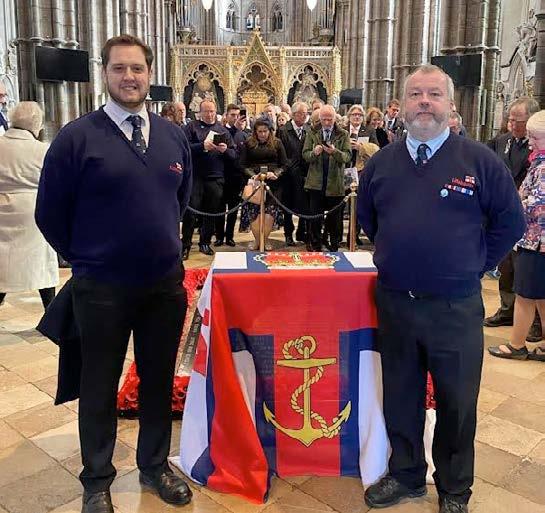
Thomas Wilson, the Liberal MP for Southwark, and William Wilberforce, a fervent advocate against slavery, with their names enduring in the RNLI’s historical records.
According to RNLI archivist Hayley Whiting,

the bicentennial of this foundational meeting represents a momentous milestone. The original minutes of that gathering not only outlined the charity’s objectives but have also guided its course over two
hundred years, maintaining its commitment to volunteerism and funded solely by charitable contributions.
Where the London Tavern once stood, now rises a modern office edifice, but at its base, a stone plaque commemorates the inception of the RNLI two centuries ago, honouring the visionaries who laid its groundwork.
The connection between the city and the RNLI remains profound, with the charity’s headquarters situated in London and a historic boatyard in Poplar, east London, where lifeboats damaged in rescue missions were repaired from 1882 to 1939.
The RNLI’s enduring legacy in London was fortified following the tragic Thames disaster on 20 August 1989, when the Marchioness party boat and the dredger Bowbelle collided, claiming 51 lives. This catastrophe led to a comprehensive review of Thames safety and the
subsequent establishment of a dedicated lifeboat service in the capital, with stations at strategic locations including Teddington, Chiswick, Tower Pier, and Gravesend.
Janet Kelly, the inaugural manager at Tower Pier, highlights the fortunate acquisition of the pier for the symbolic sum of one pound, underlining the strategic importance of the location for the RNLI’s operations in London. Today, Tower Pier is the nation’s busiest, a testament to the critical role of the RNLI’s services.
The RNLI’s bicentenary is celebrated with a thanksgiving service at Westminster Abbey, recognising the contributions of the RNLI’s community across the UK and Ireland. Reflecting on the charity’s journey, Chief Executive Mark Dowie believes the founders would view the RNLI’s current embodiment with immense pride, acknowledging its adherence to their initial vision.


ON MONDAY, March 4, the Royal National Lifeboat Institution (RNLI) celebrated 200 years of saving lives at sea. Fishguard RNLI Lifeboat Station is celebrating being both the oldest lifeboat station in Wales, as well as being the first Welsh station to have a female Coxswain.
On the day the charity turns 200, the RNLI is revealing its volunteer lifeboat crews and lifeguards in west Wales have saved an incredible 3,891 lives during its two centuries of lifesaving.
Since the charity was founded in 1824, its volunteer crews in west Wales have launched the lifeboats 14,872 times, saving 3,776 lives, while its lifeguards – who became part of the RNLI’s lifesaving service in 2001 –have responded to 8,865 incidents, saving 115 lives*. In total across the UK and Ireland, 146,452 lives have been saved by the RNLI – this equates to an average of two lives saved every day for 200 years.
Since 1824, the four lifeboat stations in Ceredigion have launched 4,848 times and saved 1,238 lives. In Pembrokeshire, the five stations have launched 8,563 times and saved 2,395 lives. Burry Port station in Carmarthenshire has launched 1,461 times and has saved 143 lives.
Fishguard Lifeboat Station on the far west coast of Pembrokeshire was the first lifeboat station to be established in Wales. Originally established in 1822, Fishguard’s first lifeboat was built by locals. In 1855, local inhabitants requested that the RNLI take over the station.
The station has also made RNLI history by being the first station in Wales to appoint a female Coxswain – Gemma Gill. Gemma has recently passed out as Coxswain and is thoroughly enjoying her new role.
Gemma joined the RNLI in 2001 serving as a

volunteer for North Berwick and Aberystwyth RNLI before becoming a full-time staff member.
Gemma said: ‘The first person to take me to sea on a lifeboat was a woman called Rhona, and she told me “don’t let other people decide what you’re capable of,” which has always stuck with me.
‘While I believe it’s a matter of skills and experience rather than gender, I recognise the significance of this milestone.
‘We’ve come a long way from the image of a lifeboatman in his oilskins, and, as the first woman to become an RNLI coxswain in Wales, I hope to inspire other women and girls to join the lifeboat crew.’

Although not officially part of the early lifeboat crews, women have always played an active role in the work of the RNLI, from the ‘lady launchers’ who played key roles at lifeboat stations assisting in the launching and recovery of vessels, to fundraisers such as Marion Macara who helped to organise the first recorded charity street collection in Manchester in 1891.
Throughout its history, Fishguard lifeboat station has been awarded 28 medals. One gold, 18 silver and nine bronze. Today the station operates a D-class inshore lifeboat Edward Arthur Richardson as well as a Trent class Blue Peter VII.
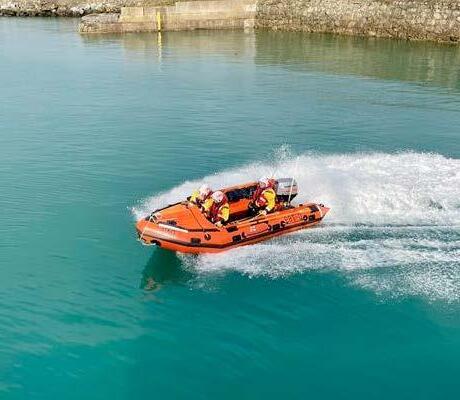



While much has changed in 200 years, two things have remained the same –the charity’s dependence on volunteers, who give their time and commitment to save others, and the voluntary contributions from the public which have funded the service for the past two centuries.
Jo Partner, RNLI Head of Region for Wales says: ‘I am immensely grateful to everyone who is involved with the charity across Wales – our volunteers, supporters and staff. Today is a hugely significant day in our history and an occasion we should all be very proud of. I know there are lots of events being planned across Wales to mark this very special day and I hope people enjoy being part of this special piece of history.

‘Hillary’s vision was ambitious and forwardthinking, and no doubt he would be extremely proud to see the charity he founded still going strong today, and to see how much it has achieved.’
The charity has a history of innovation, and adapting to challenging circumstances, such as:

‘I would like to take this opportunity to say thank you to all those who play a part in making the RNLI the proud organisation is it today – which really is a cause for celebration.’
RNLI Heritage Archive and Research Manager, Hayley Whiting, says: ‘The RNLI’s founder, Sir William Hillary, witnessed the treacherous nature of the sea first-hand when living on the Isle of Man and he wanted to take action. His first appeal to the nation in 1823 did not have the desired result but, thankfully, he persevered and gained the support of several philanthropic members of society, who put their names to the charity at a meeting in the City of London Tavern on 4 March 1824.
‘Twelve resolutions were passed at that meeting, the core of which still stand as part of the RNLI’s Charter 200 years later. This shows how the RNLI’s values and purpose have remained unwavering for 200 years, despite the social and economic changes and challenges of the past two centuries.
Lifejackets: In 1861, Whitby lifeboat crew launched six times to rescue stricken vessels in a storm, but on their sixth launch a freak wave capsized the lifeboat and all but one of the crew were lost. The sole survivor was Henry Freeman, who survived because he was wearing a new design of cork lifejacket. After this event, the cork lifejacket became more widely adopted by lifeboat crews.
Fundraising: In 1886, 27 lifeboat crew members from Southport and St Annes lost their lives while trying to rescue the crew of the Mexico. A public appeal was launched, driven by local man Charles Macara. An 1891 appeal raised £10,000 in two weeks. On 1 October, Charles and his wife Marion organised the first Lifeboat Saturday. Bands, floats and lifeboats paraded through the streets of Manchester, followed by volunteers collecting money. More than £5,000 was taken on the day, which was the first recorded example of a charity street collection.
Lifeboats: In 1914, over 140 people were saved when the hospital steamship Rohilla was wrecked. The ship had been en route to Dunkirk to help wounded soldiers but was broken up when it ran aground on rocks near Whitby. Five lifeboats battled terrible seas to reach the ship. A motor lifeboat (the first of its kind) from Tynemouth, took the last 50 people on board. In total, 144 people were saved by the crews, who worked for over 50 hours in atrocious conditions. The motor lifeboat proved its capabilities and became more widely accepted by lifeboat crews after this event.
Wartime: When the First World War broke out, many lifeboat volunteers were called away to fight. The average age of lifeboat crews at home increased to over 50. During 1914-18, RNLI lifeboats launched 1,808 times, saving 5,332 lives. In 1939, young lifeboat volunteers were called away again to war. By the end of the Second World War, RNLI crews had saved 6,376 lives around the coasts of Britain and Ireland.
In 1940, 19 RNLI lifeboats were used to evacuate troops from Dunkirk. Two had RNLI crews onboard, while the others were crewed by the Royal Navy. The lifeboats and their stand-in crews saved thousands of lives while being shelled and bombed for days.
Throughout its bicentenary year, the charity is running events and activities to remember its important history and celebrate the modern lifesaving service it is today, while hoping to inspire generations of future lifesavers and supporters.
A Service of Thanksgiving to mark 200 years of the RNLI will take place at Westminster Abbey on 4 March 2024 at 11.30am. It will be attended by representatives from RNLI lifesaving communities around the UK and Ireland.


As the Royal National Lifeboat Institution (RNLI) celebrated its 200th anniversary (4 March), the charity brought some of its rich history to life with the release of a stunning collection of colourised images including a 20th century photo of crew from St Davids.
One of the images included in the colourised collection is from St Davids Lifeboat Station in west Wales. The station is situated at St Justinians nearby to St Davids, the smallest city in the United Kingdom. The lifeboat station was established in 1869 at the request of the local community.
Not often obvious in the old black and white photographs, lifeboat crews would traditionally wear red hats. In the picture from St Davids, the colour brings the vibrant red out as the crew walk up from the boathouse with the Welsh coastline in the background.
The crew in the 1960s image are also wearing traditional RNLI Guernseys, (sometimes called a Gansey) a woollen jumper with a simple red ‘RNLI’ embroidered on the front – something today’s lifeboat crews still wear for ceremonial duties.
From community events to candid snapshots, the full collection of 11 black and white images have been painstakingly cleaned and colourised with folds,

scratches and dust removed using digital technology to shine new light on 200 years of saving lives at sea.
The striking images from across the UK and Ireland include courageous lifeboat crews, early fundraising street collections, and iconic scenes of close-knit communities coming together to launch and recover lifeboats.
RNLI Heritage and Archive Research Manager Hayley Whiting said: ‘The carefully coloured images illustrate just a few highlights of the incredible history of lifesaving over the previous two centuries, where over 144,000 lives have been saved to date.
‘To see the crew of St Davids lifeboat walking up from the boathouse wearing their traditional red hats, the yellow sou’westers of the children fundraising or the vibrant blue sea off the Isle of Man, the reworked images really do bring a different perspective on some of our archived pictures.
‘Each image has been brought to life by our own in-house creative team with hours spent on attention to detail, along with research being undertaken to ensure each one gave a true, lifelike representation.’





SIR WILLIAM HILLARY’S vision for a service dedicated to saving lives at sea became a reality in Bishopsgate’s trendy City of London Tavern on 4 March 1824. Sir William Hillary’s vision for a service dedicated to saving lives at sea became a reality in Bishopsgate’s trendy City of London Tavern on 4 March 1824.
Living in Douglas on the Isle of Man, Hillary saw the treacherous nature of the sea first-hand. He witnessed dozens of shipwrecks around the Manx coast and saved many lives with the help of locals.
In the early 19th century there was an average of 1,800 shipwrecks a year around our coasts. And the danger of shipwreck was an accepted way of life at sea.
But Hillary refused to sit by and watch people drown.
A year earlier on 28 February 1823, Sir William Hillary made an impassioned appeal to the nation. He published a pamphlet detailing his plans for a lifeboat service manned by trained crews for all of the UK and Ireland.
He sent the pamphlet to the British Navy, ministers and prominent citizens, appealing for the formation of a National Institution for the Preservation of Lives and Property from Shipwreck.
At the heart of this institution would be ‘a large body of men … in constant readiness to risk their own lives for the preservation of those whom they have never known or seen, perhaps of another nation, merely because they are fellow creatures in extreme peril.’
The priorities of the institution would be ‘first, the preservation of human life from shipwreck …, secondly (provide) assistance to vessels in distress …, thirdly the preservation of vessels and property …, fourthly the prevention of plunder and depredations in case of shipwreck, fifthly the succour and support of those persons who may be rescued …, sixthly the bestowing of suitable rewards on those who rescue the lives of others from shipwreck or who assist vessels in distress …’
But Hillary’s noble idea fell on deaf ears –the Admiralty refused to help.
Sir William Hillary didn’t give up. Instead he rebranded his appeal for the more philanthropic members of London society. And this time it worked.
The idea caught the eye of Thomas Wilson, energetic Liberal MP for Southwark,



and shipping magnate George Hibbert, Whig MP for Seaford and Chairman of the West Indies Merchants.
Despite some personal differences, the three men became a formidable force and the campaign rapidly gathered momentum.
An interim committee was appointed while plans were made for a public meeting.
More and more benefactors came onboard, inspired by the committee’s rigorous face-to-face lobbying and advertising of the public meeting.
King George lV assured royal patronage and the Prime Minister Robert Jenkinson, 2nd Earl of Liverpool, agreed to be President.
Praised as the ‘Father of the Institution’, it was a landmark moment for Sir William Hillary, whose vision had finally become a reality.
King George lV graciously granted the Royal prefix to the Institution’s name, making it the Royal National Institution for the Preservation of Life from Shipwreck.
Two months later, Sir William Hillary wrote:
‘ … this Institution has been [honoured] by the high patronage of the King … sanctioned by many of the most distinguished characters in the church and state, and sustained by the bounty of a generous nation …
‘It only remains for me to express the heartfelt satisfaction … that this Institution is now established on principles which will extend its beneficial effects to the most distant shores, and to generations yet unborn.’
On 5 October 1854, the Institution’s name was changed to the Royal National Lifeboat Institution – the RNLI – as we are known today.





ACROSS just two movies, the world of Ghostbusters established an impressive array of ghouls – not just your standard ghosts, but other kinds of monsters too.
You have Gozer and the Terror Dogs, the giant Stay-Puft marshmallow man, ectoplasmic entities like Slimer, and the haunting Vigo the Carpathian. And now, in Ghostbusters: Frozen Empire, there’ll be a fresh array of spectral beings to add to that roster – for instance, a creature known as the Sewer Dragon and there’s also a mysterious horned beastie hiding in the mist as the Death Chill spreads across New York City.
The creatures of Frozen Empire actually take influence from a different kind of Ghostbusters adventure –specifically, late ‘80s animated series The Real Ghostbusters, with its “wild, original and weird-as-fuck villains,” says director Gil Kenan. It’s a show that unleashed such oddities as a werechicken, a boogeyman, and an alternate reality with ‘Peoplebusters’. “We wanted to bring that show’s looseness and fearlessness to this movie,” Kenan notes. “I think it’s going to surprise people just how big this film is.”
That’s not the only flavour in the mix for the Afterlife sequel. “John Hughes was a big touchstone,” notes co-writer and producer Jason Reitman. “That thing of a family in a station wagon, living in a crumbling home, the teenagers kicking back against their parents. [Finn Wolfhard’s] Trevor’s 18 now, so he’s like, ‘I’m an adult!’” There’s even a bit of Wes

Anderson in there somewhere, too. “We wanted that Royal Tenenbaums thing of a family living on top of each other… but in the Ghostbusters’ Firehouse,” chuckles Reitman. “We see the Firehouse way more than in any previous Ghostbusters film. What’s it like to sleep there, do laundry there? What’s the attic like?” Prepare for the wildest Ghostbusters adventure yet.
Ghostbusters: Frozen Empire comes to UK cinemas from 22 March.

Friday March 8th 2024

RENEGADE NELL, Sally Wainwright’s highly anticipated fantasy drama, is on the verge of its debut, with Disney Plus recently confirming its release date through a thrilling teaser trailer.
Starring Louisa Harland from Derry Girls in the lead role, the series revolves around a woman framed for murder who unexpectedly transforms into a notorious outlaw.
The intriguing twist comes with the intervention of a mystical spirit, the fairylike Billy Blind, portrayed by Nick Mohammed from Ted Lasso. Billy Blind empowers Nell with formidable fighting skills whenever she faces adversity.
The narrative unfolds around a quick-witted and courageous young woman navigating 18th Century England, framed for murder and inadvertently becoming
the most infamous highwaywoman.
According to Disney’s synopsis, as Nell delves deeper into her predicament, she discovers a perilous secret, potentially tied to her chief adversary, the scheming Earl of Poynton.
Adrian Lester, a star in the series, shared his perspective, describing Renegade Nell as a departure from Sally Wainwright’s previous works, blending political intrigue, magic, sprites, intense combat, highway robbery, and the backdrop of Regency England. Lester expressed his enjoyment portraying a morally ambiguous character in this unique and captivating storyline.
Previously known as The Ballad of Renegade Nell, the complete series, crafted by the talented Sally Wainwright of Happy Valley fame, is set

to premiere on Disney Plus on Friday, March 29, 2024. Unlike a traditional weekly release, all episodes will be available simultaneously for viewers to enjoy as a bingeable box set.
The production of Renegade Nell spanned nine months, commencing in July 2022,
and showcased diverse UK locations, including Oxford, England. The series promises a blend of fantasy, drama, and historical intrigue, making it a must-watch for fans of Wainwright’s storytelling prowess. Stay tuned for a captivating journey into Nell’s world of mystery, magic, and rebellion.

GET READY to immerse yourself in the next big TV sensation as Apple TV+ unveils the captivating world of “Palm Royale.”
Having teased us with mesmerising visuals and an ensemble cast featuring Kristen Wiig and Laura Dern, the trailer is nothing short of spectacular, leaving us eager for more. If you’ve been yearning for the allure of “Mad Men” with a comedic twist, then “Palm Royale” might just be the show you’ve been waiting
for. Dive into the details below to get the scoop on this exciting new series. Mark your calendars for March 20, 2024, as the first three episodes of “Palm Royale” are set to premiere on Apple TV+, with subsequent episodes airing every Wednesday until May 8. The series, loosely based on Juliet McDaniel’s novel “Mr. and Mrs. American Pie,” follows the journey of Maxine Simmons (played by Wiig) as she navigates the high society of Palm Beach in the tumultuous
year of 1969. Behind the scenes, Wiig and Dern take on dual roles as executive producers, alongside the talented writer Abe Sylvia, known for his work on “Dead to Me” and “The Affair.” Sylvia, who also serves as the showrunner, shares directing duties with a stellar team including Tate Taylor, Claire Scanlon, and Stephanie Laing. With such a powerhouse lineup, “Palm Royale” promises to deliver a
compelling and visually stunning narrative.
The star-studded ensemble cast further adds to the anticipation, featuring not only Wiig and Dern but also Allison Janney, Ricky Martin, Kaia Gerber, Josh Lucas, Leslie Bibb, Amber Chardae Robinson, and Mindy Cohn. The excitement doesn’t stop there, as living legend Carol Burnett and Bruce Dern, Laura Dern’s father, will make “extra special” guest appearances, adding an extra layer of intrigue to the series.
So, gear up for a journey back in time to the glamour and drama of 1969 with “Palm Royale.” With a perfect blend of humor and sophistication, this series is poised to become your new TV obsession. Don’t miss out on the premiere – it’s an event you won’t want to skip!




In the expansive realm of true crime documentaries, it’s high time we carve out a distinct category— ’What Happens When Only Women Are in Danger.’
This classification, while potentially covering a significant portion of the genre, serves as a call to action against the sociocultural, legal, and police indifference towards women’s vulnerabilities, experiences, and even the gravest harms, such as murder. Perhaps it’s time to embrace the repeated use of this descriptor to underscore the urgency of addressing these critical issues.
Within this newly defined category falls “Can I Tell You a Secret?,” Netflix’s latest true crime production in collaboration with Louis Theroux’s Mindhouse and the Guardian. This gripping narrative unravels the chilling tale of cyberstalker Matthew Hardy, who inflicted terror upon multiple women over an extended period. Initially brought to light in a comprehensive piece by Sirin Kale in G2 and later explored in a sixpart Guardian podcast series in 2022, Hardy eventually faced the longest sentence ever handed down in the UK for online stalking—nine years.
The two-part documentary delves into the lives of three women— Abby, Zoe, and Lia— whom Hardy relentlessly

targeted. Initially confident and happy, these women, with strong online presences, found themselves entangled with a confiding stranger who often used the titular line of the series. As suspicions grew and communication ceased, Hardy’s harassment escalated. Using fake profiles, he posed as these women to disseminate explicit content and sow discord among their social circles. The direct contact between Hardy and his targets turned increasingly vicious and threatening.
When the women sought help from their local police forces, the disheartening pattern repeated itself— dismissal, denial, and victim-blaming. However, PC Kevin Anderson eventually took the matter seriously, unraveling
Hardy’s extensive history of cyberstalking since his teenage years. The documentary adeptly navigates the complexities of the case, shedding light on the breadth of Hardy’s devastating actions without glorifying him— an all-too-common pitfall in many true crime documentaries.
The documentary skillfully utilises dramatisations and voice distortion equipment to recreate Hardy’s chilling written communications with his victims, emphasising the relentless and effortless nature of the cyber threats. The representation of telegraph wires lighting up above houses may seem gimmicky to some, but to this journalist, it perfectly captures the insidious terror experienced by
victims—a terror induced not only by the threat of physical violence but also by the profound psychological harm already inflicted. This pervasive fear stems from the realisation of powerlessness against those who harbour hatred and are enabled by both societal indifference and a technology that remains unchecked.
In a landscape dominated by true crime narratives, “Can I Tell You a Secret?” stands out for its ability to highlight the horrors faced by women, prompting reflection on the urgent need for societal and technological change. After all, a documentary’s impact should be measured by the lasting impression of the victims rather than the notoriety of the perpetrator.

Friday March 1st 2024
Cadw has published its events schedule for the Easter holidays, inviting families and history lovers alike to come together and experience the beauty of Wales’ historic landmarks.
From enchanting Easter trails to majestic tales, there’s something in the programme for everyone to enjoy.
For a full list of events over the Easter break and any ticket and booking information, visit Cadw’s website: https://cadw.gov. wales/visit/whats-on/finda-cadw-event.
Read on for a selection of the best events happening at Cadw locations across west Wales this Easter:
Scrambled Eggs! (St Davids Bishop’s Palace)
Solve the Easter puzzle in the sacred confines of St Davids Bishop’s Palace, searching through the majestic Great Hall, enchanting courtyard and the hallowed chapel for hidden clues. This egg-hunting experience

doesn’t stop there, with the final task being to unscramble the letters collected along the quest and solve this Easter mystery.
Event info:
Saturday 30th
March, Sunday 31st
March & Monday 1st April, 10:00 – 16:00
Carmarthenshire Falconry (Kidwelly Castle)
See the magnificent birds of prey at Kidwelly Castle’s falconry events and discover how they
were used during the Medieval times to hunt for food. Conserving this ancient activity is at the heart of Kidwelly’s Easter activities, so visitors can relish the opportunity to join this hands-on experience with these
incredible birds and discover the connection between history and nature like never before.
Event info:
Sunday 31st
March & Monday 1st
April, 11:00 – 16:00
Easter Egg Hunts
(multiple locations)
Easter Egg hunts are available throughout the period at multiple Cadw locations across west Wales, including: St Davids Bishop’s Palace, Laugharne Castle, and Cilgerran Castle.
Whether you’re an adventurous spirit seeking excitement, a history enthusiast wanting to explore, or a family looking to create cherished moments together, Cadw’s events promise to cater to every taste.
For those looking to take advantage of the events available during the Easter holidays, Cadw membership offers free event entry and unlimited access to over 130 historic places across Wales, offering a unique way to explore Wales’ rich heritage.
There are over 130 historic places to visit and 1,000 reasons for us all to become a Cadw member. Find out more at https:// www.cadwmembership. service.gov.wales/

MULTI awardnominated Immersion Theatre brings its trademark energy to its biggest, funniest, and most spectacular family musical to date: Alice in Wonderland. From the team behind last year’s smash hit “The Jungle Book” – be prepared to be amazed and delighted
with this glorious, magical family show at the Torch Theatre this April!
Based on the classic children’s book by Lewis Carroll, follow Alice and the White Rabbit as they set off on a colourful, topsy-turvy adventure and meet a host of outlandish characters including
Tweedle Dum and Tweedle Dee, the Queen of Hearts, the Cheshire cat and of course, the Madas a bat-Hatter! The wellloved characters will all make an appearance and will take you on a colourful journey to a land of fantasy where your imagination can run wild.
Immersion Theatre is
based in London and will tour Alice in Wonderland all over the UK during 2024. The company’s initial creations saw them producing a great deal of unflinching and unapologetic drama in a variety of Off-West End venues where their distinctive concepts and fearless re-workings of predominantly classic
texts quickly earned them a reputation as one of the city’s most exciting and innovative theatre companies.
Children and adults alike are invited to join in the hilarity of seeing this classic story brought vividly to life in a show packed with comedy, music, audience interaction, and fun for the whole family!
You’d be MAD to miss it! Alice in Wonderland will be performed at the Torch Theatre on Thursday 4 April at 2pm and 5pm Suitable for ages 4+.
Ticket prices: Family £48. Adult: £14 and Child: £12. For tickets phone the Box Office on 01646 695267 or visit torchtheatre.co.uk.




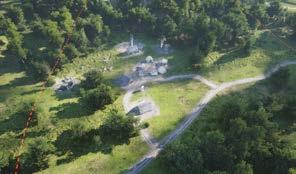
ALRIGHT, so, a couple of moons back, Manor Lords waltzed onto the scene, flaunting this majestic blend of Crusader Kingsesque simulation, a dash of Ages of Empires-style city-building, and some grandiose Total War-esque battles. Picture it – a medieval strategy game cooked up by a lone wolf, and lo and behold, it skyrocketed up the Steam charts, becoming one of the most wishlisted games in the realm.
Fast forward a bit, and here we are, getting another glimpse of Manor Lords in the Xbox Partner Preview shindig. It spills the beans on even more of its audacious gameplay and, brace yourselves, drops a release date bomb.
Now, imagine donning the leather boots of a ruler, overseeing your 14th-century lands. Bandit attacks? Check. An illegitimate baron scheming to snatch control of the northern territories? Double check. It’s a whole medieval soap opera.
Feeling a bit Age of Empires
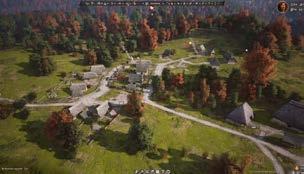
déjà vu? That’s because Manor Lords lets you craft your settlement with buildings, bossing around your peasant villagers – you know, the real MVPs – to do tasks like chopping trees, growing veggies, and rearing animals. Classic medieval micromanagement. But hold on, there’s a dollop of historical realism here. Manor Lords is all about following the historical burgage plot system, which basically means you’re a medieval landlord leasing homes to folks who cough up taxes to live there. Homes expand, seasons change, and the soil gets all fertile and stuff. It’s like medieval SimCity, but with more drama.
Now, if the intricate historical simulation vibes sound more like Crusader Kings, that’s your second big clue. Apart from playing mayor, you’re also juggling policies, doing the whole diplomacy dance with fellow lords – you know, the buttering up routine or just straight-up threatening them into submission. It’s a tech tree party, where your ruling

style clashes or harmonizes with rival lords’ ambitions.
And when all else fails, the real-time battles kick in, a tactical ballet reminiscent of the Total War series. Soldiers decked out, weather factored in, terrain considered – it’s like planning a medieval picnic but with armies. Every soldier lost is a villager gone, so victories can be a pricey affair.
Now, this game, my friends, is a wild ride, especially considering it’s the brainchild of a solo developer going by the name Slavic Magic. No wonder it’s nestled comfortably among the most-wishlisted games on Steam for 2023.
But wait, there’s more! April 24th, mark that date on your digital calendar. Manor Lords is strutting onto Steam, and guess what? It’s also hitting up PC Game Pass, letting subscribers dive into the medieval madness for free. It’s like the gaming universe just threw a big ol’ feast, and Manor Lords is the main course. Bon appétit, gamers!

ARIES
You may get the idea to broaden your intellect and spirituality through education. If you have young children on spring break, you’ll be pleasantly surprised to discover the joys of spending time with them.
TAURUS
This is a good week to apply for a loan or renegotiate your mortgage. You’ll find a lasting solution to your financial problems without sacrificing your comfort. You’ll be able to smile and enjoy life once again.
GEMINI
You’ll have a heavy workload this week due to many clients, all of whom will turn out to be very lucrative. If you’re single, you could meet your soulmate at an event with friends.
CANCER
Take the time you need to think about certain projects. Carefully verify the details and negotiate beneficial terms. In your relationship, small gestures will positively impact harmony and intimacy.
LEO
Moving requires meticulous planning. You must take the first steps and assess the work required. You’ll feel a special pride in arranging your space to your liking, both at work and at home.
VIRGO
You must prioritize your health this week. You’ll start a new diet that will improve your quality of life and boost your self-esteem. Your perseverance and commitment to yourself will pay off and your achievements will be the proof.
LIBRA
Critical minds are gravitating around you. You’ll need to develop solid arguments to confront them. You could set yourself apart by clearly expressing what others are thinking in online forums.
SCORPIO
You could receive an unexpected amount of money, a refund or an adjustment of some kind. In your relationship, you could be made to wait or postpone a date you were excited about.
SAGITTARIUS
Don’t rush into any decisions, especially when it comes to money or relationships. As you contemplate new beginnings, various elements will slow your progress, teaching you the value of patience.
CAPRICORN
You may start questioning your career or love life. You’ll think about making changes. You have a yearning for a better quality of life, which will become stronger. This will encourage you to make room for it.
AQUARIUS
This week will be marked by a major clean-up, whether at home or work. An orderly environment will help you clear your mind. Family and good friends will lend you a helping hand, earning your eternal gratitude.
PISCES
If you’re still trying to set your career path, you could have an epiphany which could prompt you to take on a new challenge in line with your aspirations. Change brings abundance. Keep the door open to new opportunities.

AR Ddydd Gŵyl Dewi, mae Gweinidog y Gymraeg ac Addysg, Jeremy Miles, wedi lansio cynllun Llysgenhadon Diwylliannol er mwyn hyrwyddo’r Gymraeg a diwylliant a threftadaeth Cymru.
Rôl y rhwydwaith o Lysgenhadon Diwylliannol yw cefnogi pobl sy’n ymgartrefu yn ein cymunedau ledled Cymru i ddysgu mwy am Gymru, yr iaith a’i phwysigrwydd i’r gymuned, rhoi cefnogaeth ac arweiniad i fusnesau ddefnyddio a hyrwyddo’r Gymraeg, a gweithio’n lleol i gynnal a chryfhau rhwydweithiau cymdeithasol.
Gall unrhyw berson neu fusnes wirfoddoli i ddod yn llysgennad a hynny drwy gwblau modiwlau rhyngweithiol byr am hanes y Gymraeg a’i sefyllfa heddiw. Ar ôl cwblhau’r modiwlau ar wefan Llysgennad Cymru, mae’r gwirfoddolwyr yn derbyn tystysgrif, bathodyn, sticer ffenest, a phecyn gwybodaeth am y gefnogaeth sydd ar gael
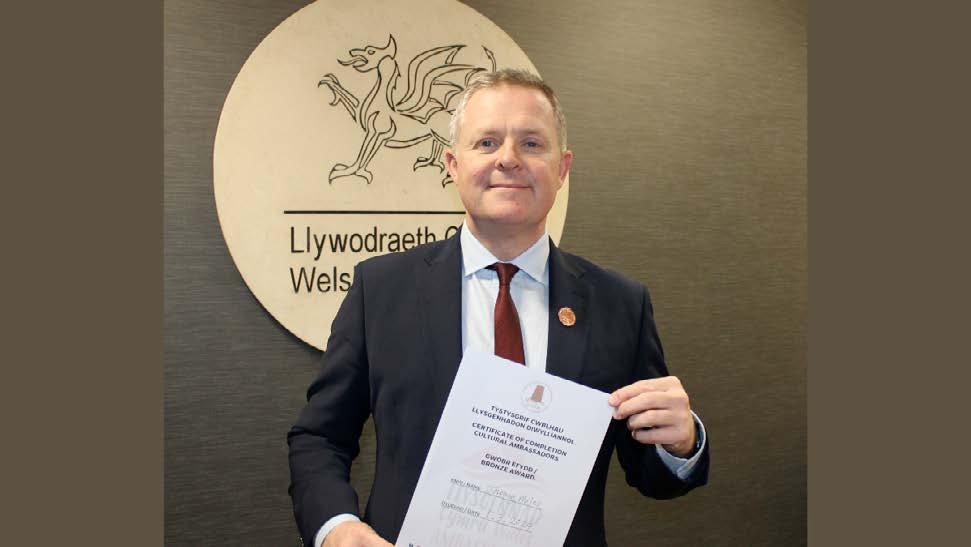
fel gwasanaeth cyfieithu am ddim i gymunedau, unigolion a sefydliadau trydydd sector.
Gweinidog y Gymraeg ac Addysg, Jeremy Miles, yw’r unigolyn cyntaf i ddod yn y llysgennad diwylliannol. Wrth lansio’r cynllun heddiw, dywedodd:
“Rwy’n falch iawn o ddod yn Llysgennad Diwylliannol a lansio’r
cynllun ar Ddydd Gŵyl Dewi. ‘Gwnewch y pethau bychain’ oedd neges Dewi Sant, ac mae dod yn llysgennad yn ffordd syml ac ymarferol o gefnogi a hyrwyddo’r Gymraeg a’n diwylliant, helpu pobl i integreiddio i’w cymunedau newydd, croesawu ymwelwyr, a chodi ymwybyddiaeth o’n treftadaeth a’n diwylliant.
“Os ydych chi eisiau
cefnogi’r Gymraeg yn eich ardal chi, neu’n gwybod am rhywun delfrydol yn eich cymuned all ddod yn llysgennad, yna ewch amdani a lledaenwch y neges.”
Modiwlau lefel Efydd sy’n cael ei lansio heddiw. Bydd lefelau Arian ac Aur yn cael eu hychwanegu ar blatfform Llysgennad Cymru yn nes ymlaen yn y flwyddyn.
I ddysgu mwy am y cynllun a sut i ddod yn llysgennad, ewch i Cwrs Llysgenhadon Diwylliannol –Llysgenhadon Cymru (ambassador.wales)
Mae’r modiwlau Efydd yn cymryd tua 20 munud i’w cwblhau, a gall y llysgenhadon benderfynu beth fyddant yn ei wneud i gefnogi’r Gymraeg yn eu cymuned.
Mae Max Boyce
MBE wedi cytuno i ganu fersiwn newydd o’r gân enwog ‘Hymns and Arias’ cyn gêm
Pencampwriaeth
Chwe Gwlad Guinness
2024 rhwng Cymru
Ffrainc ar ddydd Sul.
Gofynnodd Undeb
Rygbi Cymru i Max ysgrifennu a pherfformio fersiwn newydd ac arbennig i ddathlu ei gân boblogaidd ‘Hymns and Arias’.
Mae Max Boyce eisoes wedi canu’r gân wreiddiol yn Stadiwm y Mileniwm, Stadiwm
Principality, Parc yr Arfau, ac yn Stadiwm Wembley hefyd.
Bydd yn canu’r fersiwn newydd gyda Chôr Llundain, Côr
Admiral a Band y Cymry
Brenhinol yn Stadiwm
Principality cyn y gic gyntaf ar ddiwrnod Sul y Mamau - sef y 10fed o Fawrth.
Mae Max yn cyfeirio at gennin pedr, Dulyn a
Dupont yn ei benillion newydd, ond mae’n cadw union eiriau’r gân yn gyfrinach hyd nes y diwrnod mawr ei hun, pan fydd 70,000 o gefnogwyr Cymru yn cael y fraint o’u clywed am y tro cyntaf.
Dywedodd Rheolwr Stadiwm Principality Mark Williams:”Rwy’n gobeithio y bydd yn ysbrydoli cefnogwyr angerddol Cymru yn union fel y gwnaed yn Wembley yn 1999,”
“Doedden ni ddim yn siwr os byddai Stadiwm Principality yn barod ar gyfer Cwpan Rygbi’r Byd yn 1999. ‘Roedd pethau’n barod – diolch i’r drefn ac ‘roedd Max yn rhan enfawr o’r seremoni agoriadol, felly rydym yn ofnadwy o hapus i’w groesawu nôl wrth i Stadiwm Principality agosau at fod yn 25 oed.”
Dywedodd Max Boyce, “Bydd hi’n

bleser enfawr canu gyda chefnogwyr rygbi gorau’r byd, yn y stadiwm orau.”
“Fe gymerodd hi sbel i mi ysgrifennu hwn ac ‘rwy’n gobeithio y bydd pawb yn mwynhau’r ferswin newydd. Mae gennym dîm ifanc a chyffrous ac ‘rwy’n edrych ymlaen yn fawr at
ddangos i’r chwaraewyr gymaint y maen nhw’n ei olygu i ni gyd.”
Bydd Max Boyce i’w glywed dros system sain newydd sbon y Stadiwm ac i’w weld ar y sgriniau mawr. Bydd yn canu wedi i’r chwaraewyr gynhesu – yn union cyn i’r anthemau gael eu canu.
O ganlyniad i’r
geiriau newydd ac amserol – mae’n bur debygol mai dyma fydd yr unig dro y bydd y fersiwn unigryw yma o ‘Hymns and Arias’ yn cael ei glywed. Mae’n bosibl o hyd i brynu nifer cyfyngedig o docynnau ar gyfer y gêm yma: www.wru. wales/tickets

CANOLFAN S4C
Yr Egin is looking forward to its Adventure Conference that is being held as part of the Adventure Film Festival at the centre in Carmarthen in March.
Following the success of Yr Egin’s Adventure Conference 2022 and another successful bid to the Coleg Cymraeg Cenedlaethol Collaborative Grants Fund, this year’s conference for Wales’ University and Further Education College students will deal with the main theme of responding to environmental sustainability for film and television and the challenges of climate change.
The aim of this one-day conference is to hold discussions, give examples, and respond to climate challenges when creating sustainable and cost-effective content giving students across the country the opportunity to discuss
and reflect on how to respond positively to the challenges in their college work and when they go into the world of work.
Ryan Chappell, S4C Diversity, Sustainability and Social Purposes Leader; Huw Erddyn from Cwmni Da and Elin Jones from Boom Cymru will be among those contributing their expertise; and there will be a special conversation with Mari Huws, a filmmaker now living and working as the Warden on Bardsey Island.
Llinos Jones, Canolfan S4C Yr Egin Project Engagement Officer, said:
“We’re really looking forward to bringing Higher Education students from a number of Welsh Universities together in person and on-line for the conference, which will be an opportunity for them learn from professionals from the sector as well as networking with each other. Nurturing talent and highlighting career
pathways is at the core of what we do here at Yr Egin and ensuring that future makers are considering climate challenges and creating sustainable content is extremely important to us at the centre. We are delighted to be able to offer this oneday conference and collaborate with the University, thanks to the Coleg Cymraeg Cenedlaethol.”
The Adventure conference aim is to close the gap between the industry and students with the focus on content with environmental themes and/or films about the natural world. A backdrop to all this will be Yr Egin Adventure Film Festival, with film showings, a high percentage of which were shot in Wales, as well as talks, discussions and workshops. The film festival is an opportunity to celebrate films and to consider the environmental impacts of production as well as opportunities to lessen the impact of
their production.
The conference was designed in collaboration between UWTSD, Aberystwyth, Bangor and Swansea Universities. Dr Geraint Ellis, Senior Lecturer in Media at Bangor University, said:
“Events like this conference are a wonderful opportunity for students to gain valuable advice from individuals working in the creative industries, and to make further contacts. It is also great to see education institutions across Wales collaborating like this, thanks to support from Coleg Cymraeg Cenedlaethol. As a former factual producer, I also believe that the documentary makers themselves benefit from the experience of reflecting on their work and sharing their experiences and ideas with a young audience.”
During the conference, a crucial element will be the networking among students with opportunities to talk,


consider, investigate and question in Welsh and gaining confidence.
The conference responds to the United Nations’ Sustainable Development Aims that call for action to deal with climate change and to protect our oceans and forests. Aim 13 – Climate Action emphasises the fundamental importance of environmental sustainability today. Environmental sustainability is still a challenging issue for an energy and travel intensive sector such as the film and television sector.
Ffion Hughes, Coleg Cymraeg Academic Manager, added:
“The Coleg Cymraeg Cenedlaethol is delighted to support a cross-discipline event that combines the media and environmental sustainability. Innovative work is being undertaken in both fields in Wales and it’s wonderful that students from different universities can benefit from the event.”








YOUNG dogs rescued from unscrupulous puppy traders as part of a major RSPCA investigation have found their forever homes.
Twenty-one dogs were seized by Gwent Police back in 2020 with some of those rescued found in poor health and were kept in inappropriate conditions. Another two were found at another property and were also in poor health.
The warrant formed part of Operation Earthled by RSPCA’s Special Operations Unit - which revealed £300,000 worth of dogs advertisedwith dogs and puppies being sold to members of the public under false pretences. Advertised as home bred, healthy, and a well socialised family pet - the puppies were in some cases bred in sheds, purchased from elsewhere and a number of them were imported.
The RSPCA found that the dogs and puppies that were sold with a variety of health concerns had been imported from Poland, Hungary, the Czech Republic and Ireland. It was also thought they were imported illegally due to the lack of passports and vaccinations.
The case concluded on Wednesday 21 February with six men imprisoned and were disqualified from keeping dogs for 15 years. Five women also received community orders and were disqualified from keeping dogs for 10 years.
The six men previously pleaded guilty to a fraud charge - and all 11 pleaded guilty to an offence under the Animal Welfare Act 2006.

Dottie (above), Stella and Penelope were
among the dogs rescued in this case and have now found their forever homes.
Dottie has been rehomed by Gwent police officer Bianca RobsonMallet, who was the officer in charge of the warrant, and also executed it on the day.
“This was my first animal welfare warrant I had done within my policing career and I had a massive interest in seeing it through because of my love towards animals,” said Bianca.
“I had taken an interest in what happened to the dogs once seized and what the rehoming process would be. When I was told it was as simple as being able to apply via fostering first and then a chance of adoption I jumped at it knowing I could give one of the dogs rescued a good home.”
Cockapoo crossbreed Dottie was around 12 weeks old when Bianca was able to pick her up from RSPCA Ashley Heath Animal Centre.
When she was found by rescuers she was in a penned area at the rear of a mobile home.
“She was so loving and had such a good temperament from the off,” said Bianca. “She never caused us any issues and fitted in perfectly. (left pictured on the day they picked up Dottie).
“She loves coastal walks, trips to the beach, and loves spending time with her bestie, my inlaws labradoodle.
“I feel so lucky to have given Dottie a loving and caring life.”
While Chihuahua Penelope was found in a cupboard in a caravan on the day of her rescue. Scared and frightened she came into the care



of the RSPCA. Rescuers noted she was “nervous” but in a “reasonable body condition”.
She was initially fostered for two years by Ann Hawkins - who has now officially become her owner.
Ann said: “Penelope is such a sweet little girl. She lives with two small other dogs, both rescued from the RSPCA. One is a boy chihuahua named Pepe and we refer to him and Penelope as ‘two peas in a pod’ because they are inseparable.
“The other is a female imperial shih-tzu named Pia and they too enjoy each other’s company. Penelope enjoys regular walks, playtime and finding a sunny spot to lay in. She loves cuddles and sleeps under the covers at bedtime. We are so lucky to share our lives

with her. I hope we make her just as happy as she makes us!”
Stella (pictured at the warrant and in her new home) was rehomed by former Gwent Police sergeant Kate Candy. Jack Russell Terrier/pug Stella was found roaming the site when Gwent Police and the RSPCA attended.
Kate said she immediately became one of the family. “Stella has settled in brilliantly with us and fits right in with our other dogs,” she said “She mostly just wants to be cuddled all the time!”
RSPCA special operations unit inspector Kirsty Withnall said: “The heartbreaking reality of puppy farming is that the welfare of the puppies comes second to making money.
“The sums of money involved are just eye-


watering; and it’s another reminder of how unscrupulous this trade can be; and how dangerous poor breeding and trading practices are for dogs, pups and unsuspecting consumers.
“It is so wonderful to see these dogs now in their forever homes.
Dottie, Stella and Penelope look so happy and thankfully their past will hopefully be a distant memory for them now.
“For anyone looking to buy a puppy, rather than adopt - we urge them to do their research, know the signs of an unscrupulous breeder and use tools such as the Puppy Contract to avoid becoming another victim of the puppy trade.”
The other dogs in this case have been happily rehomed, or are currently with foster carers.





A group of industry experts met for the first time in Aberystwyth this week since being appointed as members of a new Sustainable Innovation and Research Working Group.
Twelve individuals have been selected, with the aim of supporting and guiding Hybu Cig Cymru – Meat Promotion Wales (HCC) on areas of innovation, research and development in relation to the sustainability of the Welsh red meat sector.
Chaired by HCC Board Member and beef and sheep farmer, Emlyn Roberts, the group’s expertise ranges from grassland, soil health and biodiversity to livestock systems, animal health and genetics alongside experience of sustainable supply chains.
Their duties will include upholding a holistic approach to sustainability for all aspects of red meat production in Wales; sharing information on new developments, activities and research;
horizon scanning the sustainability agenda; and advising on potential suitable strategic collaborations.
HCC’s Head of Sustainability and Future Policy, Rachael Madeley Davies, who attended the first meeting on 27 February, said: “HCC is committed to reducing the impact of Welsh red meat production and processing on the climate, the environment and waste. Another priority is to contribute towards improving the profitability and sustainability of the industry here in Wales. With that in mind, this new group has been put in place to support the delivery of our strategic ‘Vision 2025’ document which outlines the key priorities, opportunities and challenges for the red meat sector.
“We got off to a great start with a very positive meeting. The members engaged in enthusiastic discussion about the sustainability of the sector, and shared constructive thoughts and ideas on how it can be enhanced to safeguard its future.

This conversation will continue within HCC and we look forward to working with the group over the coming months.”
The Working Group members are:
• Arfon Williams, RSPB
• Charles Bowyer, AgriEPI Centre
• Claire Jones, WVSC
• Dr Christina Marley, IBERS
• Dr Julie Finch, Kepak
• Dr Nicola Lambe, SRUC
• Dr Prysor Williams, Bangor University
• Dr Sarah Morgan, Harper Adams University
• Emlyn Roberts, HCC
Board (Working Group Chair)
• Leisia Tudor, Dunbia
• Professor Mike Humphreys, HCC Board
• Neil Howard, independent
• Neil Shand, NBA
• Steven Williams, Food Technology Centre

FARMERS are testing if a selective approach to tillage can help them grow maize productively while reducing costs and environmental impacts, in two field labs with Innovative Farmers.
In the UK, maize is typically a plough-dependent crop as it needs a fine seed bed to establish and is easily outcompeted in its early growth stage. But this heavy ploughing can lead to degraded and compacted soils that risk polluting rivers via run-off.
Working with the Farm Net Zero project in Cornwall, farmers are leading an Innovative Farmers field lab testing a strip-till approach, where the top layer of soil is disturbed in strips, rather than full immersion ploughing of the entire field.
So far, this approach has not negatively impacted yields, even having a positive impact in some cases, while reducing fuel and machinery costs, and boosting soil health.
Boost for yields, crop quality and nature
Cornish arable farmer Malcolm Barrett trialled two different types of strip-till drill, which he compared to a control of disc cultivation – a min till technique he had already found to be a better approach for his soils.
He saw equal or increased yields from using the strip drill, and he also trialled direct drilling with no soil disturbance which saw a small yield reduction.
But Barrett also found the nutritional quality of his maize improved along with his soil structure, and he was able to save fuel costs on establishment.
He said: “The difference we can see in the soil in the last two years since we started a min till approach is phenomenal. The cattle aren’t poaching the fields, we can drive our machinery across the soil without it sinking, and the number of worms we’ve now got is unbelievable. The first thing you notice when you walk the field is the worm holes, and how the water is being absorbed into the soil instead of sitting on top.
“Where we have seen slight reductions in yield it’s been offset by reducing our establishment costs, and some of the losses are due to where we didn’t get our machinery to line up properly. A lot of this is just about experimenting and learning the best approach to get the best result.
“It’s been a real change in mindset to get off the treadmill. We used to take our soils for granted whereas now I call myself
a livestock farmer because there’s livestock that live in the ground and we need to look after them as much as the ones above the ground.”
Barrett added he is interested to see how his customer’s milk yields could be impacted by nutritional improvements in the maize crop.
The next step on from measuring yields will be to test soil samples for soil carbon and organic matter –and the farmers are hopeful for good results from the observations they have made.
Carbon benefits and living mulch potential
Devon farmer Andy Gray is working on a separate field lab also testing strip-till, but while growing a permanent living understory of clover.
He said this practice is commonplace in Switzerland as a method of preventing run-off into rivers resulting from growing maize.
Gray hopes the clover will maintain cover for the soil and roots to anchor it, while feeding the soil biology from October until the maize is established.
Clover may also suppress weeds and fix nitrogen, reducing the need for inputs.
Although he is trialling a slow growing clover, it could compete with maize for water

and light so he will compare methods of supressing it using glyphosate and sheep grazing.
Clover was established last year using an interrow drill into growing maize –providing winter soil cover post-harvest – and Gray will then strip-till ahead of precision drilling maize this Spring.
He said: “Maize produces enormous amounts of carbon for soils if you grow it well, but if you’re destroying your soil structure every year then you’re letting all that benefit out again.
“With a living mulch we should be able to get combined soil health benefits through continuous cover
and maize’s extraordinary ability to photosynthesis during the summer months.
“I’m determined this approach will work, but it’s a long-term way of thinking to deliver a financially sustainable system. I’m willing to put up with a yield penalty initially if I can see that in the long term I’m building the asset value of my farm – my soil.
“To me it’s a no brainer, we just have to find a way to make it work profitably.”
Gray also believes the clover choice could be critical and this could be a long trial if he needs to change variety.
But he hopes to benefit from the new Sustainable
Incentive options for cover cropping and companion cropping.
Innovative Farmers arable advisor Jerry Alford said: “Maize can be a useful crop but there are multiple challenges in growing it in a nature-friendly way. These two field labs are seeking to tackle similar issues in different ways so the combined results of both will help to provide practical insights to any farmer, showing the vital role of farmer-led research.”
Both trials are open for new farmers. To get involved and for open-source information on all field labs, visit innovativefarmers.org.


Inside and outside the Senedd
The Senedd last week witnessed the strong feeling of unity, friendship and community apparent to all who attended the protest. We must thank the organisers for creating an event that gave hope in a period of uncertainty.
Which other industry could have pulled off a gathering of over 3000 people within a few days?
It was an impressive site.
In an era where we know that rural people are finding things tough working in isolation during harsh weather conditions and financial strains, some within the industry have stated that the recent high profile status of the Sustainable Farming Scheme (SFS) is feeding people’s anxiety. At such a time the awareness of mental health issues and well-being of each other is fundamentally important.
We know that there are many charitable organisations that do amazing work in supporting farmers and the wider rural community including Tir Dewi, The DPJ Foundation, RABI and The Samaritans, to name but a few. The lambing season has begun in earnest now, and long hours with physical work add to the stress and strain on our farm workers. So a simple message, keep an eye on your loved ones and your neighbours this spring.
The debates and votes within the Senedd building following the huge gathering last week came as a disappointment to many travelling home on those buses. The Welsh Conservatives motion called on the Welsh Government to scrap the current sustainable farming scheme proposals and re-engage with the farming sector to develop a new scheme that has the support of the farming community. It was rejected.
The second motion on bovine TB, tabled by Plaid Cymru, called on the Welsh Government to urgently undertake a long-term evaluation and appraisal of current cattle controls to determine their relative effectiveness in preventing and controlling disease transmission. Additionally the motion also asked for immediate
changes to on-farm slaughter policy and establish policies which reflect wildlife as a source of infection. Again, it was rejected.
Speaking in response to the debates, FUW President Ian Rickman said that despite our presence and the very real frustrations of the farming community that have been demonstrated at protests across Wales over recent weeks, the Senedd votes reflected party political priorities rather than any real consideration of the facts.
This is history repeating itself since two years ago Plaid Cymru’s motion to annul the Control of Agricultural Pollution ‘NVZ’ regulations was lost by 30 votes to 27 despite the regulations repeatedly being referred to ‘as a hammer to crack a nut.’
Following recent meetings with both farming unions and other farming representatives the First Minister and Minister for Rural Affairs issued a joint statement outlining the next steps in relation to the SFS. There were also some comments made by the Government around the issue of bovine TB and the ‘NVZ’ regulations but no clear way forward has emerged on either of these two issues.
While it’s positive to see that at least some changes are now being considered in relation to the SFS it is truly disheartening to think it has taken thousands of us standing on the steps of the Senedd for the Welsh Government to acknowledge the severity of the situation. Issuing a rather bland statement which doesn’t come close to addressing our concerns, adds to the resentment felt.
Should you be reading this column on Thursday, the seventh of March, then please note that this is the day that ALL responses to the Welsh Government’s consultation need to be returned. We have been on a long journey with these SFS proposals within the FUW and it’s our job to ensure Wales’ agricultural sector and our family farms receive the consideration and respect they deserve.

NFU Cymru Livestock Board met recently to discuss in detail Welsh Government’s third and final consultation on the Sustainable Farming Scheme (SFS).
Rob Lewis, Chairman of NFU Cymru’s Livestock Board, a beef and lamb producer from Rhayader, said: “In a recent article in the Grocer Magazine, it was pleasing to see a quote by Minister Lesley Griffiths that said ‘The most recent figures show food and drink exports from Wales have grown by almost 25% in recent years, so there is clearly an appetite for Welsh brands beyond its borders’.
“We very much share these views and from our own sector, PGI Welsh Lamb and Beef exports are worth around £250m to the economy of Wales. We have a global reputation for quality, and we have an ambition to grow both volume and value of high quality, climate friendly PGI Welsh Lamb and Beef in both current and new export markets across the
globe. “Evidence from HCC’s The Welsh Way research shows that our red meat production is amongst the most sustainable to the world, with our beef production systems at about 40% of the global average in terms of greenhouse gas emissions and our lamb production systems amongst the lowest of all international studies in terms of emissions. With the right support we can continue to be global leaders in the production of climate friendly red meat delivering jobs, growth and investment to Wales.
“What is a major worry for the beef and sheep producers of Wales, is Welsh Government’s current proposals set out in the SFS consultation along with its associated published impact assessment, which suggests we could see a reduction of 122,000 livestock units across Wales in the next five years. This equates to 800,000 sheep from a total flock of 4.8 million breeding ewes or 122,000 adult beef cattle. Not only
would this impact on the bottom line of thousands of farm businesses but the effects would impact the whole of the Welsh rural economy.
“Welsh Government’s own economic appraisals put the value of the Welsh meat and meat products sector at £1.4bn, with 64 business units located across Wales and 6,000 employed in these units. Many of these plants rely on a critical mass of produce from farms in Wales so cannot afford to see a reduction in stock numbers from farms in Wales.
“This goes against the government’s aspirations of continuing to grow food products in Wales to meet the increasing demand for our high quality PGI Beef and Lamb, both in the UK and in the vast overseas market.”
Mr Lewis added: “At our recent board meeting we raised concerns about the practicality and cumulative administrative burden associated with the delivery of the proposed universal actions. Members highlighted that the
cost incurred / income foregone payment methodology proposed by Welsh Government for undertaking the Universal Action requirements fails to recognise the value to society of the actions being undertaken by Welsh farmers.
“The board were clear a long-term stability commitment within the SFS was required to recognise the economic, environmental, social and cultural contribution that Welsh farming makes to society and to underpin the resilience of food production in Wales and the continued secure supply of high quality, safe and affordable food from Wales.
“The NFU Cymru Livestock Board believes that a major overhaul of the scheme will need to take place before it is workable for Welsh livestock farmers.”
To have your say on the SFS proposals please visit the NFU Cymru website for more information on how to respond to the consultation.
THE multiple awardwinning Hyundai IONIQ 6 has been named Best Family Car at the UK Car of the Year Awards 2024.
Now in its tenth year, the UK Car of the Year Awards aims to recognise the best new cars on the market for UK drivers and they are decided by a panel of 30 of the UK’s most influential journalists, representing the best of the country’s written and online media.
The judges praised the IONIQ 6 for its combination of unique interior and exterior design, aerodynamic efficiency and ultrafast 800v charging technology, as well as how the combination of these features and technologies resulted in it being awarded the Best Family Car.
“This smoothly aerodynamic full-electric saloon stands out as a compelling alternative within a sea of ‘metoo’ electric crossovers. Inside, its impressively spacious cabin is made possible by a generous EV-dedicated long wheelbase and is a pleasing place to spend

time, due to the ‘lessis-more’ approach of its designers,” Guy Bird –Car Design News.
“Hyundai edges ahead of the competition with a car that looks beyond range, maximising energy efficiency with clever aerodynamic bodywork and featuring 800-volt ultra-fast charging for stress-free
road trips. Striking styling and intuitive infotainment systems mean it’s a pleasure to live with, too” Alex Grant – Freelance automotive & technology journalist.
John Challen, Editor and Managing Director of the UK Car of the Year Awards said, “An impressive addition to the IONIQ range
following in the footsteps of the ‘5’. Loads of driving range, a stunning interior and every type of automotive technology you could wish for!”
Ashley Andrew, President of Hyundai and Genesis UK said, “IONIQ 6 combines the benefits of the 800v fast ultra-fast charging platform with a unique
blend of aerodynamic styling and clever packaging. This award recognises its appeal to those looking for an efficient and practical EV that excels at the daily duties of the modern family car.”
For more information on the IONIQ 6 range, please visit www. hyundai.co.uk


M o T or S

























MCLAREN reveals
the new Artura Spider, its first-ever convertible with a high-performance hybrid powertrain and the second Artura model. The new Spider is introduced with significant upgrades to power, performance and driver engagement, which combine with the sensory pleasures of open-top driving to add a remarkable new dimension to the Artura.
Further elevating the Artura’s next-generation supercar performance, the enhancements engineered for the Spider have also been incorporated into the Artura coupe, with a new model introduced simultaneously. Both new Spider and new coupe deliver the highest levels of dynamic performance – up to and including outstanding circuit ability – as well as meeting the requirements of regular driving and offering the near-silent electric-drive so beneficial in urban environments.
The new Artura Spider was designed and developed to ambitious targets across the board, with particular focus on driver engagement, performance, agility, refinement, efficiency and quality. The additional attraction of a retractable hard-top that operates electrically in just 11 seconds to provide a full convertible experience, ensures intoxicating supercar
exhilaration.
The new Artura Spider and new Artura coupe – which are both designated 2025 model year (‘MY25’) – are available to order now, with first deliveries from mid-year depending on region.
“The new Artura is absolutely the complete next-generation supercar, whichever model you choose. We have upgraded the powertrain and the chassis systems to deliver more power, more dynamic performance and even higher levels of connection with the driver – without any compromise in everyday driving. And now alongside the new Artura coupe we have the Artura Spider, a new convertible that has all of these improvements and brings another dimension of open-air McLaren supercar exhilaration to our range.”
Michael Leiters, CEO, McLaren Automotive
McLaren’s relentless focus on its superlightweight engineering philosophy is key to delivering the advantages that enable delivery of the exceptional dynamic characteristics and performance – with driver engagement to match – demanded of any its cars.
The new Artura Spider has a dry lightest weight of just 1,457kg, with kerbweight (DIN) of only 1,560kg - just 62kg more than the Artura coupe. These figures

position the new Spider as easily the lightest among convertible competition, enjoying an advantage of up to 83kg.
More importantly, in combination with the 700PS of the highperformance hybrid powertrain, this gives a power-to-weight ratio of 480PS/tonne at lightest dry weight, which perfectly positions the Artura Spider to optimise every aspect of supercar high-performance, including exploiting its mid-mounted engine, rear-wheel drive chassis layout to the full.
The McLaren Carbon Lightweight Architecture (MCLA) at the heart of the Artura provides a secure platform with no loss of rigidity when the fixed roof is removed –the majority of the 62kg difference between Spider and coupe is accounted for by the electrically-operated Retractable Hard Top (RHT) mechanism.
Beyond the core carbon fibre monocoque, MCLA incorporates aluminium impact structures and a rear structure that houses the hybrid powertrain. An innovative ethernet electrical architecture is also part of MCLA, reducing cabling by 25% and with that proportional weight. The electrical architecture was optimised in the development process for the new Spider to increase data capacity and transfer speeds.
McLaren’s high-
performance hybrid powertrain has been recalibrated, with an additional 20PS from the V6 combustion engine* on the MY25 Artura, increasing overall power to 700PS. The additional power is focused from 4,000rpm to the redline at 8,500rpm, providing a marked ‘crescendo’ in performance. Peak torque value remains at a muscular 720Nm, its delivery optimised by minor changes to electronic mapping. This engine recalibration will also be made available free-of-charge to existing Artura owners** via their McLaren Retailer.
The 3.0-litre M630 dry-sump aluminium petrol engine, which now achieves in excess of 200PS per litre, is extremely compact and lightweight – at just 160kg it weighs 50kg less than a McLaren V8 and is significantly shorter, enhancing packaging efficiency. The dimensions are made possible by a 120-degree V angle design that also aids a low centre of gravity. The engine design reduces pressure losses through the exhaust system as well as allowing for a stiffer crankshaft and in turn a rev limit of 8,500rpm. The freerevving nature of the V6 engine is supported by the twin-turbochargers being located within the ‘hot vee’, positioning that enables them to spin more rapidly, improving throttle response.
The soundtrack of the engine has also been enhanced, with a revised valved exhaust system incorporating a tuned resonator and upward conical shape to the tailpipes to further refine the engine note at the middle and higher points of the rev range. This provides a ‘cleaner’ sound that envelops the occupants. An optional sports exhaust system is available, offering an enhanced, clearer tone overall and even greater driver engagement through an exhaust symposer that channels authentic sound waves from the tailpipe into the cabin.
The response and power of the Artura’s V6 is complemented by an extremely compact axial flux E-motor. Located within the transmission bell housing, it generates 95PS and 225Nm and boasts a power density per kilogramme 33% greater than the system used in the iconic McLaren P1™ hypercar.
The E-motor is powered by a battery pack comprising five lithium-ion modules, offering a usable energy capacity of 7.4kWh and an increased EV range of 33km (21miles). The battery is refrigerant cooled using cooling rails, and the assembly – including a power distribution unit which transfers battery power from the rear of the vehicle to the ancillaries in the front – is mounted on a structural carbon
fibre floor. This assembly is then bolted onto the rear base of the monocoque, optimising stiffness, weight distribution and crash protection.
Overall, the Artura’s compact hybrid componentry – including the 88kg battery pack and 15.4kg E-motoradds just 130kg to overall weight, an achievement that is instrumental in the new Spider achieving its best-in-class weight figures.
The instant torque delivery provided by the E-motor and the 605PS of the twin-turbocharged V6 engine give the Artura razor-sharp throttle response and acceleration across the board, whether in-gear or through the gears. The Artura Spider’s official figures of 0-100km/h (062mph) in 3.0 seconds, 0-200km/h (0-124mph) in 8.4 seconds and 0-300km/h (0-186mph) in 21.6 seconds highlight the levels of supercar performance available, all the way up to a maximum speed limited to 330km/h (205mph).
Launch Control system for optimised performance on track is standard, as is a new ‘Spinning Wheel Pull-Away’ feature. Activated by disengaging Electronic Stability Control by pressing the ESC button on the driver binnacle, this allows dramatic wheelspin when accelerating from standstill with a large throttle load.


















IN THe quest for cost savings, motorists often explore various avenues to cut down expenses. One such strategy that seems to offer immediate financial relief is the purchase of secondhand tyres. While the allure of a lower price tag is undeniable, the decision to opt for used tyres over new ones carries significant risks, not only to personal safety but also to your wallet in the form of potential fines. Motoring expert Dominic Watt from First Vehicle Leasing, delves into the reasons why buying secondhand tyres could be a decision you might regret.
The most glaring risk associated with second-hand tyres is the uncertainty of their history. When you buy used tyres, you inherit a mystery. These tyres

might have been subject to improper maintenance, overloading, or even repairs that compromise their integrity. Without a clear history, you’re essentially gambling with your safety on the road.
Even visually inspecting used tyres can’t always reveal the extent of internal damage or the uneven wear that might have occurred. Such imperfections can significantly impair the performance of the tyre,
leading to decreased grip, increased stopping distances, and a higher risk of blowouts.
Tyres age, even when not in use. Rubber compounds deteriorate over time due to exposure to oxygen and ozone, leading to reduced elasticity and cracking. The age of a tyre, therefore, affects its performance, and with second-hand tyres, you might be closer to the end of its safe lifespan than
you think.
In the UK, the legal minimum tread depth is 1.6mm across the central three-quarters of the tyre, around its entire circumference. Secondhand tyres might meet this requirement at the time of purchase but could quickly fall below the legal limit, making your vehicle non-compliant with UK law and susceptible to fines.
Driving with tyres that fail to meet legal standards can result in fines of up to £2,500 and three penalty points per tyre. This means if all four tyres are below the legal limit, you could face a fine of £10,000 and twelve penalty points, potentially resulting in the loss of your driving licence.
Using second-hand tyres can also affect your car insurance. In the event of an accident, if it’s discovered that your tyres were not compliant with legal standards, your insurance company could refuse to pay out, leaving you with a hefty bill for damages and liabilities.
While the initial purchase price of secondhand tyres may seem appealing, the potential costs associated with
fines, increased wear, and safety risks can quickly negate any initial savings. Investing in new tyres ensures that you benefit from the latest tyre technology and safety features, offering better value for money in the long run.
Motoring expert, Dominic Watt from First Vehicle Leasing says:
The allure of saving money with second-hand tyres is understandable, but the risks and legal implications far outweigh the potential benefits. For your safety, the safety of your passengers, and the safety of other road users, it’s advisable to invest in new tyres that provide peace of mind, optimal performance, and compliance with UK motoring laws. Remember, tyres are the only point of contact between your vehicle and the road; compromising on their quality is not worth the risk.
The Renault Clio has been recognised as the best small car available at the UK Car of the Year Awards 2024.
The accolade reaffirms the model as the benchmark in its sector, continuing the Clio’s multiaward-winning success since it was first introduced in 1990.
Launched last year, the latest generation version impressed the judging panel of 30 UK motoring journalists with its unrivalled combination of style, value, comfort and practicality. Its electrified hybrid drivetrain was another standout attribute that convinced the experienced panel to name the Clio as the best new small car on sale in the UK. Comments from the judging panel included:
“Looks fresh following its facelift, with an upmarket
interior and efficient E-Tech hybrid option.”
Tim Pitt, journalist at Motoring Research
“The Renault Clio is the perfect small car for today’s needs. With its impressive long range, trendy style and relatively affordable price tag, it offers a great balance.”
Natisha Chatten, Automotive content creator and founder of Auto Social UK
“Just a brilliant small car all-round. Big car refinement and quality, plenty of space, loads of fun to drive and cheap to both buy and run. Looks great too.”
Mark Nichol, Senior Production Editor at Auto Trader
“Other contenders might have departed the sector, but Renault has taken the superb Clio to another level. Topped
off by some of the most comfortable seats I’ve ever experienced in a car!”
John Challen, Editor of Fleet World
“Even in our increasing age of electrification there is a place for ICE cars, especially in this sector of the market. The price point, improvement in quality and the substance of the Clio all make it the winner for me.”
Andrew Clews, freelance motoring journalist and co-presenter of the Motoring Podcast
The Clio now joins the other six category winners in qualifying afor the ultimate title of UK Car of the Year 2024, which will be revealed on 8th March.
Guillaume Sicard, Country Head UK & Managing Director Renault Brand UK, said: “Clio has been a favourite with UK car buyers for over three

decades and this award proves that it is still number one in the small car sector. The introduction of a highly efficient hybrid drivetrain perfectly illustrates how the Clio has evolved to meet customers’ requirements and retain its best-in-class status.”
Offered with a choice of powertrains, including an innovative full hybrid, the new Renault Clio offers bold, fresh styling and a cutting-edge digital experience. The generously-equipped
three-model line-up, crowned by a new rangetopping esprit Alpine trim, starts at only £17,795 OTR.
The Clio is also a star of Renault’s current Test Drive event, which runs until 11th March and sees customers benefit from an extra £500 deposit contribution when they purchase any new Renault passenger car via the brand’s own finance offers.
Combined with Renault’s 7.9% APR representative Personal
Contract Purchase (PCP) offer, customers can find themselves behind the wheel of a new Clio esprit Alpine TCe 90 for just £199 a month* after benefitting from an enhanced deposit contribution of £1,500.
The E-Tech full hybrid 145 version is available for an identical monthly payment1 with a £1,250 contribution.
For further information on the Renault Clio, please visit: New Renault Clio E-Tech full hybrid - 5-door city car


2022
2021
2020
2020
2019
2018
2018
2018
2018
2018
2017
2017
2016
2015
2015
2015
2013
2013
2013
2013
2012
2012
2011
2011
2010
2010
2004
1999
Prices
2022
2020

Welsh care homes were caught up in nightmare Covid ‘experiment’
A social care champion said care homes in Wales felt they were caught up in a nightmare “experiment” when Covid struck in 2020.
According to Mary Wimbury, the Covid inquiry had flagged up once again that Wales and the rest of the UK was under prepared to deal with a pandemic.
She was speaking after the UK Covid-19 inquiry moved to Cardiff to scrutinise the Welsh government’s handling of the emergency.
In the early stages , said Ms Wimbury, protecting the NHS had been treated as the paramount priority while social care hadn’t been given enough consideration.
One of the catastrophic consequences was that admitting untested hospital patients into care homes had in some cases led to the virus spreading rapidly, leading to the deaths of many vulnerable elderly residents.
In the three-year period from January 2020 there were nearly 1,500 excess deaths in care homes in Wales.
The lack of a rigorous testing regime early on and shortages of personal protective equipment like face masks, gloves and aprons had contributed to the problems.
On the other hand the Welsh Government had adopted a more cautious, considered approach than the UK Government and only announced new infection control measures when the necessary infrastructure had been put in place.
Financial support provided by the Welsh Government for the social care sector was also significantly higher in Wales than in other parts of the UK.
Ms Wimbury said: “During those early weeks, we were talking to our counterparts in care associations across the United Kingdom and I think all of us felt the focus was very

much on the NHS and there wasn’t sufficient focus on care homes in particular.
“We felt more planning could have been done in advance in relation to the different types of pandemics and how we would react to them.
“It’s definitely the case we were pressing for testing in particular for people being admitted to care homes from hospitals before that was implemented.
“While testing was announced earlier in England but we were also hearing from
counterparts in England was that, although it had been announced, it wasn’t necessarily happening on the ground because the infrastructure wasn’t there.
“One of the differences we saw during the pandemic was that Welsh Government wanted to get the logistics in place before announcing something.
“Testing was absolutely crucial and what we were hearing from members across Wales in the early days was that they were being put under pressure by
the NHS to admit people without testing.
“We know that testing would have helped but we also know that in the early stages when people were incubating Covid they wouldn’t have necessarily tested positive. It would have helped in some cases but not in all of them.
“At the time it felt very much like we were living in an experiment and we were finding out about the disease as we went along.
“It was the sector’s worst possible nightmare because the virus was most dangerous to frail

elderly people
“We started asking questions in February 2020 about preparations in terms of the care sector and it became clear in the early days of the pandemic in the March that we needed an extension of testing and access to sufficient PPE for staff working in the social care sector, as well as funding to implement the infection control measures that were necessary.
“There were gradual steps as different measures were introduced. Initially, we go the extension of testing for new admissions to care homes and for symptomatic care home residents.
“At the start there was a rule that you could only test five people in a care home and once you had five tests you couldn’t have any more. Clearly, that didn’t make sense going forward.
“Then we moved on to testing all staff and residents when there was an outbreak and finally to all residents and staff being tested regularly.”
“What the inquiry gives us an opportunity to do is to think about what could have been done better in advance so that, heaven forbid, if we were to have another pandemic in future we can be better prepared.”
• A 48 hour strike will take place from Tuesday 16 April
and SAS (specialist, associate specialist, and speciality) doctors have voted to strike as part of a dispute with the Welsh Government over their pay, which has been cut by almost a third in real terms since 2008/9.
The results of the ballots, which ended at midday today (Monday 4 March), for doctors working in both branches of practice in Wales saw 86% of consultant voters and 94% SAS doctor voters cast their ballots in favour of industrial action.
A significant 70% of consultants and 58% SAS doctors eligible to vote in Wales had responded to a call to take part in industrial action which will take place from Tuesday 16 April.
Consultant and SAS doctors make up over half (54%) of the hospitalbased medical workforce combined, with 3,137 Consultants and 1,088 SAS doctors working in hospitals across Wales. *
The BMA is now

calling on all consultants and SAS doctors in Wales to participate in a 48 hour strike, except for those providing ‘Christmas day’ cover.
This level of cover will ensure doctors can provide emergency care, but all elective or nonemergency work will be postponed during this period.
BMA Cymru Wales is working with NHS employers on precise staffing levels that are appropriate and will provide guidance to members in advance of any strike days.
Dr Stephen Kelly, chair
of the BMA’s consultants committee in Wales, said:
“This has been an incredibly difficult decision. No doctor wants to strike, but the conditions now faced in the workplace caused by the extreme pressures on the service and unsafe staffing levels have left doctors with no choice.
“Fewer doctors now want to develop their careers in Wales with some health boards reporting vacancy rates of over third for senior doctor posts.
“Colleagues are now choosing to retire early, reduce their hours or
move out of Wales where pay is competitive, and wards better staffed.
“Unless doctors are better valued for the work they do, more and more doctors will leave an NHS already under severe pressure in Wales”.
Dr Julie Jones, Deputy chair of the BMA’s SAS doctors committee in Wales added: “Doctors are burning out from covering significant gaps in the workforce and patient safety is at risk. With this result our members have chosen to take a stand for the profession and for patients.
“People are waiting for treatment for longer than ever before, resulting in poorer outcomes and more time in the hospital and we all deserve better.
“This result represents a profession that is not ready to give up on the NHS and its patients in Wales”.
The decision to ballot members was taken after the BMA rejected the Welsh Government’s first and final pay offer for the 2023/24 financial year for those working in secondary care.
For consultants and SAS doctors on closed
contracts the offer was 5%; SAS doctors on more recent contracts received as little as 2.5%. This final offer left BMA Cymru Wales with no choice but to enter a trade dispute and ballot for strike action.
Over the last 15 years, consultants and SAS doctors in Wales have experienced a pay cut of almost a third since 2008/9. They received another sub-inflationary pay offer from the Welsh Government for 2023/24 which is below the recommendation made by the DDRB and is the worst offer in the UK.
The BMA is calling on the Welsh Government to provide sufficient funding to enable discussions around an uplift in senior doctor pay that will retain existing doctors and ensure that we are able to recruit more.
Consultant and SAS doctor strike action will take place from 7am, Tuesday 16 April to 7am, Thursday 18 April.
Junior doctors in Wales will begin their third round of strike action a 96-hour full walkout from 7am Monday 25 March in pursuit of a fairer deal for their service**
THE SUCCESS of a new role introduced by Hywel Dda University Health Board (UHB) to increase staff’s Welsh language skills and confidence is being celebrated this St David’s Day.
The Confidence Building Officer role, funded by the National Centre for Learning Welsh, was introduced in 2023 as part of the Work Welsh scheme to provide a series of short confidence building courses for staff.
The series of courses have been very successful with 121 members of staff attending during the past year from a broad spectrum of fields including nurses, telephone handlers, apprentices, consultants, mental health professionals, administrative staff and many more.
Enfys Williams, Welsh

Language Services Manager for Hywel Dda UHB said: “As a health board we recognise the importance of the Welsh language in the workplace for our staff and service users. Our workforce language skills data shows
that there is a significant percentage of Welsh speakers working for the health board, however, following previous feedback it is clear that many feel that a lack of confidence is holding them back.
“Through this new role, we have been able to provide staff with confidence building courses, the purpose of which is to change linguistic habits and improve confidence, so our staff are more likely to use their

Welsh to communicate with others and complete their tasks in the workplace through the medium of Welsh.”
Following positive feedback and success over 2023, the health board is pleased to confirm the fulltime confidence building officer role (employed by Learn Welsh provider, Aberystwyth University) will be continuing their work with the health board for a further 12 months.
The aim is to offer short confidence building courses and work with individuals to change their use of the Welsh with patients. The series of confidence building courses will be open to all health board staff with particular emphasis on staff who have direct contact with patients, such as school nurses, apprentices, porters and staff working in the Dementia field.

A BAKER based in India has been impressing locals after trying her hand at Welsh cakes, finding inspiration in an old family recipe.
Desiree Bradford, who runs the Goodie Bag Co based in Mumbai, has enjoyed baking the much-loved Welsh treats, despite having no idea what they were supposed to taste like beforehand.
Born and raised in Mumbai, she was given an old family recipe by Mitchell Theaker, a Welsh native who recently moved to the country as the Welsh Government’s head of India.
Desiree said: “It definitely made me nervous; trying to recreate something that Mitch has had since childhood, it was a big ask.
“Also, I had no idea what it actually tastes like. I did enjoy the process – learning about it – that it was meant to be a hardy food for the miners, who carried

them in their pockets.
“Mitch was very encouraging with his feedback and after a few trials – I hope I can do some justice to the Welsh cakes.”
She’s also created a fusion to celebrate the coming together of the two nations, in addition to the original recipe –an Indian-inspired rose, cardamom and pistachio flavour.
St David’s Day is being celebrated in Mumbai as the Welsh Government announces
that 2024 is the year of Wales in India.
Year-long celebrations will bring the two nations together through a series of events, stories and activities which celebrate the two nations of culture and innovation.
Food is playing a key part in the celebrations – both throughout the year and at the St David’s Day events.
Alongside showcasing popular
brands, such as Penderyn whisky and Calon Wen cheese to a global market, Desiree made more than 1,000 Welsh cakes ready for the St David’s Day celebrations in Mumbai.
Desiree, who also loves to ride motorcycles in her spare time, wasn’t actually sure what the cakes were supposed to taste like. She said: “The first time I made Welsh cakes, I could not gauge if it was supposed to taste like a cookie or a pancake or a scone.
“I had to watch lots of videos on dos and don’ts, it does take some time to understand just how much to cook it, so it doesn’t get dry.
“Since then I have been enjoying the Welsh cakes – especially when they are straight off the pan.”
The recipe came from Mitchell’s grandmother, who was from Ynyshir, and he believes she probably got the recipe from her mother.
Mitchell said: “My grandmother lived in
Ynyshir, Rhondda all her life.
“Seeing her Welsh cake recipe, being baked in Mumbai with such love for our Saint David’s Day events, well, it’s really touching.
“To us it’s more than just a set of instructions; it’s a piece of our family’s heart and history that Desiree has honoured so beautifully.
“The timeless appeal of genuine, traditional, homecooked goodness. It’s a beautiful bridge between our two countries.”
Baking Welsh cakes has even inspired her to learn more about our nation, and even attempt to try more Welsh classics.
“I honestly can’t say that I know much about Wales, but I am definitely inspired to visit and curious to try some other Welsh favourites like the Bara Brith.”
For the latest news and updates on Wales in India, follow @ WalesInIndia on twitter and Wales in India on LinkedIn.
£1 MILLION of Welsh Government funding is being made available to boost the marine, fisheries and aquaculture industry in Wales, Rural Affairs Minister Lesley Griffiths has announced.
The support comes from the Welsh Marine and Fisheries Scheme, with the application window for this funding opening today. The scheme aims to ensure environmentally and economically sustainable growth in the sector and help coastal communities prosper into the future.
Those in the industry can apply for funding for a wide range of activities from 11 separate categories.
These include, but are not limited to, funding to increase the potential of aquaculture sites and equipment on vessels aimed at reducing emissions and increasing energy efficiency, and professional advice for

businesses ranging from marine environment sustainability to business and marketing strategies. Applicants could also apply for funding for projects to carry out research on health safety and wellbeing needs for the sector.
The maximum grant award is £100,000, with the minimum grant
award being £500. The application window closes on 10 May and successful applicants will be notified during July.
Applicants must be registered with Rural Payments Wales (RPW) Online, where the application and claims processes can be found. Details of the scheme, including guidance, can
be found on the Welsh Government’s website –www.gov.wales/marinefisheries-grants
Rural Affairs Minister Lesley Griffiths said: “I am pleased to be able to make £1 million available to support our marine, fisheries and aquaculture industry.
“The Welsh Marine and Fisheries Scheme
offers funding for a broad range of actions which can be vital in helping businesses to take advantage of opportunities and grow.
“I encourage everyone with an interest to visit the Welsh Government’s website to learn more about the scheme and apply by the closing date of 10 May.”
PEMBROKESHIRE
CREAMERY, which is set to begin production this spring, has used St Davids’ Day to launch its new milk price for Welsh milk.
Using the industryrecognised Liquid Standard Litre the company has announced an April milk price of 38.5 pence per litre.
Pembrokeshire
Creamery will be the only liquid milk bottling facility in Wales certified to supply Welsh supermarkets. Ultimately this will be local Welsh milk, produced, processed and distributed from this new development.
Eliminating the need for transporting milk to England for processing, Pembrokeshire
Creamery significantly reduces food miles, streamlines the supply chain, creates new skilled jobs in Pembrokeshire, and bolsters local farming communities. This
efficiency enables Pembrokeshire Creamery to offer producers who have already committed, and those following the project as it develops, a competitive milk price from April 2024.
Mark McQuade, managing director, Pembrokeshire
Creamery said: “It seemed fitting, on St David’s Day, to launch an April milk price for Welsh milk which we hope will be sufficiently competitive to attract farmers from across the region to consider us as a potential customer.
“We will be the only BRC Certified facility to offer Welsh milk that is also bottled in Wales enabling us to offer an authentically Welsh milk supply for Welsh supermarket stores.
“This unique selling point gives Pembrokeshire Creamery, and the farmers who work with us, a strong point of difference in meeting

the needs of both retailers and consumers who increasingly value locally-sourced
produce,” he said.
The development of Pembrokeshire Creamery has been
supported by the Welsh Government and the EU RDP-funded Food Business Investment
Scheme. Additional funding has been supplied by HSBC.


be the Hardest Word” has gone through my mind as the Tories have struggled, no failed, to call Lee Anderson’s comments above London Mayor Sadiq Khan, as Islamophobic. From the Prime Minister down, the word Islamophobia is proving to be the hardest word for the Tory Party, to say.
Lee Anderson’s remarks were damaging, divisive and need to be called out for what they are - Islamophobic.
He should apologise immediately. British Muslims across the country deserve so much better than this. There is no place in our society for hatred like this. If the government is too weak to call out this behaviour, the House - including Conservative MPsmust take matters into its own hands and show that Islamophobia is not tolerated in Parliament. Not go completely silent on the issue or look for a way to excuse the inexcusable.
This latest scandal proves once again that the Conservative party is not fit for purpose and is certainly not fit for office.
Liberal Democrat MP Christine Jardine has written to the government calling on them to appoint an Independent Adviser on Islamophobia after Conservative ministers have left the post vacant since 2022.
The letter comes just days after former Conservative Deputy Chairman Lee Anderson’s Islamophobic comments about London Mayor Sadiq Khan and his subsequent refusal to apologise.
His remarks have been rightly criticised by a number of groups, including the Muslim Council of Britain who said that the comments were a “disgusting slur that has no place in our public life”.
So far, the Prime Minister has called the
remarks “wrong” but stopped short of condemning them as Islamophobic. Anderson has lost the Conservative whip since making the comments.
In the letter, Christine Jardine MP pointed to the “disturbing rise in both antisemitism and Islamophobia” that has occurred in the UK since 7th October as another reason why the role must be filled urgently.
Tell MAMA, an organisation that measures Islamophobic incidents, shows that antiMuslim cases in the UK have more than tripled in the last four months. They have recorded 2,010 Islamophobic incidents since 7th October - the largest number they have ever recorded over four months.
Despite this, the Conservative government has left the advisory role vacant for two years and dropped its plans to bring forward an official definition of Islamophobia.
Commenting, Liberal Democrat Women and Equalities spokesperson, Christine Jardine MP said:
“There is no place for hatred in our society and it’s heartbreaking that Islamophobia is on the rise across our country.”
“British Muslims deserve decisive action to stamp this out - not a Government that refuses to even call out Islamophobia for what it is.”
“Finally appointing an Independent Adviser on Islamophobia would be a vital first step towards taking the type of action the British Muslim community deserves. It’s the least this Conservative government can do.”
Both anti-Semitism and Islamophobia are wrong. It’s time the Tories say sorry for the delay in appointing its Independent Advisor. Make the appointment and take prompt action against those in their own party who are making Islamophobic comments.
If you have any issues or comments, please contact me
at andrew.lye@pembslibdems.wales
THE CONDITIONAL phrase is a friend to politicians of all parties in all governments.
At its simplest, the proposition is: “If this happens, then we might be able to do this”.
The Chancellor’s Budget on Wednesday (Mar 6) was an example of the conditional phrase on steroids.
“If this happens, then that happens, and provided these things also happen, we might be in a position to consider doing this”.
As a strategy for spending on public services, it’s nonsense.
The UK Government is not in control of events that might affect its capacity to achieve even stage one of the processes that, on some far-away date, might mean it gets close to delivering public services more efficiently.
Let’s get that out of the way, for starters.
That is quite bad enough, but the Chancellor - not alone in this fiscal fraud - goes one step further.
Mr Hunt says the UK must cut its national debt, the amount it has borrowed to pay for Covid, Liz Truss, and other disasters. That objective is noble but meaningless. The debt the UK owes will rise over the next three years. It will only fall in the fifth year of the spending cycle and then only against the previous year’s debt.
That means the amount of debt the UK is in will rise over the next half-decade.
In turn, future repayments of that debt’s capital must be met out of future government revenues. The limited number of ways that can happen include refinancing the debt (putting off the payment to the future), raising taxes, and cutting public spending: probably a mix of all three.
The disingenuous
lunatics on the Conservative right-wing bang on about how it’s all the Office of Budget Responsibility’s fault. The rules on debt and fiscal policy are not the OBR’s rules. They are the Chancellor’s. The OBR applies them to the Chancellor’s spending and taxation plans.
It is rather like Harold Shipman complaining he only murdered his victims because the pharmacist supplied him with poison. The intent is all on the Chancellor’s part.
Keir Starmer claimed the Government had “maxed-out” the nation’s credit card.
He is right, but only to an extent.
The central flaw in fiscal policy is that the Treasury—and therefore the Office of Budget Responsibility— fails to distinguish between borrowing and spending for investment and borrowing and spending to deliver dayto-day services and to make up for revenue shortfalls.
As Labour has chained itself to the wheel of the current spending approach, we will have to get used to paying more for less for years to come.
Any UK Government could borrow for future investment, putting the National Debt above 100% of GDP. However, that will likely increase the cost of borrowing and devalue the assets securing the current debt, such as UK Government bonds.
The markets wouldn’t wear that when Liz Truss tried it. They won’t wear it now. Borrowing more money while cutting taxes is like taking out a £500,000 loan, leaving a well-paid job that could service it, and deciding to work three shifts a week on a filling station forecourt.
Sooner or later, the bailiffs come knocking.
The political backand-forth is interesting only to those with little
stake in the Budget’s outcome, at least as it affects average families on average incomes.
A billion here, a hundred million there. Those are empty numbers.
The bottom line matters.
The Chancellor announced a cut in National Insurance from 10% to 8%. Last year, he reduced it by 12% to 10%. Forgetting, of course, that his predecessor (Sunak, R.) increased National Insurance in the first place.
However, Mr Hunt did not increase the wage level at which National Insurance starts being paid. That means the amount by which most workers on modest or average wages benefit from an NI cut will be eaten up by any pay increases they’ve received over the last two years of high inflation.
The income tax thresholds also remain stationary, pulling more people into paying the basic rate thanks to pay increases and the increased National Minimum Wage. It’s sleight of hand. An apparent tax cut will leave people superficially better off but no richer.
In other titbits, the Chancellor announced the continuation of the 5p levy reduction on fuel for motor vehicles and a freeze on the duty on booze.
Mr Hunt also unveiled a new tax on vaping products from October 2026, linked to the levels of nicotine they deliver. At the same time, tobacco duty will rise by £2.00 per 100 cigarettes to ensure vaping remains cheaper.
From this April, the threshold at which small businesses must register to pay VAT goes up from £85,000 to £90,000. It’s something, but not much of something, as the threshold’s been frozen for the last seven years.
Mr Hunt also

scrapped tax reliefs for the owners of furnished holiday lets. Holidays let owners claim capital gains tax reliefs and plant and machinery capital allowances for items such as furniture and other fixtures. At the same time, their profits can count as earnings for pension purposes.
Abolishing that tax break will save the UK government around £250 million annually starting from April 2025.
Holiday let investors could lose an average of £2,835 a year in tax, based on a property purchase price of £350,000, an annual mortgage rate of 4.5%, and £20,000 in rental income.
The constant drive
for “greater efficiency” in the public sector boldly and unfoundedly assumes that public service “productivity” is the same as the private sector’s. It isn’t.
Making a pin more efficiently through the division of labour is not the same as treating a patient for cancer or collecting bins.
In all efficiency drives, the point always arrives when there are no more lightbulbs or photocopiers to turn off at night, meaning savings must be found in frontline service budgets. Mr Hunt announced plans to “digitally transform” the NHS. Fat chance. The atomisation of the NHS into trusts and boards that must compete for money by offering the most at the least cost dooms the project to
expensive failure.
The same applies to local government funding and extends to Wales.
Councils competing against each other for a finite pot of resources only available to spend on what the central Government insists it is spent on negates local democracy. It favours those local authorities closest to the Central Government or with the best grants application team.
Competition for funding is no way to deliver public services and leads to vanity projects.
It is better to deliver funding fairly and through a method that ensures funding follows the need for core services.
The question is acute in Pembrokeshire.
EARLIER this week
the Tory Government in Westminster suffered a series of defeats in the House of Lords over the bill to revive the Rwanda deportation scheme. The proposed legislation seeks to designate Rwanda a safe country to where it can send asylum seekers, thereby preventing subsequent challenges in the courts on this issue. Peers supported changes to make it easier for judges to challenge the scheme, and to require the treaty between Rwanda and the UK to be fully implemented before any flight takes off. While these changes will likely be voted down when the bill returns to the House of Commons, it puts this whole sorry saga into sharp relief as we approach the General Election.
crumbling the pressures on public services, stagnant wages, and a race to the bottom on working conditions, people are entitled to want the UK Government to get a grip on migration.
The Labour Party recognises these concerns and is committed to restoring order at our borders. We will redirect public money from the failed Rwanda scheme to fund a proper border security plan that will reform the asylum system:
Crack down on criminal smuggler gangs with more cross-border police, counter-terror style tactics, and deeper security cooperation with Europe.
Our Council received millions of pounds in funding for projects Pembrokeshire does not necessarily need. The money would have been better allocated to the cost of adult social care delivery. However, the UK and Welsh Governments did not make tens of millions of pounds available to meet that need. Instead, we can have money for “Instagrammable bridges” and “transport hubs” because we won a prize in a competition with other broke local authorities to build things we don’t need.
It’s nonsense. And, at heart, every county councillor knows it is.
Any elected representative (whether councillor, MP, or MS) who doesn’t is unfit for public office.

To date the cost of the scheme is around £240 million – and yet not a single person has been sent to Rwanda so far. The National Audit Office recently published a report showing that to send less than one per cent of UK asylum seekers to Rwanda, the taxpayer will be forced to pay over half a billion over the course of the five-year agreement with Rwanda – nearly £2 million per person sent. If this wasn’t enough, the Government right now is paying around £8 million per day on housing migrants in hotels, allowing inadequate security checks at the border, and unlawfully housing child refugees in inappropriate accommodation. Put simply, the Tories have lost control of our borders, and the immigration system is broken.
Immigration is high on the agenda for many people in Pembrokeshire, and an examination of the migration figures shows why that is the case. In 2022, net migration into the UK (the difference between the number of people coming to live in the UK and those leaving) was a record 745,000. For context, in 2010 when David Cameron took over from Gordon Brown, that figure was just 256,000. Combine that with housing shortages,
End hotel use for asylum seekers, clear the Tory asylum backlog by recruiting 1,000 Home Office caseworkers and a new returns unit backed by 1,000 staff to fasttrack removals of those with no right to stay, as well as speeding up returns to safe countries.
Reform resettlement routes to include a clearer process for refugees with family connections in the UK, preventing them from being exploited by criminal gangs.
Negotiate a new agreement with France and other countries on returns and safe family reunions for child refugees.
Tackle humanitarian crises at source to help refugees in their region including restoring the 0.7% aid commitment when the fiscal situation allows.
Right now we are looking at £150,000 per person to be sent to Rwanda, £120 million to help the Rwandan economy if 300 people are sent, and £20,00 per individual relocated; it is farcical to suggest that those payments constitute good use of taxpayers’ money. It is time that we ended this sorry episode and started to chart a clear course on migration, which takes control of our borders and gives people confidence that the Government is acting in their best interests.
You can keep up to date with what I am doing across the county here: Website, Twitter, Facebook and Instagram.
WITH RECORD council tax rises on the horizon, crippling already struggling families economically, isn’t it time to explore the possibility of tax raising and borrowing powers for Wales?
In October 2022, the findings of a Welsh Affairs (IWA) report revealed that the Welsh Government “lacks fiscal firepower” and proposed that Wales be given “prudential” borrowing powers.
Following extensive research and interviews with public policy and economic experts, the IWA reported that despite Welsh Government having a broad set of powers and a budget in the tens of billions, much of this budget is already “pre-committed” to public service delivery, leaving little left over to deliver major projects that would help transform public services, the Welsh economy and people’s lives across Wales.
The report went on to state that the correct way to assess the fiscal framework was not only to compare Wales to other similar sized countries and statelevel governments, but to directly evaluate the scale of challenges and Welsh Government’s ability to deal with them.
The report found that the Welsh Government is restricted in its’ ability to deal with major challenges impacting public service delivery and the Welsh economy due to a “cap” on borrowing powers placed upon it by the UK Government and proposed reform to Welsh borrowing powers, arguing that the current fiscal arrangements are making it difficult for Welsh Government to fully implement its’ devolved responsibilities.
Indeed, looking at the current state of our public services, it’s not too difficult to reach the same conclusions and other issues compounding these challenges that Wales face include the cost-of-living crisis and the “levelling-up” fund.
Indeed, as we have previously reported, research published by Welsh Government suggests that between January 2021 and March 2025, Wales faces a total shortfall of over £1 billion due to the combined loss of EU
Structural Funds and the deduction of EU receipts due to Wales, for work which was part of the 2014-2020 Rural Development programme.
This is in spite of the £632 million allocation from the UK Government’s Shared Prosperity Fund (also known as the “levelling-up” fund) and a 2019 manifesto pledge to replace, or match, EU funding to each country within the UK. Clearly, that promise has failed to materialise.
The IWA concluded that the Welsh Government should be allowed to conduct policy within its’ devolved areas of responsibility, to any scale that Welsh citizens should democratically decide, and negotiated by decision-makers in such a way that is balanced against the fiscal constraints that the government faces.
It is also argued that there has been too little consideration of the democratic rights of Welsh citizens within this debate and on how the current fiscal arrangements limit essential policy-making in Wales. Giving Cardiff Bay these powers would increase accountability and fairness, and the IWA propose that those with a wider remit should explore replacing the current fiscal arrangements and the Barnett formula.
Of course, the news that Wales is severely hampered by a cap in borrowing powers by the UK Government comes as no surprise to us and the evidence of this illthought-out policy is there to see.
The consequences of these fiscal restraints often manifest themselves in poor public service outcomes, which the UK Government then uses to attack Welsh Government policy and justify the continued fiscal arrangements.
In a period of neverending political and economic turmoil in Westminster and with the re-emergence of austerity such as we have not seen since the end of the Second World War, the time to explore independence and all the opportunities – and challenges – it has to offer is now.



THE Labour Government in Wales has scrapped support for free meals for children during school holidays ‘indefinitely’
Plaid Cymru has reacted to the announcement by the Education Minister and First Minister Candidate, Jeremy Miles, that support for food for the youngest and most vulnerable children in Wales had been scrapped ‘indefinitely’.
The Welsh Government had been subject to a judicial review after initially providing free meal support for children throughout Covid, and then cancelling this support on the eve of the summer school holidays in 2023.
Plaid Cymru has called on the Labourrun Welsh Government to reverse its decision, citing research by charities aimed at tackling the cost of living and child poverty who have emphasised the increasing pressures on families and the effect this is having on
children, as well as the Welsh Government’s own data which shows that 28% of children in Wales are living in relative poverty. The Expert Group on the Cost of Living Crisis, established by the Welsh Government, has also called for schemes that support free meals for children during the holidays to be expanded.
However, in the announcement made on 29 February 2024, Jeremy Miles MS said:
“…given the ongoing financial pressures on the Welsh Government’s budget, the decision was taken not to reintroduce the provision for October 2023 half term and subsequent holidays, and to cease the provision indefinitely.”
Plaid Cymru negotiated universal free school meals for primary school children during term-time as one of its main policies in the party’s Cooperation Agreement with the Welsh Government. Plaid
Cymru representatives for both Education and Social Justice have both responded to the cut to support over the holidays, calling for the Labour Government to change its mind.
Heledd Fychan MS, Plaid Cymru’s spokesperson for Education said:
“The news that the Labour Government has indefinitely scrapped the scheme to provide food to children in poverty during the school holidays will be devastating news to all those who have previously benefited.
“The Labour First Minister hopeful, Education Minister Jeremy Miles, said that cost is the main reason, which echoes an attitude to poverty that we usually hear from the Conservatives.
“Latest figures show that 28% of children in Wales are living in relative poverty once housing costs have been taken into account, so for many families, the holiday free school meals scheme has
been a lifeline. I urge the Welsh Government to reconsider this regressive step.”
Sioned Williams MS, Plaid Cymru’s spokesperson for Social Justice said:
“Charities who support children in poverty say that this winter has been even more difficult than last year for families in poverty, because of the cost-of-living crisis and because so many programmes of support have now disappeared. Even the Welsh Government’s own expert group on the Cost of Living recommended that support for children’s meals throughout the school holidays was expanded.
“Considering all of this, it is incredibly shocking to see the Government not find a way to prioritise this relatively small budget which has such a huge impact on the lives of the youngest and most vulnerable people in Wales.”

Ceredigion population declined by 5.8% between 2011 and 2021
Ceredigion MP Ben Lake has called for urgent action to address demographic changes for the long-term vitality of Welsh rural communities. Speaking in a parliamentary debate on 29 February, Mr Lake underscored the necessity of investing in digital connectivity as a crucial step towards building sustainable rural economies.
In his speech, the Plaid Cymru MP highlighted the concerning trend of young people leaving Ceredigion for study or work, resulting in a significant population decline of 5.8% – the largest decrease in Wales. He emphasised the urgent need for measures to ensure vibrant communities throughout the year, rather than being solely reliant on seasonal activity.
Ben Lake said that Plaid Cymru want “a vibrant economy through the year, where young people can expect to pursue exciting careers in the place in which they were born and raised.”
Mr Lake underlined the pivotal role of digital connectivity in rural
economic development, and called for the prioritisation of rural areas in the Project Gigabit scheme to bridge the digital divide.
Speaking in the House of Commons, Ben Lake MP said:
“It has long been the case that young people who grow up in Ceredigion leave for study or for work and seldom come back. The 2021 census reported that, sadly, Ceredigion’s overall population has declined by some 5.8%, which is a remarkable figure, the largest decrease anywhere in Wales.
“Within those figures, there is a story of real change in the demographic makeup of Ceredigion: fewer young people— children and young adults—and therefore a higher proportion of the population over 65 years of age. Indeed, Ceredigion has a remarkable demographic make-up, in that 13% of its population are under the age of 15 and 25% are over the age of 65. That is a problem that we should be considering in both Westminster and Cardiff, because it has real consequences for the ability to deliver public services in an effective
a bit of a boost for the local economy. I am very pleased to say that some companies are looking to relocate their head offices to Ceredigion, in the few villages and towns where we do have full gigabit broadband, because, as long as they have access to the internet through a reliable full gigabit connection, they do not mind being in west Wales—in fact, it is an advantage, and that can be quite an advantage for us, too, if we are serious about developing the rural economy.
and appropriate manner.
“That also has something to do with the ability to ensure that we have vibrant communities. I do not want parts of Wales, be that in west Wales or elsewhere, just to become places that shut for half the year, only coming to life during the summer months. We want a vibrant economy through the year, where young people can expect to pursue exciting careers in the place in which they were born and raised.
“Ceredigion does not have a very good record when it comes to digital connectivity. Access to the internet has long been an essential, not a luxury, for people in the modern age, but our access to full gigabit broadband is constrained to just 37% of households compared with 76% for the UK as a whole, and 10.7% of households in Ceredigion receive broadband speeds below 10 megabits per second— the equivalent UK figure is 3.6% of households.
“Although progress has been made in recent years, much more needs to be done. Not only would that help to ensure that people can access essential services, which are increasingly going online, but it could prove
“Project Gigabit— the UK Government scheme—has been in existence for a few years now, but progress in rural areas is still too slow. In Ceredigion, we are still waiting to understand which premises will be connected in the next iteration of the scheme, and those who will not be connected will need to find alternative solutions. The sooner we have clarity, the better, because the quality of the lives and the services that can be accessed by those without connectivity are much diminished. If we could have greater prominence and priority for the connection of rural areas, I would be very grateful. More specifically, perhaps the Secretary of State could suggest to his Cabinet colleagues that they work outside-in for the next round of Project Gigabit, so that rural communities are connected first.”
In his response, the Secretary of State for Wales, David TC Davies MP, said:
Digital investment crucial to sustain vibrant rural communities –Ceredigion MP Ben Lake
“The hon. Member for Ceredigion (Ben Lake) mentioned gigabit connections. I agree with him that we need certainty on where they will be and that there are challenges in rural areas, but I would point out that in 2019 about 11% of properties had a gigabit connection and that has now increased to 69%. The work is going on at pace.”
When Sir John Peel founded the first Police Force in London nearly two centuries ago, he had in mind a special force of citizens dedicated to maintaining Law and Order, to protect and keep the population safe from harm. He also created the post of Commissioner, someone entrusted to ensure that the citizens were properly served by the Police Force and that they would be protected from an abuse of Police Powers, should they arise. This balance of power between our incredible police officers and the citizens that they serve is fundamental, not just to our safety, but also our freedom to act and live our lives in a manner of our choosing, within the law. Although the role of Commissioner has changed over the centuries, from single individuals to Police Authorities and back, their overarching aim has been constant. To be able to hold the leader of a Police Force to account for the performance of their Officers. Trust and confidence in our Chief Constable is of paramount importance and so Force performance reviews held in public on a monthly basis will be key.
In spite of increased Officer numbers and Police performance reviews in public with our Chief Constable, the current Commissioner’s policies over 8 years have resulted in more than a doubling of reported crime (not including fraud and cybercrime), a
loss of trust in the service across our rural communities and town centres, and a significant deterioration in the annual PEEL performance reports published by His Majesty’s Inspectorate of Constabulary with serious concerns raised regarding accountability and legitimacy. Any further drop in performance may put the Force into special measures.
This must change. Only a Conservative Commissioner will get a grip of crime in Dyfed Powys and reduce it.
If elected, I shall spend time consulting with Local Councillors about policing in their wards, talking directly with residents, retailers, farmers and businesses about policing issues, listening to how it affects us all on a day-to-day basis. Making sure that local policing is at the forefront of the service and that new, innovative policing practices and technologies are shared and implemented quickly.
The election in May offers an opportunity to reduce crime and improve accountability of our Police Force by providing real, live feedback on what you think, and giving you a real voice.
Ian Harrison is the Conservative candidate for Dyfed-Powys Police and Crimes Commissioner in May 2024.


The death occurred peacefully on Tuesday 27th February 2024 of Mrs. Maureen Jeanette Thomas, aged 86 years, of Nelson Avenue, Hakin, Milford Haven. Beloved wife of the late David Thomas, devoted mother of Jamie, Lynda and Yvette, loving grandmother of Stasia, Heather, Laura, Charlotte, Ashley, Daniel and Olive and a much-loved greatgrandmother and greatgreat-grandmother, Jean was loved dearly and will be greatly missed by all who knew her. The funeral service will take place on Thursday 14th March 2024 at 11:30am at Parc Gwyn Crematorium, Narberth. Family flowers only,
donations in lieu for Angle Lifeboat can be sent c/o Maria Smith, 10. West Bay Close, Angle, SA71 5AW. All enquiries to Tom Newing & Sons Ltd., Milford Haven. Tel: 01646 693180.
GRIFFITHS Philip James of Marloes. Phil passed away peacefully at his home and surrounded by his family on February 19th aged 71 years. Much loved, he will be sadly missed and fondly remembered by all his loving family and many friends. Funeral
Tuesday 12th March service 1.00 pm at Parc Gwyn Crematorium, Narberth. No flowers by request. Donations, if desired, for Macmillan Cancer Support and the RNLI may be sent c/o Mrs. Sue Twidale, Glebe House, Glebe Lane, Marloes, SA62 3AY. All enquiries to Roy Folland & Son Funeral Directors (01437) 763821.
DAPHNE P. S LAR k
SLARK Daphne P. Peacefully passed away at Withybush Hospital on February 15th 2024.
She will be missed by all her friends and family. There will be a Private Cremation.
HICKS Edna Orlean Pembroke The death occurred peacefully at home on Friday 23rd February 2024 of Mrs. Edna Orlean Hicks, aged 100 years of Hywel Way, Pembroke formerly of Garden Village, Billacombe, Plymstock, Plymouth. Beloved Wife of the late Alec Hicks. Dearly loved Mum to Valerie and Roy, Jennifer and Dave and William. Cherished Nan to Ian, Mark, Tara and Warren. Treasured Great Nan to Henry, George, Jasper, Elodie, Morgan, Ryley, Lauren, Kristen, Dylan & Samantha. The funeral service will take place on Monday 11th March 2024 at Parc Gwyn Crematorium, Narberth at 11:30am There will be family flowers only with donations in lieu if desired for The Paul Sartori Foundation c/o E.C. Thomas & Son Funeral Directors, 21, Main Street, Pembroke SA71 4JS (01646) 682680 & Zoar Chapel

Funeral Home, Llanteg, Narberth SA67 8QH (01834) 831876 or via www.ecthomasandson. co.uk
T HYNNE
THYNNE William Clifford Barry Milford Haven
The death occurred peacefully at Withybush Hospital, Haverfordwest on Thursday 29th February 2024, of Mr. William Clifford Barry Thynne, aged 85 years of Priory Road, Milford Haven. Devoted husband of Kay, dearly loved father and fatherin-law to Jacqueline and Gordon and the late Jeremy, adored grandfather to Leigh and dear brother of Margaret and Cheryl. Barry will be sadly missed and fondly remembered by his family and friends. The funeral service will take place on Tuesday 12th March at 2pm at St. Katharine & St. Peter’s Church, Milford Haven followed by interment at Milford Haven Cemetery. Family flowers only, donations if desired to be divided between The British Heart Foundation and
The RNLI may be made via the following link https://app.collectionpot. com/pot/3205074
All enquiries to Tom Newing & Sons Ltd., Hamilton Court Funeral Home, Dartmouth Street, Milford Haven. Telephone 01646 693180.
Vivienne Mary ‘Viv’ Milford Haven
The death occurred peacefully at her home after a short illness with her family at her side on Friday 1st March 2024, of Mrs. Vivienne Mary Barrat, aged 77 years of Great North Road, Milford Haven. Devoted wife of the late Dave, dearly loved mother and mother-in-law to Jonathan, Matthew and his wife Claire and adored grandmother to Alex, Lianna and Arron. Viv will be fondly remembered and sadly missed by her family and many friends. The funeral service will take place on Tuesday 19th March at 10am at St. Katharine & St. Peter’s Church, Milford Haven followed by cremation at Parc Gwyn
Crematorium, Narberth at 12.15pm. Family flowers only, donations if desired may be sent to The Paul Sartori Foundation, Paul Sartori House, Winch Lane, Haverfordwest, SA72 1RP. All enquiries to Tom Newing & Sons Ltd., Hamilton Court Funeral Home, Dartmouth Street, Milford Haven. Telephone 01646 693180.
Farchnad, Llandeilo sadly passed away. Dear son of the late Verdun and Iris James (late of Tŷnewydd Farm, Golden Grove), a loving brother, brother-in-law and uncle. Funeral on Friday 15th March, service for family and friends at St. Teilo’s Church, Llandeilo at 11.00am followed by interment at Hermon burial ground, Fishguard at 2.00pm. Family flowers only. Further enquiries to Hywel Griffiths and Son, Funeral Directors, Bwtrimawr, 39 Betws Road, Betws, Ammanford SA18 2HE. Tel: 01269 593637.














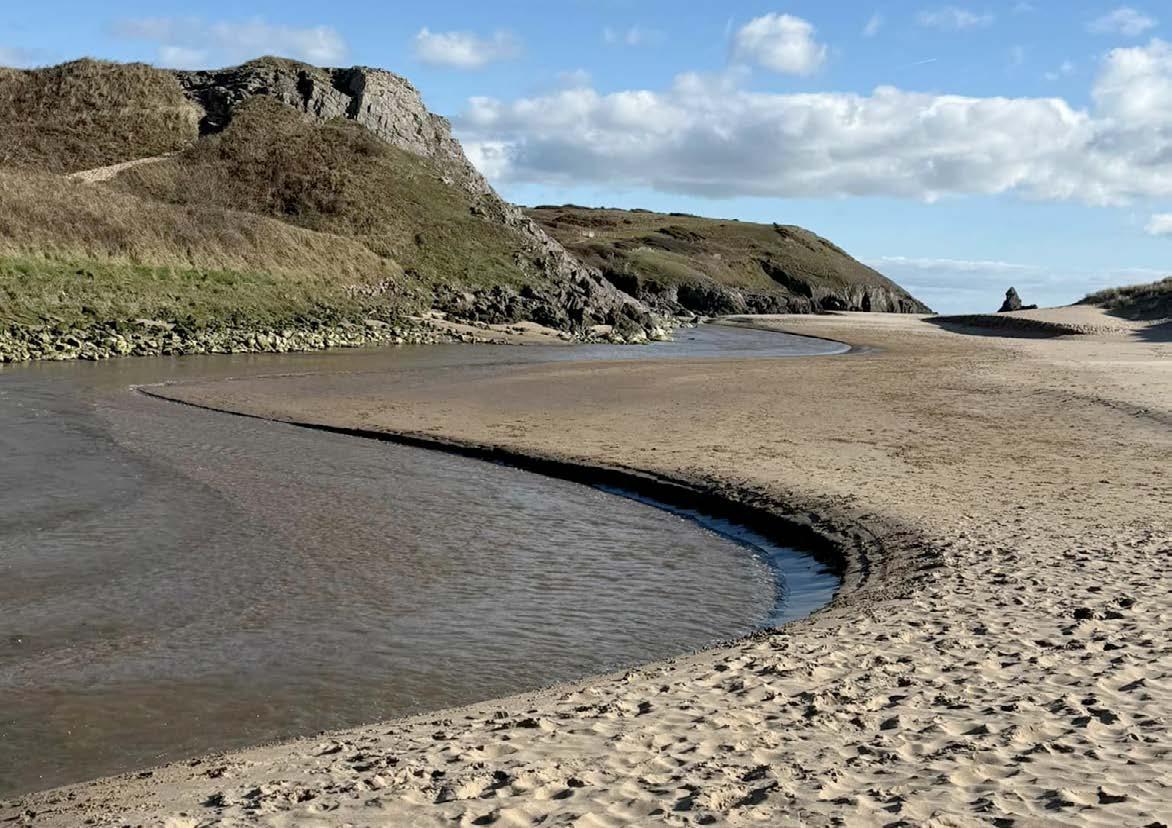
DEAR Minister, The concerns of the agricultural sector have been highlighted over recent weeks and months.
On February 8th, there was a large, peaceful meeting of over 3,000 farmers and businesses reliant on the agriculture sector at Carmarthen Livestock Market. A mandate was issued at that meeting to urgently lobby Welsh Government, which was done directly by representative organisations and campaign groups. They are specifically concerned about the Welsh Government’s policies and operations regarding Bovine TB, the Water Resources (Control of Agricultural Pollution) (Wales)commonly referred to as NVZ regulations - and the proposed Sustainable
Farming Scheme currently under consultation. We acknowledge the joint ministerial statement issued on February 27th in relation to these key issues.
We are acutely aware of the cumulative impact of these policy changes and proposals, introduced in quick succession. The impact is significant and worrying for individual farming businesses, the whole sector in the county, the wider rural economy, and the Welsh Food and Drink sector.
On March 1st 2023
Carmarthenshire County Council called on the Welsh Government to take a holistic approach to eradicating Bovine TB and to make improvements to procedures and systems when dealing with infection cases. But progress is disappointing. We ask again that you consider the Council motion in its entirety and swiftly implement its recommendations.
We cannot overemphasize the urgency of revamping the Welsh Government’s approach to eradicating TB, basing
all measures on scientific methods, and committing to dealing with the disease across all vectors. Current on-farm slaughter regulations of TB reactor cattle are unacceptable and unreasonable, causing repeated trauma to farming families.
Planning authorities across Wales are dealing with complex issues in relation to infrastructure required for compliance with the NVZ regulations. In many cases, as landlords of holdings, authorities will also, potentially, face difficulties in contributing to achieving compliance as per their responsibility. We reiterate concerns in relation to the provision of Welsh Government support to ensure compliance. We therefore urge you to bring forward the statutory review and suggest that you duly consider resorting to a targeted approach in order to maximise the impact of financial investments and to ease unnecessary pressures on businesses and authorities.
It is clear that the
farming community feel that the content of the final consultation round of the Sustainable Farming Scheme is the final straw which has resulted in the current protests by the agricultural sector and wider rural communities. After seven years of consultation, it’s unacceptable that interested parties have been asked to participate in a final consultation process on a scheme that is lacking in essential details about financial value and operational requirements. On that basis, this is a flawed consultation.
In a county that is 60% rural, we face a very bleak future according to the Welsh Government’s own impact assessment. Should there be 100% take up of the scheme - a target that you have previously indicated as your aim - there would be a likely loss of up to 5,500 jobs directly from the agricultural sector across Wales, a reduction of almost £200 million in farm incomes, and a reduction of 122,000 livestock
units. In addition, the consequential impact on associated industries and the wider rural economy remains unmodelled.
It is alarming when longstanding major employers within our county are worried about the critical mass of livestock units available to them in the event of the implementation of current SFS proposals. Protecting sustainable employment in rural Carmarthenshire is our priority in ensuring vibrant and thriving rural communities which are crucial to maintain Welsh culture, heritage and language. Furthermore, ensuring the secure supply of local, sustainably produced food is a fundamental priority. Studies undertaken by NFU Cymru suggest that for every £1.00 invested in support for the Welsh agricultural sector delivers a £9.00 return for the local economy, any future support scheme should be truly universal, provide long- term stability, be seen as a real incentive that goes beyond costs incurred and income
Friday March
forgone, and does not damage business viability and asset value. Placing primary producers from Carmarthenshire and Wales at a disadvantage compared with the rest of the UK nations is not acceptable.
Although the ministerial statement contains a commitment to carry out an updated economic assessment of the finalised scheme, unless significant changes are made, the likely impact will remain largely unchanged. We must stress the importance of considering the wider socio-economic impact of any proposed scheme and ensure alignment with the aims of the Wellbeing of Future Generations legislation.
We respectfully urge you to pause the rollout of the scheme and to reflect on representations made. We also urge you to take on board the suggestions of regular engagement with stakeholders postconsultation, and to establish a scientific panel to consider a combined and flexible approach to achieving the environmental and productivity aspirations described in the consultation narrative.
As members of Plaid Cymru group leading Carmarthenshire County Council, which declared both a climate and nature emergency to mitigate climate change, we strongly
For up to date news please check our
believe that agricultural and environmental sustainability should not be in conflict. It’s essential that Welsh Government must have the agricultural sector and associated businesses on board to ensure a productive, profitable, and environmentally conducive farming industry in the final scheme. We note that farming sector unions are united in their view that Wales can and should claim its place as a globally recognised producer of climate-friendly food within an environment and landscape that nurtures thriving habitats for nature.
The current strained relationship between the agricultural sector, the wider rural community and the Welsh Government is not conducive to any collaborative approach to achieving objectives or ensuring long-term stability. As we approach the end of the consultation period, tensions have escalated. Inflammatory and irresponsible remarks by the outgoing First Minister and other Labour members have aggravated the situation. Publicly questioning the need to provide support for the farming sector and making misleading comments about the nature of the engagement with stakeholders simply augment frustrations. As a group of councillors in a predominantly rural
council, we find this approach both unhelpful and damaging. There needs to be an urgent reset of the relationship between the Welsh Government and rural communities in order to ensure that Wales can in the future produce the food that we all need, and also tackle the very clear climate and nature emergencies that we face.
Yours sincerely, Councillor
Darren Price leader of Council Ann Davies Cabinet member for Rural affairs and Planning policy
DEAR SIR,
A group of neighbours in north Pembrokeshire have raised funds to rescue families with young children in Gaza, getting them to safe homes where their recovery can start.
The group, all parents, feel for the children facing such traumatic circumstances without homes, adequate food or potable water, and under constant fear from bombs and guns. “We see our
children;s faces in theirs” said one mother.
“It’s the least we can do.My father fled the previous holocaust, and back then a few brave individuals rescued Jewish children through the Kinder transport, so I feel it is our turn to return the favour.”
Lara explained how we met the families: “Some of us met a member of the first families through Amnesty five years ago. I was the teacher for our third family 20 years ago and we have stayed in touch ever since. The little girl who sat on my knee back then is now a wounded reporter. Currently we are half way to getting this family out. Our remaining target is £7000.”
Once we have the money they get on the evacuation list and wait their turn. Two mother with young children are recovering in a brother’s house in Egypt. One of the Dads made it out too but the other is a doctor and cannot leave while he is so desperately needed. His family are so torn as they want him to stay alive.
The group is hoping to raise enough for him to escape if conditions mean he can no longer work
The group has roots in Croeso Teifi, one of
the charities set up in response to the Syrian crisis and the possibility of Community Sponsorship in the UK. The community managed scheme turns out to be the best way to integrate people who have lost everything, setting them on their feet to earning and contributing to their new country.
Learning from Canada it was pioneered in Wales in 2017-2918, a Ceredigion council officer was chosen to teach European counterparts how to work with community groups to deliver it. The children go to Welsh medium schools here, becoming trilingual at a young age.
Despite the millions at immediate risk, the heart of UK government is still n ot open to helping Palestinians, so the group set up to do show the local will to fill the gap.
“One of my aunts was a midwife and saved babies in her bike basket in the last holocaust while several or us are of Jewish origin and know from family how much it means to save some lives. When we video call with those we have helped we feel the importance of this work far beyond the few we can save. A young mother said on one of these calls: “I want to say
something, most of the Gazans were educated, highly educated and we were trying to build a beautiful place, we were trying to raise our educated and peaceful children, we are not supporting any kind of violence to any people around the world, the world need to understand that.
We had restaurants, we had schools, we had universities, we had everything. Everything has gone. Gaza has nothing now, nothing.
I don’t sleep well, I don’t eat well but I do appreciate your efforts, you are mothers, you are working women, and you have the same that I have, you have the same determination that if I was in your place and you were in my place, I’d do the same, because this is democracy, this is humanity, this is women.
You did many things for us, I will not forget that and I will tell the story to my son when he grow up, I will tell him everything, your names, name by name, your stories, your concerns and your efforts.
To help or join the group, we are Cwtch Pals on facebook, or email getfamiliesout@gmail. com
Vicky Moller

CARAVANS

CAR PARTS

CARPENTRY

CAMERAS & PHoToGRAPHY

CLEARANCES

ELECTRICAL

FENCING, DRIvEWAYS AND LANDSCAPING

FABRICATION

GARDENING AND LANDSCAPING


HAIRDRESSING

HANDYMAN

OVEN CLEANING


RECLAIMED BUILDING MATERIAL

RUBBISH AND WASTE REMOVAL

PROFESSIONAL CAR WASH

PoDIATRY

SCRAP METAL

SHUTTERS & BLINDS

STORAGE TANkS

SOUND LIGHT AND STAGE

TECHNoLoGY AND CoMPUTERS

TRAILERS


WINDOWS



01834 482022











IT was once again a weekend where the majority of the county’s scheduled football fell foul to waterlogged and unplayable pitches.
A frustrating time for players, club members and referees alike as the last month to six weeks has been very wet and we’ve had a huge number of games called off.
In the first division Clarbeston Road continued their dominance over Hakin United as we reported in
our feature game. Two other games were played in the top division Tenby made it three wins in a row when they beat Fishguard 4-2 at the Clicketts. Adam Muskett scored twice, both assisted by the man of the match Jerome Mansbridge who then scored twice to cap off a stand out performance. The result lifts the Seasiders into fifth place, while Fishguard look all but relegated as they sit rock bottom on just four points.
Tenby’s local rivals Kilgetty boosted their league position with an important win over Pennar Robins at Bush Camp. Robins missed a great opportunity to go one up when they were awarded a penalty but Edmundson failed to hit the target from the spot. Josh Bevans goal was enough to secure the three points for the visitors who now only sit two points behind Pennar with four games in hand over them.

ON Sunday, March 3, 2024, the Pembrokeshire Vikings clashed with the Port Talbot Panthers in a hastily arranged fixture, prompted by the cancellation of their original matches due to waterlogged pitches. Both teams converged at Milford Haven RFC after the Panthers navigated down the M4.
Over the past few years, a compelling rivalry has flourished between these two teams, and this encounter lived up to the expectations. The game was a hard-fought, closely contested affair, with the lead oscillating between the sides multiple times. Unfortunately, on the 60th minute, a serious injury to a Panthers player brought an abrupt halt to the match. At that tense juncture,
the Panthers were leading 17-14, leaving the outcome hanging in the balance. Yet, the paramount concern was the well-being of the injured player, who, after an evening spent in the back of the ambulance, received a clean bill of health and was sent home to recuperate.
Throughout the match, John-Joe Mcdonagh showcased his typical liveliness on the pitch, while Rhys Morris celebrated his inaugural try for the Vikings. The Couceiro brothers, Ben and Ashley, made notable contributions upon entering the game, with Ben scoring a try in the touch game. The Price brothers, Josh and Ross, also made their mark during their time on the field. The game exemplified the true spirit
of Mixed Ability, and post-match, everyone relished a well-deserved beer in the clubhouse.
Try scorers for
Pembrokeshire
Vikings included Rhys Morris, Rob Sweeny, and Callum Power (converted). For the

SEREN THORNE, a young talent from Letterston, has been making waves in the world of 10m air rifle precision shooting.
A former student of Ysgol Casblaidd, Ysgol Bro Gwaun, and the sixth form at Haverfordwest’s VC High School, Seren is currently furthering her education in music at Cardiff University. However, it is her achievements in shooting sports that are capturing the nation’s attention.
Seren’s journey in shooting began at the
tender age of 8, initially with the pistol as part of her participation in the Pony Club tetrathlon. Her transition to the air rifle in 2020 marked the beginning of an illustrious path in this discipline. Since then, Seren has not only embraced the sport but has excelled at it, demonstrating an exceptional level of precision and composure. Her hard work and dedication bore fruit in November when she clinched two gold medals at the Welsh Championships. At this
event, Seren not only topped the podium but also broke the Welsh and British junior women’s qualification record, setting a new benchmark for aspiring shooters.
However, Seren’s achievements did not stop at the national level. In February, she represented Great Britain at the Junior World Cup in Granada, Spain. There, she added to her medal tally by securing an individual silver medal and breaking the British junior women’s final record. Seren’s
success continued as she contributed to a mixed team bronze medal,
once again breaking the previous British junior record.

Division 1
Neyland v Hakin United
Division 2
Cosheston v Broad Haven
Narberth v Camrose
Division 3
Clarbeston Road II v Solva
Kilgetty II v Pennar Robins II
Lawrenny v St Florence
Letterston v Neyland II
Pendine v Pembroke Boro
Division 4
Camrose II v Angle
Carew III v Tenby II
Monkton Swifts III v Prendergast Villa
N Hedges & Saundersfoot vSt Ishmaels II
Newport Tigers v Milford Athletic
Division 5
Herbrandston II v Lawrenny II
Johnston II v mManorbier United
St Clears IIv Letterston II


WALES has made surprising selections for their clash against France this Sunday.
Notably, Joe Roberts and Owen Watkin have been unexpectedly named as starters, while Captain Dafydd Jenkins undergoes a positional shift from the second row to blindside flanker. Will Rowlands joins Adam Beard in the second row, completing the alterations to the forward pack.
Warren Gatland unveiled his lineup on Wednesday morning, introducing these changes in a bid to secure Wales’ first victory in the Six Nations 2024.
Ryan Elias takes the starting spot at hooker, with Elliot Dee poised to achieve his 50th cap
from the bench.
Adding to the unexpected lineup adjustments, Alex Mann, a consistent starter at number six in the previous three matches, finds himself on the bench. Mackenzie Martin, who made his debut against Ireland a week ago, is also included among the
replacements.
Gatland said: “There are a few changes to the team this week as there are some players that deserve an opportunity.
“It’ll be a tough, physical challenge from France on Sunday particularly up front. We know they will start hard and it’s about us
staying in the fight, having good line speed defensively and keeping our discipline. We’re looking for an 80 minute performance.
“We’re excited to be back at home for our last two matches and looking forward to getting out in front of a passionate Welsh crowd

this weekend.”
Squad
15. Cameron Winnett, 14. Josh Adams, 13. Joe Roberts, 12. Owen Watkin, 11. Rio Dyer, 10. Sam Costelow, 9. Tomos Williams; 1. Gareth Thomas, 2. Ryan Elias, 3. Keiron Assiratti, 4. Will Rowlands, 5. Adam Beard, 6. Dafydd Jenkins (capt) 7. Tommy Reffell, 8. Aaron Wainwright.
The replacements are:
16. Elliot Dee, 17. Corey Domachowski, 18. Dillon Lewis, 19. Alex Mann, 20. Mackenzie Martin, 21. Gareth Davies, 22. Ioan Lloyd, 23. Mason Grady.

ROB PAGE’S side will take on Finland in Cardiff for a place in the final, and if they make it through, they will be at home against either Poland or Estonia for a place at the Euros.
The ties will take place on 21st March as Cymru look to reach a third consecutive European Championship.
Cymru will host Finland in the Euro 2024 play-off semi-finals, with Poland or Estonia awaiting the winner.
Rob Page’s side will also be at home for the Path A play-off final should they make it through the one-legged tie on March 21 in Cardiff.
Cymru failed to qualify through the standard route, finishing third in their group after picking up just one point from their final two games against Armenia and Turkey.
But they have a second chance to make it to Germany via the play-offs, where they will
host the Finns in Cardiff before a potential final on March 26, 2024.
Cymru reached the 2022 World Cup via the play-offs, beating Scotland and Ukraine to qualify for the first time since 1958.
They are now bidding to reach their third European Championship in a row after making the last 16 at Euro 2020 and going on a stunning run to the semi-finals of Euro 2016.
CYMRU captain
Aaron Ramsey is set to miss the Euro 2024 play-off against Finland, as revealed by Cardiff manager Erol Bulut.
Ramsey, who recently made two substitute appearances after a fivemonth hiatus due to a knee injury, reported a calf problem last week. A scan confirmed a tendon issue, sidelining him until the end of March.
The play-off semi-final between Cymru and Finland is scheduled for March 21 in Cardiff, with the winners facing

Poland or Estonia in Cardiff five days later for a spot in Euro 2024.
Bulut expressed disappointment, stating,
“The last time we spoke about Ramsey, I got a report that it was a strain. But yesterday (Monday), I hear it was
a strain on the tendon. He will be available at the end of March. This is also disappointing for us, and I will support him in every way I can. It’s not easy to be out for five months. He will be sidelined for four to six weeks.”
CYMRU defender Tom Lockyer has urged people to learn CPR with the British Heart Foundation (BHF) after suffering a cardiac arrest during a match.
The 29-year-old collapsed during a game for Luton Town against Bournemouth on 16 December last year, with bystanders and club medics rushing to perform CPR and provide early defibrillation.
The Cymru international said it was thanks to these quick actions that his life was saved and is now backing the BHF’s campaign to get the nation to learn CPR this Heart Month, as well as raise funds for lifesaving research.
Around 2,800 people suffer an outof-hospital cardiac arrest each year in Wales. Tragically, just one in twenty people survive, often because those around them don’t have the confidence to perform CPR or use a defibrillator.
Tom, who has just become a dad for the first time, said if everyone affected by his story learned CPR then more people would have a better chance of survival. The BHF estimates that as many as 800,000 adults in Wales have never learned these lifesaving skills.
“I’m an example of the power of CPR, and how it can save lives. I’m so grateful to the people who saved my life, and that I can have special moments with my family like our baby coming very soon,” he said.
“On that day in December, I remember jogging up to the halfway line and becoming lightheaded. I then woke up from a nothingness on the floor and I couldn’t move, I couldn’t speak. Eventually I was able to move and speak. Without the people who reacted quickly by performing CPR and using a defibrillator, I wouldn’t be here today and waiting for my little girl to come into the world.”
Tom spent five days in hospital and had an implantable cardioverter defibrillator (ICD) device fitted.
“I have so much to be thankful for. I have my health which is the main thing and I’m really looking forward to the future. If there’s a chance I could be back playing then I would love to,” he added.
Lockyer urged people across the UK to learn CPR to help save a life in

the ultimate medical emergency.
“This Heart Month, I’m calling on everyone to learn CPR with the BHF’s RevivR training tool,” he said.
“It takes just 15 minutes and you could learn how to potentially save a life. With at least five people in the UK suffering an out-of-hospital cardiac arrest every 90 minutes, learning lifesaving CPR can give you the confidence to step in during an emergency.”
The BHF’s free online training tool RevivR can teach CPR and how to use a defibrillator in just 15 minutes. Quick CPR and defibrillation can more the double the chances of survival in the ultimate medical emergency.
Last September the Cymru Men’s team players and staff spent time with the FAW’s Medical Tutors to learn lifesaving CPR (Cardiopulmonary Resuscitation) and defibrillator training.
FAW training courses on CPR and defibrillator training are supported by Save a Life Cymru (SaLC), the NHS Wales organisation to improve cardiac arrest survival.
Free training courses on CPR and defibrillator training have been offered to all clubs, leagues, and area associations in Wales. Club secretaries, coaches and first aiders have been contacted through the COMET system and are encouraged to take up the opportunity.
To refresh your skills or to get some basic awareness CPR and defibrillation training visit the Save a Life Cymru website.



